




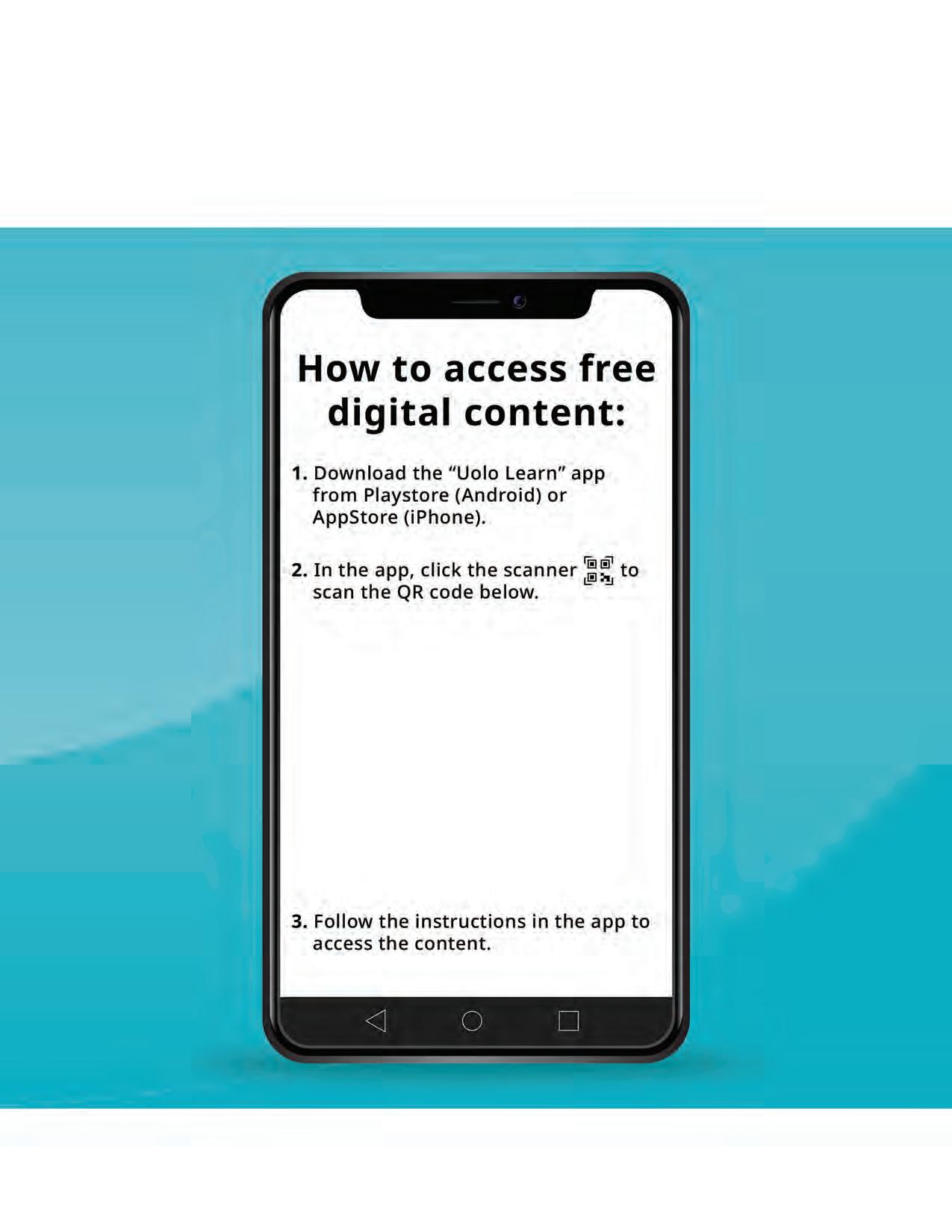
Get access to animated learning videos, interactive quizzes, projects and more — all on the Uolo Learn app!


Melanie Grobler is a seasoned education professional with experience spanning over three decades in the field of ELT curriculum development and assessment. She has worked in senior advisory positions in India for 10 years and has developed several K-8 ELT products. In South Africa, she served as national examiner for the Class 12 Exit Examination and worked as a teacher, college and university lecturer and subject advisor.

Chandani Goyal is an English Language Teaching (ELT) educator with over 9 years of experience in renowned schools like Heritage Xperiential Learning School, Ahlcon International School and Amity International School. She is also a published author of articles on classroom intervention and pedagogy. She brings a deep understanding of methodology and approaches to language learning into the compilation of this book, enhancing its effectiveness for educators and learners alike.
Academic Authors: Melanie Grobler, Kashika Parnami, Simran Singh, Arpit Agarwal, Simran Nagpal
Book Production: Rakesh Kumar Singh, Tauheed Danish
Project Lead: Chandani Goyal
VP, Learning: Abhishek Bhatnagar
All products and brand names used in this book are trademarks, registered trademarks or trade names of their respective owners.
© Uolo EdTech Private Limited First edition 2026
This book is sold subject to the condition that it shall not by way of trade or otherwise, be lent, resold, hired out, or otherwise circulated without the publisher’s prior written consent in any form of binding or cover other than that in which it is published and without a similar condition including this condition being imposed on the subsequent purchaser and without limiting the rights under copyright reserved above, no part of this publication may be reproduced, stored in or introduced into a retrieval system, or transmitted in any form or by any means, electronic, mechanical, photocopying, recording or otherwise, without the prior written permission of both the copyright owner and the above-mentioned publisher of this book.
Book Title: Ignite English Grammar Book 5
ISBN: 978-93-89057-27-0
Published by Uolo EdTech Private Limited
Corporate Office Address: 91Springboard, 3rd Floor
145, Sector 44, Gurugram, Haryana 122003
CIN: U74999DL2017PTC322986
Printed by: Printpro Solutions
Illustrations and images: www.shutterstock.com, www.stock.adobe.com and www.freepik.com
All suggested use of the internet should be under adult supervision.

In today’s connected world, the ability to use language effectively is more than just a skill—it is a key to meaningful communication, personal expression and academic and professional success. While vocabulary and comprehension form the foundation of language acquisition, it is grammar that gives structure to thought and clarity to expression. However, grammar is best understood—not by memorising rules—but by using it in real situations. When learners experience grammar in context, they are able to apply what they have learnt in their speaking and writing.
Ignite Grammar series is based on the National Education Policy (NEP) 2020 and the National Curriculum Framework (NCF) 2022–23. The programme reimagines how children engage with grammar. It shifts away from decontextualised drills and mechanical exercises to an approach that is contextualised, discovery-driven and embedded in real-life communication. Learners are encouraged to notice patterns in language, infer rules and apply them meaningfully across functional tasks.
This approach not only builds a natural understanding of language and communicative competence but also aligns with the NEP’s vision of nurturing 21st-century skills—critical thinking, creativity, collaboration and effective communication. By providing learners with contexts that are familiar, age-appropriate and socially relevant, Ignite Grammar series supports learners in becoming confident, expressive and skilled communicators.
In keeping with the NEP 2020 and NCF 2022–23, the programme integrates different dimensions of learning that enrich the learners’ overall growth—such as emotional well-being (SEL), cultural rootedness, artistic expression and awareness of Sustainable Development Goals (SDGs). These perspectives ensure that grammar is not learnt in a vacuum, but as part of a broader journey that prepares children to think ethically, collaborate meaningfully, appreciate their heritage and engage actively with the world around them.
Designed with the diverse classroom realities across India in mind, the programme is inclusive and easy to implement. Learners are supported with visual cues and scaffolded learning tasks to ensure that grammar instruction remains purposeful, engaging and accessible. The package comes with digital content, provided free of cost, to ensure a seamless and holistic learning experience for children.
Above all, this grammar series is grounded in the belief that language learning is a lived experience. Grammar is not a set of rules to be remembered—it is a way of making meaning, a toolkit for expressing ideas clearly and creatively.
We extend our warmest wishes to educators, parents and learners as they embark on this journey. May it be filled with enjoyment, exploration, expression and empowerment.
The National Education Policy (NEP) 2020, introduced by the Government of India, represents a transformative shift in the country’s education system. It focusses on building conceptual understanding, skills, values and competencies that align with the demands of the 21st century, while also preserving India’s rich cultural heritage. UOLO is committed to actualising the vision of NEP 2020 by meticulously adhering to its outlined recommendations.











1. Language skills building
2. 21st-century skills, values and dispositions
3. Creative and critical thinking
4. Application in real life

CompetencyBased Education
NEP Pages 12, 17, 22
5. Holistic and integrated learning
6. Learning by doing
7. Enjoyment and engagement
8. Collaboration and exploration
9. Technology–based solutions
10. Knowledge of India
11. Assessment of, as and for learning
Teaching and Learning Pedagogy
NEP Pages 3, 11, 12, 27
National Pride
NEP Pages 15, 16, 43
Assessments
NEP Pages 12, 18, 22

The National Education Policy (NEP) outlines essential skills, values, dispositions and learning approaches necessary for learners to thrive in the 21st century. Ignite Grammar series incorporates these elements throughout. Referred to as ‘NEP Tags’, they are defined as follows:
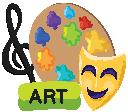

GAMES

INTEGRATED

BHARAT

Bringing creativity and fun into learning by combining music, drama and art with other subjects
Using physical activities, sports and games to make learning active and fun
Cross-curricular and skills linkages to make the learning experience more holistic, joyful and meaningful
Texts and tasks are rooted in the Indian context and culture to develop a sense of national pride

TEAMWORK

SDG
Embracing the spirit of mutual collaboration and cooperation while working together or engaging in a guided conversation
Unwavering commitment to generating awareness of a green, peaceful, prosperous, equitable and inclusive world

SEL
Developing the skills to understand and manage emotions, build positive relationships and make responsible choices HANDS-ON
Engaging actively in hands-on experiences to acquire knowledge and skills HOTS
Tasks encourage higher-order skills such as analysing, evaluating, problem-solving and fostering deep understanding

Learning Outcome Learners will be able to:
Self-Assessment
• identify how concrete and material nouns differ from common, proper, collective and abstract nouns.
• use common, proper, collective, abstract, concrete and material nouns in different contexts.
• form and use regular, irregular and zero plurals.
• use gender and possessive nouns ( ’s and s’ ) appropriately in context.
• distinguish demonstrative and reflexive pronouns from personal, possessive and interrogative pronouns.
• apply all types of pr onouns accurately in sentences.
• use the indefinite articles a and an and the definite article the appropriately in subject-related contexts.
• follow the ‘zero article’ rule for plurals and uncountable nouns.
• identify numer al, interrogative and compound adjectives and distinguish them from adjectives of quality, quantity, possessive and demonstrative adjectives.
• use adjectives to modify nouns and differentiate commonly confused adjectives (e.g., older/elder, further/farther).
• apply adjectives in the correct order in sentences.
• compare objects accurately using adjectives in subject-related contexts.
Review Test 1
• identify subjects, verbs and objects in sentences.
• distinguish between transitive and intransitive verbs and use them appropriately.
• use modals (must, can, could, may, might, should, will, would, shall) correctly.
• use modals in negative and question forms.
• identify adverbs of manner, frequency, place, degree and time and understand their functions in a sentence.
• use adverbs of manner, frequency, place, degree and time accurately in appropriate contexts.
• identify prepositions of time, place, movement, manner and possession accurately in different contexts.
• use types of prepositions accurately in sentences.
• identify and use differ ent conjunctions to join words, phrases and sentences, and apply commas correctly when joining complete sentences.
• use conjunctions such as because , although , since , when , while , if , where , that and so that to show time, reason, contrast, condition or purpose in sentences.
Review Test 2
• identify declarative, interrogative, imperative and exclamatory sentences and punctuate them correctly.
• distinguish between affirmative and negative sentences.
• distinguish between phrases and clauses as parts of a sentence.
• identify dependent and independent clauses and recognise that an independent clause can stand alone.
• use the simple present, past and future tenses correctly.
• form questions, question tags and negative sentences with contractions in the simple tenses.
• apply present, past and future continuous tenses accurately in context.
• form questions, question tags and negative sentences with contractions in the continuous tenses.
• use the present perfect tense accurately in context.
• for m questions, question tags and negative sentences in the present perfect tense.
S.No Chapter
1 Types of Nouns
2 Nouns: Number, Gender and Possession
3 Types of Pronouns
4 Articles
5 Types of Adjectives
6 Order and Degree of Adjectives
7 Verbs
8 Modals
9 Types of Adverbs
10 Types of Prepositions
11 Conjunctions
Kinds of Sentences
12
13 Phrases and Clauses
14 The Simple Tenses
15 The Continuous Tenses
16 The Present Perfect Tense
Review Test 3
• use the past perfect tense accurately in context.
• form questions, question tags and negative sentences in the past perfect tense.
• distinguish between active and passive voice.
• convert sentences between active and passive forms across tenses.
• report direct speech using present-tense reporting verbs.
• adjust pronouns correctly while maintaining verb agreement.
• report direct speech using past-tense reporting verbs.
• modify pr onouns, tense, modals and time/place references accurately.
• use full stops, commas, question marks, exclamation marks, inverted commas and apostrophes correctly in writing.
• use capital letters appr opriately at the beginning of sentences, for the pronoun I and for proper nouns such as days of the week, months of the year, book/film/programme titles, nationalities, languages, religions and titles.
Review Test 4
• identify collective nouns and use correctly in context.
• use abstract nouns correctly in context.
• identify basic functions of prefixes and suffixes to create new words.
• use common prefixes and suffixes correctly.
• identify the meanings of commonly used idioms through examples and context clues.
• use idioms correctly in sentences to express ideas creatively and naturally.
• distinguish between homophones and homographs.
• use homophones and homographs correctly in context.

17 The Past Perfect Tense
18 Active and Passive Voice
19 Reporting Speech Immediately
20 Reporting at a Later Time
21 Punctuation
Vocabulary 1: Collective and Abstract Nouns
Vocabulary 2: Prefixes and Suffixes
Vocabulary 3: Idioms
Vocabulary 4: Homophones and Homographs
Reading Comprehension–1
Reading Comprehension–2
Reading Comprehension–3
Reading Comprehension–4
• write a notice based on prompts, with key details like what, when, where and who.
• follow the proper format to write the notice.
• recognise the structure and language used in formal letters.
• write a formal letter using correct format, suitable vocabulary and polite tone.
• understand the format and tone of emails.
• write emails with clear purpose and flow.
• write a short essay with a clear introduction, body and conclusion based on a given topic.
• express ideas in a logical order using linking words and supporting details.
• identify the key elements of a persuasive speech –introduction, arguments and conclusion.
• write a persuasive speech using supporting reasons.
• develop a story based on a picture or prompt using characters, setting and dialogue.
• write a narrative with a clear beginning, middle and end, showing sequence of events.
• understand the purpose and voice of autobiographical writing.
• write a creative autobiography using first-person narration.
• identify the structure and language features of an article.
• write an article using relevant facts and opinions.
Writing 1: Notice Writing
Writing 2: Formal Letter
Writing 3: Writing an Email
Writing 4: Essay Writing
Writing 5: Persuasive Speech
Writing 6: Story Writing
Writing 7: Autobiography
Writing 8: Article
Answer Key



















Urmila is visiting a pottery studio in Madurai for the first time. She’s curious and wants to learn how pottery is made. Read the conversation.

Interjections are words that help us express emotions




Mrs Shrevalli: Welcome, Urmila! This is our studio in Madurai Would you like to see how the pottery wheel works?
It Works

Urmila: Yes, ma’am! I always wanted to know how clay becomes such beautiful pots and toys

For example: Hurray! I won the game. (happiness) Hey! Be careful. (attention grabber) Oh no! I lost my book. (sadness) Umm, I am not sure. (hesitation, uncertainty) Aha, I understand. (realisation)
Interjections are words that help us express emotions
Mrs Shrevalli: Great! The wheel of this machine spins very smoothly. As it turns, we shape the clay with our hands. It takes a lot of skill and patience

For example: Hurray! I won the game. (happiness) Hey! Be careful. (attention grabber) Oh no! I lost my book. (sadness) Umm, I am not sure. (hesitation, uncertainty) Aha, I understand. (realisation)
Interjections are often followed by an exclamation mark They can also be followed by a comma (,) or a question based on the emotion being expressed.
Urmila: Wow! It looks so interesting. Do you teach many students here?

Mrs Shrevalli: Yes, our instructor guides a whole team of young learners. We even make animal toys like elephants and birds out of clay! Each piece shows love and creativity
Get Set: A short and engaging warm-up to spark observation and set the context for learning
Interjections are often followed by an exclamation mark (!) They can also be followed by a comma (,) or a question mark (?) based on the emotion being expressed.
Urmila is visiting a pottery studio in Madurai for the first time. She’s curious and wants to learn how pottery is made. Read the conversation.
Mrs Shrevalli: Welcome, Urmila! This is our studio in Madurai Would you like to see how the pottery wheel works?
Think about and discuss these questions.
Urmila: Yes, ma’am! I always wanted to know how clay becomes such beautiful pots and toys
Urmila is visiting a pottery studio in Madurai for the first time. She’s curious and wants to learn how pottery is made. Read the conversation.
Mrs Shrevalli: Welcome, Urmila! This is our studio in Madurai Would you like to see how the pottery wheel works?
Urmila: Yes, ma’am! I always wanted to know how clay becomes such beautiful pots and toys
Mrs Shrevalli: Great! The wheel of this machine spins very smoothly. As it turns, we shape the clay with our hands. It takes a lot of skill and patience
Urmila: I can’t wait to try it myself. Thank you for showing me!
For example: Hmm, I think the answer is 45. (thinking) Really? You made it! (disbelief) Wow, that’s interesting.
1. List two words that name any common thing and two words that name something special.
Mrs Shrevalli: Great! The wheel of this machine spins very smoothly. As it turns, we shape the clay with our hands. It takes a lot of skill and patience
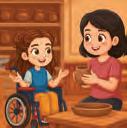
Urmila: Wow! It looks so interesting. Do you teach many students here?
2. Give two words that can be felt but not seen.
How It Works: Concept explanation through relatable examples and visuals that show grammar in use
For example: Hmm, I think the answer is 45. (thinking) Really? You made it! (disbelief) Wow, that’s interesting.
Let us look at some common interjections and the emotions Interjection
Discussion Questions: Guided prompts to help learners reflect, observe and prepare for concept discovery

A noun is a name of a person, place, animal or thing.
3. Some highlighted words in the passage are things that can either be heard, seen, touched, tasted or smelt. Find and underline them in the passage. Remember!

Urmila: Wow! It looks so interesting. Do you teach many students here?
Mrs Shrevalli: Yes, our instructor guides a whole team of young learners. We even make animal toys like elephants and birds out of clay! Each piece shows love and creativity
Interjections are words that help us express emotions

Urmila: I can’t wait to try it myself. Thank you for showing me!
Mrs Shrevalli: Yes, our instructor guides a whole team of young learners. We even make animal toys like elephants and birds out of clay! Each piece shows love and creativity
Urmila: I can’t wait to try it myself. Thank you for showing me!
Think about and discuss these questions.
1. List two words that name any common thing and two words that name something special.
Think about and discuss these questions.
Fun with Grammar: Interactive activity/game that enables learners to explore grammar through hands-on play and real-time collaboration
1. List two words that name any common thing and two words that name something special.
For example: Hurray! I won the game. (happiness) Hey! Be careful. (attention grabber) Oh no! I lost my book. (sadness) Umm, I am not sure. (hesitation, uncertainty) Aha, I understand. (realisation)
3 Chapter 1 • Types of Nouns
2. Give two words that can be felt but not seen.

Let us look at some common interjections and the emotions they express. Interjection Emotion Expressed Hurray! Wow! Bravo! Yay! Great! joy/happiness Aha! Oh! realisation Ouch! Ow! pain Oh! What! Whoa! surprise/shock Yuck! Eww! Ugh! disgust/dislike Alas! Oh no! Oops! sadness/regret Hey! Look! Listen! urgency/attention grabber Hmm, Err, Mmm thought/hesitation What? Eh? Huh? Really? confusion/uncertainty Phew! Ah!
Remember! When an interjection stands alone and has an exclamation
Hurray! Wow! Bravo! Yay! Great! Aha! Oh! Ouch! Ow! Oh! What! Whoa! Yuck! Eww! Ugh! Alas! Oh no! Oops! Hey! Look! Listen! Hmm, Err, Mmm What? Eh? Huh? Really? Phew! Ah!
Fun with Grammar
A noun is a name of a person, place, animal or thing.
Interjections are often followed by an They can also be followed by a based on the emotion being expressed.
Interjection Charades

1. Divide the class into two teams (A and B).


3. Some highlighted words in the passage are things that can either be heard, seen, touched, tasted or smelt. Find and underline them in the passage.




2. Prepare chits with interjections: Wow! Ouch! Yuck! Oh no! Hurray! Hey! Alas! etc.

2. Give two words that can be felt but not seen.

NEP Tags: To showcase alignment with NEP skills and values
A noun is a name of a person, place, animal or thing.
Chapter 1 • Types of Nouns
3. Some highlighted words in the passage are things that can either be heard, seen, touched, tasted or smelt. Find and underline them in the passage.


Time



Use It for Real

For example: Hmm, I think the answer is 45. (thinking) Really? You made it! (disbelief) Wow, that’s interesting. Let us look at some common interjections and the emotions they express.
1. Divide the class into two teams (A and B).
Chapter 12 • Interjections
Interjection
2. Prepare chits with interjections: Wow! Ouch! Yuck! Oh no! Hurray! Hey! Alas! etc.


Hurray! Wow! Bravo! Yay! Great! joy/happiness realisation

Chapter 12 • Interjections
Ouch! Ow! pain
Oh! What! Whoa! surprise/shock


Let’s meet at 4 o’clock. at I will meet you on Monday. on The sun rises in the morning. in
Yuck! Eww! Ugh! disgust/dislike
Alas! Oh no! Oops! sadness/regret


QR Code: Interactive quizzes for learners to practise
Hey! Look! Listen! urgency/attention grabber
Use It for Real: Practice tasks rooted in real-life contexts to help learners apply grammar meaningfully across situations that you can count. One has been done for you. ribbons oil shoes water pens bags your picnic basket. Draw two countable foods and two you can pack. Also, write their names. Countable Uncountable

1. Match the following. One has been done for you.
Fun with Grammar

Hmm, Err, Mmm thought/hesitation What? Eh? Huh? Really? confusion/uncertainty
Let’s meet at 4 o’clock. at I will meet you on Monday. The sun morning.

(a) We can • • help our teacher.


Let’s meet at 4 o’clock. at I will meet you on Monday. on The sun rises in the morning. in
Interjection Charades
1. Divide the class into two teams (A and B).
(b) We can’t
(c) We should
• push our friends.
Error Alert!
atUse at for the exact time. I go to school at 8 o’clock.

2. Prepare chits with interjections: Wow! Ouch! Yuck! Oh no! Hurray! Hey! Alas! etc.
lift heavy boxes.
atUse at for the exact time I go to school at 8 o’clock. on Use on for the day or date. My birthday is on 2 July.


atUse at for the exact time I go to school at 8 on Use on for the day or date. My birthday is on

on Use on for the day or date. My birthday is on 2 July.
Error Alert! Highlights common learner mistakes to reinforce accurate grammar usage Remember! Gives learners key takeaways and important rules to keep in mind for quick recall
(d) We shouldn’t • • all swim well.
Error Alert!
2. Fill in the blanks with can or can’t.
inUse in for a broad time in a day.We play in the evening.
(a) Most birds fly.
Error Alert!
(b) Birds swim underwater like fish.
(c) Ostriches run very fast.
We use in with morning, afternoon, and evening but NOT with night.
For example: I go to school in the morning.

inUse in for a broad time in a day.We play in the evening.
(d) Penguins fly like other birds.
(e) Parrots talk and copy sounds.
We play in the afternoon.
Fun with Grammar Time
We use in with morning, afternoon, and evening but NOT with night. For example: I go to school in the morning. We play in the afternoon. We rest in the evening. We sleep at night.
3. Fill in the blanks with should or shouldn’t.
Remember!
inUse in for a broad time in a day.We play in the evening.
Some position words can be used to show both place and time like at …at school …at 3:30
Some position words can be used to show both place and time like at …at school …at 3:30
Think and Tell: Thinking prompts and questions for teachers to assess learners’ attention and understanding of concepts
We rest in the evening.
We sleep at night.
We use in with morning, afternoon, and evening but NOT with night. For example: I go to school in the morning. We play in the afternoon. We rest in the evening. We sleep at night.
(a) We throw plastic bottles in the ocean.
(b) We clean up garbage on the beach.
Think and Tell Remember!
(c) People use less plastic.
(d) We leave food wrappers behind.

Think and Tell
Look around you. What is in front of you?
Look around you. What is in front of you?

(e) We tell others to keep the ocean clean.



Think and Tell Remember!
Some position used to show time like at …at school …at
Look around you. front of you?






1. Use the different kinds of nouns from the box to complete the paragraph. There are concrete, material, collective and abstract nouns. glass family gold courage swarm classroom schoolbag bunch

Zoya woke up early on the day of the big test. Her (a) was already in the kitchen and they wished her well. She packed her books and stationery neatly in her (b) and waved goodbye. When she reached school, the (c) was buzzing with noise. Outside the window, a (d) of bees flew past. Zoya sat down and placed her bottle of water – made of (e) – on the table. Their teacher walked in with a smile and a (f) of fresh flowers. ‘Good luck!’ she said, placing the flowers on her desk where everyone could see them. Zoya took a deep breath. She knew she was well prepared, and now she just needed the (g) to do her best. She picked up her lucky pen with a tip made of pure (h) and started writing.
2. Fill in the blanks with the correct pronouns.
When the teacher told the class to stop, Zoya put her pen down and sighed with relief. (a) had finally finished the long exam.
Kabir leaned over and whispered, ‘How was it?’ (b) looked a bit stressed.
‘It was okay,’ said Zoya. ‘The essay part was tricky. Look at this pen of (c) . I believe it brings me luck.’
Just then, Aarav pointed to some pencils on the floor. ‘Hey! (d) are those pencils?’
‘Not (e) ,’ said Kabir and Rohan together, shaking their heads. Their teacher entered with a colourful box. ‘(f) is a box full of surprises,’ she said showing the box to everyone.
3. Tick ( ) the correct verb forms.
(a) The students (was / were) eager to see what was inside the box.
(b) Zoya (opens / opened) the lid slowly while everyone leaned forward.
(c) Inside were colourful envelopes. ‘Each team (gets / get) one question,’ the teacher explained.
(d) Kabir and Riya (reads / read) their card and started whispering.
(e) Aarav (knew / knows) the answer but waited patiently for his turn.
4. Fill in the blanks with the correct prepositions.
(a) The timer started. Each team had to put their card the answer box.
(b) Zoya rushed her table and picked up the envelope.
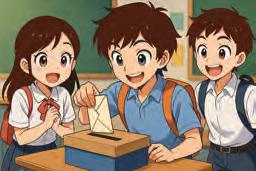
(c) Kabir was already waiting the answer box with a smile.
(d) Zoya wanted to draw a heart the answer card, but Kabir said, ‘Quick! We must submit the others do.’
5. Complete the story by adding a short body and a concluding paragraph. Add some scary, surprising or funny details.
Zoya was at a school camp in a big forest. One evening, she heard a strange whispering sound. She took her torch and stepped out of her tent. She again heard the whisper from behind some trees, but when she looked around, she saw no one. She walked towards the trees to investigate.
Write about what Zoya saw, what happened, what she found and how she felt. End your story in an interesting way.









Urmila is visiting a pottery studio in Madurai for the first time. She’s curious and wants to learn how pottery is made. Read the conversation.
Mrs Shrevalli: Welcome, Urmila! This is our studio in Madurai. Would you like to see how the pottery wheel works?
Urmila: Yes, ma’am! I always wanted to know how clay becomes such beautiful pots and toys
Mrs Shrevalli: Great! The wheel of this machine spins very smoothly. As it turns, we shape the clay with our hands. It takes a lot of skill and patience.
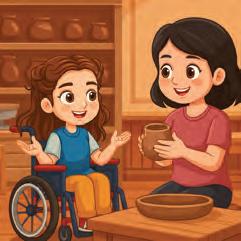
Urmila: Wow! It looks so interesting. Do you teach many students here?
Mrs Shrevalli: Yes, our instructor guides a whole team of young learners. We even make animal toys like elephants and birds out of clay! Each piece shows love and creativity.
Urmila: I can’t wait to try it myself. Thank you for showing me!
Think about and discuss these questions.
1. List two words that name any common thing and two words that name something special.
2. Give one word that can be felt but not seen.
Remember!
A noun is a name of a person, place, animal or thing.
3. Some highlighted words in the passage are things that can either be heard, seen, touched, tasted or smelt. Find and underline them in the passage.

There are many different types of nouns in the conversation between Urmila and Mrs Shrevalli. Let us look at how they are used.
Types of Nouns
Common Nouns
Proper Nouns
Definitions Examples
These are names of any person, place, animal or thing.
Do you teach many students here?
This studio had many colourful pots. We even make animal toys like elephants and birds.
These are special names of particular/specific people, places, animals or things. They always begin with a capital letter. Mrs Shrevalli spoke kindly to Urmila
The studio is in Madurai.
Collective Nouns
Abstract Nouns
Concrete Nouns
(These are also common and proper nouns.)
Material Nouns
(These are common nouns but cannot be counted.)
These are names of a group of people, animals or things considered as one.
These are names of feelings, ideas or qualities that we cannot see or touch.
They are usually used in the singular.
These are names of things we can see, hear, touch, taste or smell.
A team of students was learning pottery.
A set of painted pots was pretty.
Pottery requires a lot of skill and patience.
Each piece shows love and creativity.
These are names of materials or substances from which things are made.
They are usually raw materials or natural substances.
Note: Refer to page no. 117 for more collective and abstract nouns.
The wheel of the pottery machine spins so smoothly.
The pots were placed on the wooden table.
We make the animal toys out of clay. The pottery wheel was made of wood.



1. Players take turns to roll the dice and move forward from START.
2. When you land on a block...
• read the sentence aloud.
• say which word matches the given noun type.
• make a new sentence using the noun/s.
3. If you land on a Fun Box (Miss a Turn / Go Back 2 Spaces), follow the instruction.
4. Continue until someone reaches FINISH.
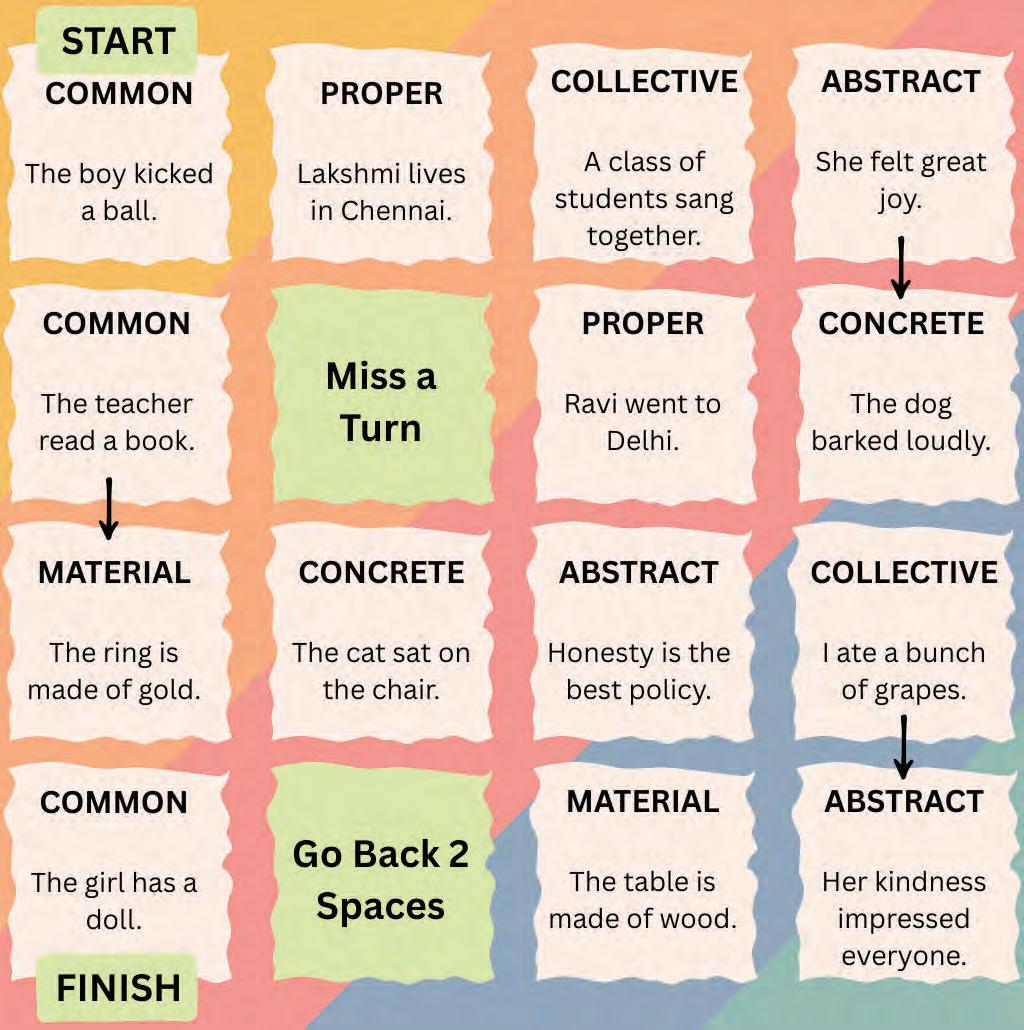

1. Rohan invited his friends to his new home. Everyone enjoyed the day. Fill in the blanks with the correct nouns from the box.
steel Agra group happiness shops cake
(a) The chairs in his new house were made of .
(material) (collective)
(b) The of guests brought many gifts for the housewarming.
(c) Rohan’s cousins came from to attend the housewarming.
(proper)

(d) Rohan and his parents felt great when the guests congratulated them.
(abstract)
(e) The family placed the on the table for everyone to enjoy.






(f) There were many in the market around Rohan’s new house.
(concrete) (common)
2. Read the sentences carefully. In each one, circle the abstract noun.
(a) The dancer showed discipline as she practised Bharatanatyam every day.
(b) The audience admired the grace of her movements during the performance.
(c) The students exercised patience while waiting for their turn to perform.
(d) Dancing in the temple gave the young girl confidence to face the crowd.
(e) Bharatanatyam is often performed as an offering of devotion to the gods.
(f) The sound of the veena filled the hall with joy during the recital.
3. Underline the correct collective noun in each sentence.
(a) A (team / crew / pride) of engineers installed solar panels on the school roof.
(b) A (group / class / herd) of workers carried the panels carefully.
(c) A (class / colony / players) of students visited the site to learn how solar energy works.





(d) The principal received a (stack / chain / swarm) of brochures for the students.
(e) A (series / group / crowd) of changes will make the school more eco-friendly.
(f) The engineers gave a (bundle / pack / set) of ideas to improve energy use.
4. Fill in the blanks with the correct nouns from the box. Delhi swarms poets nests tree beauty laughter flocks
Hello! I am a (a) . I stand in the great city of (b) . (c) of birds build their (d) in my branches.
Children often play in my shade and fill the air with their joyful (e) .
In spring, when I am covered with flowers, (f) write about my (g) and people gather around to enjoy the sight of me. (h) of insects gather nectar from my flowers adding to the joyful sounds of spring.
5. Write a passage or a story of 50−60 words using at least one noun from each type given in the box. Underline the nouns in your passage.
CommonProperCollectiveAbstractConcreteMaterial teacher sibling cousin garden river farmer
Taj Mahal National Park Nasik Kashmir bunch class group pride family set honesty joy courage fun patience grace love beauty chair ball boy girl lion river mountains gold wood water clay marble glass paper plastic silk









Read this short report about a school cricket match. A friendly cricket match was held at St Norbert School between the boys’ team and the girls’ team. It was the first-ever cricket game played between them. The boys’ team, wearing red jerseys, batted first. Rohan’s captaincy inspired the boys, and Ankit hit a six. However, the girls’ team bowled brilliantly. Aisha took three wickets, and Meera caught two balls. As a result, the boys managed to score only 50 runs

The girls came to bat next. Priya’s shots resulted in two fours, while Sana added two sixes. The batswomen played carefully, while the batsmen cheered from the boundary for the boys’ team. The girls won by 7 wickets. The students cheered, and the principal praised both teams for their positive spirit. The school’s playground was filled with laughter, and the children’s joy made the day memorable.
Think about and discuss these questions.
1. Find four singular nouns and four plural nouns in the passage.
2. How is possession shown in the passage? Give four examples.
3. How are the words boys and girls different from the words with an apostrophe, boys’ and girls’ ?
Remember!
Nouns can indicate number (singular or plural), gender (masculine, feminine, neuter) and possession (ownership).
4. Find examples of masculine and feminine nouns in the passage. Is the word principal masculine? Why?


We use plurals to show number – more than one person, animal, place or thing. Regular plurals take -s or -es.
For words ending in -s, -x, -ss, -ch, -sh, -z, -o, add -es
For words ending in a consonant + -y, change -y to -ies
watch – watches, hero – heroes, echo – echoes, mosquito – mosquitoes, dress – dresses, bus – buses, box – boxes, dish – dishes, six – sixes
Note: Some nouns ending in -o take only -s like in: video – videos, radio – radios, kilo – kilos, taco – tacos, memo – memos, piano – pianos, solo – solos, logo – logos
inventory – inventories, country – countries, army – armies
Note: If a vowel comes before -y, we add only -s like in: jersey – jerseys, holiday – holidays, alley – alleys
For words ending in -f or -fe, change to -ves. leaf – leaves, knife – knives, life – lives, wife – wives
Note: Some nouns ending in -f take only -s like in: belief – beliefs, roof – roofs, cliff – cliffs
Irregular plurals change completely. tooth – teeth foot – feet goose – geese ox – oxen woman – women oasis – oases cactus – cacti fungus – fungi mouse – mice person – people
Zero plurals keep the same form in both singular and plural.
aircraft – aircraft deer – deer species – species series – series spacecraft – spacecraft sheep – sheep
Error Alert!
Note: Countable nouns have both singular and plural forms: match – matches, game – games, wicket – wickets
Uncountable nouns usually don’t have a plural: water, electricity, furniture, equipment
Abstract nouns are mostly singular: advice, information, honesty, love, knowledge, justice
Nouns – Gender
I gave him advice. He wanted information. I gave him advices. He wanted informations. Advice and information are abstract nouns that do not have plurals.
Some nouns tell us whether a person, animal or thing is masculine (male) or feminine (female), common gender or neuter.
Masculine and Feminine (People)
Masculine and Feminine (Animals)
Common gender (Used for both male and female)
Neuter (Non-living or abstract things that have no gender)
sir – madambull – cow (whales, elephants, hippo) teacher monument
landlord – landladytiger – tigress student satellite
master – mistresspeacock – peahen passenger computer
emperor – empressgander – goose guest clock
widower – widowlion – lioness principal hospital
wizard – witchstag – doe leader alphabet
host – hostessdog – vixen (fox) player love
nephew – niececob – pen (swan) judge happiness
The possessive form of a noun shows ownership or relationship. We add an apostrophe (’) + s after the noun to show possession.
For singular nouns, add ’s: My friend’s opinion, The boy’s team (one boy)
For plural nouns ending in -s, add only ’ : My friends’ opinions, The boys’ team
For plural nouns not ending in -s, add ’s: The children’s joy, The men’s team

Noun Puzzle
Complete the crossword using the clues.

Across
1. Plural of cactus
2. Female fox
3. Plural of fungus
4. Feminine of stag
5. Carriers of dengue
6. Plural of wife
7. Feminine of nephew
8. Guidance or counsel of a friend (has no plural)
Down
9. Plural for a steep rock face
10. Plural of inventory
11. Feminine of host
12. What good teams have
13. Female swan



1. Write the plural form of the nouns. Apply the rules you learnt. One has been done for you.
(a) peach peaches (b) loss (c) window
(d) diary (e) half (f) key
(g) sheep (h) game (i) roof
(j) bench (k) valley (l) thief
2. Think about what you learnt about the gender of nouns and underline the odd one out. One has been done for you.
(a) daughter mare queen father
(b) princess bridge mountain desert
(c) mother tigress actress worker
(d) peahen priest madam wife
(e) hostess doctor employee driver
(f) neighbour relative vixen lawyer
(g) actor emperor teacher prince
3. Complete the sentences with the possessive nouns using the clues given.
(a) The (school) science fair was held in the auditorium.
(b) Many (students) projects were displayed on tables.
(c) The (girl) experiment on solar energy was very interesting.
(d) One of the (children) models showed the solar system.
(e) The (judges) opinion was that the two best entries should share the first place.
4. Fill in the blanks with the correct form of the words in brackets.
(a) Our (teacher) lesson today was about conserving water.
(b) Clean (water) is a necessity for life.
(c) We should drink at least eight (glass) of clean water every day.
(d) Rivers and (lake) are natural sources of fresh water.
(e) In many villages, people draw water from (well).
(f) Each (village) water supply depends on seasonal rainfall.
(g) Villagers often carry heavy (bucket) filled with water to their homes.

With each, every, either and neither, the noun is always singular.
(h) The (villager) buckets can be seen lined up in every kitchen.
5. Fill in the blanks with the correct form of the nouns in brackets.
Last month, our school took the (a) (student) to Delhi to see the famous Red Fort.
6. In your notebook, write a 50-word report on a visit to any museum, place of historical interest or national park. Use and underline at least THREE plurals, TWO possessive nouns and ONE or TWO gender nouns. Remember!


The fort was built by Shah Jahan, one of the most famous Mughal (b) (emperor). We saw the (c) (king) throne in the Diwan-i-Khas and listened to stories about (d) (India) history. The guide showed us the (e) (soldier) quarters where the Mughal army stayed. The next day at assembly, the (f) (principal) speech reminded us of the importance of freedom. She told us about the (g) (freedom fighter) sacrifices.









Read the conversation about the new bookshop.
Payal: Look, there’s a new bookshop.
Aman: Yes, I saw it this morning. It looks very interesting.
Mihir: Who owns the shop?
Payal: It belongs to Ananya’s uncle. The car outside is his.
Aman: That’s great! Then we must visit. What else does he sell?
Mihir: Someone told me they have books and stationery.

Payal: I want to buy myself a new sketchbook. I have finished mine.
Aman: And I need a geometry box. We can go after lunch. Who will go with me?
Payal: I will.
Mihir: Count me in too! That will be fun.
Think about and answer these questions.
1. Which words in the passage show belonging or possession? Give two examples.
2. Circle the pronouns used in the dialogue to talk about people or things instead of repeating names or nouns.
3. What is the difference between the pronouns I and me in the passage? How are they used differently in the sentences?

Pronouns are words that we use in the place of nouns to avoid repetition, making our writing shorter and clearer.
For example: Payal sees a new bookshop and Aman sees it too. Payal and Aman want to visit the bookshop.
Payal and Aman see a new bookshop. They want to visit it.
(Payal and Aman) (the bookshop)
Personal pronouns can replace the names of people, animals and things and can be used as the subject or the object of the sentence.
For example: Payal sees a new bookshop. She will visit it.
(Subject) (Object)
Subject Pronouns
The subject is the doer of the action and the object is the receiver of the action in a sentence. The object comes after the verb.
Object Pronouns
Singular Plural Singular Plural
First Person (the person speaking) I we me us
I/We saw the shop The shopkeeper gave me/us the book
Second Person (the person being spoken to) you you you you You may buy the book I bought the book for you
Third Person (the person/ thing being spoken about) he, she, it they him, her, it them He/She/They want to go to the shop. It is a big shop. I met him/her at the bookshop. Sheena gave it/them (the book/s) to her.
Possessive pronouns are used to show that something belongs to someone. They appear at the end of the sentence.
Person Possessive Pronouns
Examples
First Person mine, oursThe car outside is his. (Ananya’s uncle’s)
Second Person yours
Third Person his, hers, theirs
The sketchbook is mine. (Payal’s)
The books are theirs. (Payal’s and Aman’s)

These pronouns are used to ask questions. Who, what, which, whom, whose and which are interrogative pronouns.
For example: Who is your best friend? (Name) Which is your favourite colour? (Colour)
Demonstrative Pronouns
The answer to the questions should be a noun.
These pronouns point to the objects to which they refer. They stand alone as the subject of the sentence and do not appear immediately before a noun.
Demonstrative Pronouns
Singular this, that (Point to things near the speaker)
Plural these, those (Point to things far from the speaker)
Examples
That will be fun. (Stands in the place of the visit) This is his bike. (Stands in the place of the bike)
These are great. (Replaces the books) Those are interesting. (Replaces the books)
These books are mine. These are mine. (The books) These in the first sentence comes before the noun and describes the noun, so it is a demonstrative adjective. These in the second sentence is used instead of books, so it is a demonstrative pronoun.
Reflexive pronouns are used when the subject and the object of a sentence are the same person or thing. They reflect the action of the verb back to the subject.
Reflexive Pronouns
Examples
Singular myself, yourself, himself, herself, itselfI want to buy myself a new sketchbook. Plural ourselves, yourselves, themselvesThey got themselves some stationery.


1. Student 1 pretends to be a superhero and makes one or two sentences using the first-person pronouns (I/me).
Example: I put on a cape. It fits me. I look at the dragon. The dragon looks at me.
2. Student 2 repeats the sentences using second-person pronouns (you/you).
Example: You put on a cape. It fits you. You look at the dragon. The dragon looks at you.


3. Student 3 repeats the sentences using third-person pronouns (he/she/him/her). Example: She/He puts on the cape. The cape fits her/him. She/He looks at the dragon. The dragon looks at her/him.
4. Give another student a chance to give new sentences and repeat the game.

1. Read the sentences about Aniket’s visit to the shopping mall. Pick out the pronouns and, in your notebook, write them in the correct columns.
(a) They wanted to buy clothes and toys.
(b) The shirts they bought were theirs.
(c) Aniket said, ‘This is the shirt I like.’
(d) His mother told him to try it on.
(e) ‘Who will carry the shopping bags?’ asked Aniket’s father.
(f) Aniket carried the bags himself and felt proud.
(g) The shopkeeper gave us free chocolates.
(h) Aniket said, ‘That is my bag.’
(i) ‘Whose is the wallet on the counter?’ asked the shopkeeper.
(j) Aniket smiled and said, ‘I really enjoyed shopping today.’ No. PersonalInterrogativePossessiveDemonstrativeReflexive (a)
2. Fill in the blanks with the correct demonstrative pronouns.
(a) (This / These) is my favourite painting.
(b) (This / Those) are my paints.
(c) (That / Those) is Payal’s sketchbook.
(d) (This / These) is Aman’s drawing.
(e) (These / This) are his paintbrushes.


3. Complete the sentences with the most appropriate reflexive pronouns. himself themselves myself herself ourselves
(a) I always make sure I prepare for the coding challenge.
(b) Riya made a note to to save her work before logging out.
(c) Aarav taught how to type faster.
(d) We cleaned the computer lab by after the class.
(e) The students congratulated after completing the coding challenge.
4. Choose the correct pronouns and fill in the blanks.
Rohan and Priya played outside their home. (a) (They / He) saw some butterflies. ‘(b) (This / Those) are pretty,’ said Rohan, pointing to the butterflies. ‘(c) (That / This) is beautiful too,’ Priya replied pointing at a kite in the sky.
‘(d) (Whom / Whose) is that kite?’ Rohan asked. ‘It’s (e) (me / mine), ’ said a boy nearby. Priya tripped and fell on the dusty road. ‘Are (f) (you / they) okay?’ Rohan asked. ‘I’m fine. I just need to dust (g) (herself / myself) off,’ Priya said. (h) (We / They) saw a group of kids playing on a field. ‘Let’s join (i) (him / them), ’ Rohan suggested. ‘ We should introduce (j) (themselves / ourselves) first,’ said Priya.
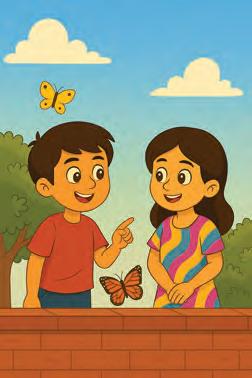


5. Fill in the blanks with the most appropriate pronouns.
Sachin Tendulkar – The Master Blaster
Sachin Tendulkar is one of India’s greatest cricketers. People admire (a) for his batting skills and easy-going nature. He began playing cricket at a very young age, and when Ramakant Achrekar saw him playing for the first time, he said, ‘(b) is talent.’ Sachin had to remind (c) every day to stay
disciplined. Whenever reporters asked (d) what motivated him, he replied, ‘The cheers of the fans and the spirit of the team give (e) strength.’
Even though he has retired from cricket, Sachin inspires children and reminds (f) to dream big. Today, millions of Indians say, ‘He played for us, and his victories will always be (g) .’
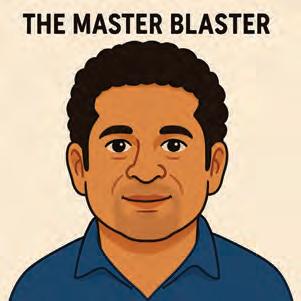
6. Write a short speech about your favourite celebrity. Use each kind of pronoun at least once in your paragraph.










Read the passage given below.
Do you use an instrument that looks similar to this in class?
An astrolabe was a special instrument used by sailors and travellers long ago. A person could use it to find the time and to know their place by looking at the sun, stars and the horizon. Sailors often used it on sea voyages to discover where they were. The astrolabe, designed by Greek astronomers, had a flat metal plate and a rotating arm, which worked like a star map. Unlike a clock or a compass, using the astrolabe needed skill and patience. Today, the astrolabe can be compared to a modern classroom tool – the protractor.
Think about and discuss these questions.
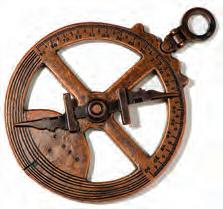
1. Why do we use an astrolabe at the beginning of the sentence and then refer to it as the astrolabe later?
2. Why do we say the sun?
3. Sailors often used it on sea voyages. Why is no a or an used before the word sailors?
4. Can you think of a reason why we do not use the before class in the first sentence but use the article a in a modern classroom tool ?

The articles a, an and the before nouns tell us whether we are talking about something general (a and an) or something specific (the).
There are two types of articles – indefinite and definite.
We use a or an when we talk about something in general and are introducing it for the first time.
• A is used before singular countable nouns that begin with a consonant sound.
For example: A star, a clock, a compass (Any one, not a specific one)
• An is used before singular countable nouns that begin with a vowel sound (a, e, i, o, u).
For example: An astrolabe (Any one astrolabe)
Definite Article – The
We use the when we talk about a specific person, place or thing.
• When something has already been mentioned and both the speaker and listener know it
For example: An astrolabe was used by sailors. The astrolabe could tell time.
• For unique nouns
For example: They could read the time by looking at the sun, stars and the horizon. (There is only one sun and one horizon, and the time is specific – not any time.)
Note: We do not use an article with words like class, hospital, prison and church unless we are referring to a specific place.
For example: I was late for class. He was in hospital. (general) but I went to the art class. My grandfather is in the community hospital
We use a protractor in the maths class. (A specific class)
• For names of rivers, oceans, deserts, mountain ranges, famous buildings, newspapers, trains and ships
For example: Many ships sail across the Indian Ocean every year. We read about the Titanic in the Times of India.
• With plurals when speaking about a specific set, a unique group
For example: The sailors, who used the astrolobe had, to be skilled and patient. (Not any sailors but those that used the astrolabe)
• Before the adjectives in the superlative degree and words like last, first and only
For example: Christopher Columbus is the most famous sailor. He was the only sailor who was not afraid during the storm.
Zero Article Rule
Sometimes, we don’t use any article.
• We usually do not use an article with the names of people, cities, countries or days. This is called the zero article.
For example: The astrolabe was designed by Greek astronomers. Tanmay lives in Dubai.

• With plural nouns (When speaking in general)
For example: Sailors often used it on sea voyages to discover where they were.
• With uncountable nouns and abstract nouns (things we cannot count)
For example: Water is important for life. Using an astrolabe required skill and patience. (Abstract nouns)

1. Imagine you are at the train station.
2. Write one sentence about what you saw. (Use a or an)
3. Then, write a sentence about what you did. (Use the)
4. Be creative and make your sentences fun!
5. Take turns to speak your sentences – stress the articles that you use.
For example:
I saw a man get off the Rajdhani Express. I ran down the platform to catch the train.








1. Circle the correct options.
(a) I am (a / an / the / –) keen skater, and I often go to (a / an / the / –) nearby park to practise.
(b) Skating is (a / an / the / –) fun activity, but it requires (a / an / the / –) skill.
(c) In the afternoon, (a / an / the / –) paths in the park are packed with (a / an / the / –) children on skates.
(d) Skating is (a / an / the / –) interesting sport, but (a / an / the / –) equipment is expensive.
(e) Luckily, I got my skates from (a / an / the / –) cousin who went to work in (a / an / the / –) Lucknow.

















2. Fill in the blanks with the correct articles and put a dash (–) where no article is needed.
Yesterday, I decided to donate (a) old clothes and (b) toys to a local charity that was collecting things for victims of the recent flood. My mother helped me pack (c) box carefully. I also included (d) groceries and (e) enormous tin of baby food.
When we reached (f) charity centre, we saw (g) many volunteers helping people. (h) centre looked very clean and welcoming. Later, we met (i) director of the centre. She thanked us and said, ‘(j) Kindness is what makes our drive a success.’

3. In your notebook, write sentences using the correct article with each word. Do not use any article where it is not needed.
(a) team (b) effort (c) captain (d) support (e) players
4. Write a letter to your cousin telling him/her about a competition you recently took part in at school. In your letter, be sure to mention:
• the name of the competition (drawing, speech, quiz, race, etc.),
• how you prepared for it,
• what happened during the event,
• what you learnt from taking part in the competition. While writing the letter, use a, an and the correctly.










Read the conversation below between Anita and Rohan.
Anita: Did you know there are eight planets in our Solar System?
Rohan: Really? Which planet is closest to the Sun?
Anita: That’s Mercury, and it has a rocky surface.
Rohan: Wow! How much scientific knowledge do we actually have about it?
Anita: Astronomers keep studying it with their powerful telescopes.
Rohan: I like that bright planet we can see in the evening sky – Venus!
Anita: Yes, and Jupiter is the largest planet with many moons.
Think about and discuss these questions.

1. There are eight planets in our Solar System – What does the word in red tell you about the planets?
2. What quality does the surface of Mercury have?
3. What kind of knowledge do astronomers have?
4. Which planet looks bright in the evening sky? Which word does Rohan use to point it out?
5. Which planet is the largest with many moons? What does ‘the largest planet’ mean?
6. Which planet? – Which part of speech comes after the question word Which?

Adjectives are words that describe nouns or pronouns. They tell us what kind of, how many, how much, what colour, etc. the nouns or pronouns are.
Adjectives usually appear before the nouns, but they can also come after the nouns. For example: Jupiter is the largest planet. These telescopes are powerful.
Type
Adjectives of Quality
Adjectives of Quantity
Possessive Adjectives
Demonstrative Adjectives
Adjectives of Number
Definitions
They tell us about the qualities or features of a noun or pronoun.
They tell us the shape, size, colour or special quality.
Ask: What kind of…?
They give us an idea of the quantity/ amount of a noun without giving an exact number.
These are words like more, many, several, few, some, enough and little.
Ask: How much…? How many…?
They show ownership or belonging and always come before the noun.
These are words like my, her, his, our, their, its, your, etc.
Ask: Whose…?
They point out which one(s) we are talking about. They help to identify specific nouns.
These are this, that, these and those.
Examples
Venus is a bright planet. Earth is a blue planet.
The astronomers have much information about space.
Rohan has several books about space.
Astronomers use their telescopes to study space.
Ask: Which one? This bright planet is Venus.
They tell us the exact number or order of nouns. They are more specific than adjectives of quantity and are only used with countable nouns.
These are words like one, two, three, first and second.
Ask: How many? Which one?
There are eight planets in the solar system.
Earth is the third planet in the solar system.

Type Definitions Examples
Interrogative Adjectives
They are used with nouns to ask questions. These are words like which, whose and what.
Note: Not all question words are interrogative adjectives. Words like where, when, how or why can modify verbs or the entire sentence, not nouns, and are thus not adjectives.
Which planet is closest to the Sun?
Whose telescope is it?
Compound Adjectives
These are made with two describing words that work together as one adjective.
A hyphen is often used between them –a well-known singer, a five-star hotel, a full-length movie.
Adjectives that are often confused:
1. Older vs Elder
Older → used for people or things in general
He is a well-known astronomer.
He uses a high-powered telescope.
Elder → used only for people in the same family
For example: My house is older than yours. My elder brother helps me with my homework
2. Farther vs Further
Farther → shows physical distance
Further → shows more, additional or deeper
For example: The park is farther than the school. I need further information about the project.
3. Fewer vs Less
Fewer → used with countable nouns
For example: There are fewer books on the shelf
Less → used with uncountable nouns
This bottle has less water than that one. today than yesterday.


Go to the front of the class. Say a tongue twister aloud. Then, ask the class to tell you the adjectives in each tongue twister.
1. Six slippery snails slid slowly southward.
2. Big brown bears bake bread.
3. She sells shiny, salty seashells by the seashore.
4. The friendly, fluffy fox found food in the forest.
5. Tiny timid tigers tiptoe through the tall trees.
6. Peter picked a peck of pretty peppers.
7. The brave, bright birds flew beyond the barn.
8. Cool, clever cats crawl carefully across cushions.



1. Underline the adjectives and circle the nouns they describe. Then, identify the type of adjective – Number, Interrogative, Compound, Quality, Quantity, Possessive or Demonstrative adjectives.
(a) The volunteers collected many bags of plastic from the forest trail.
(b) Our teacher asked, ‘Which group will clean near the river?’
(c) The children wore bright green caps to spread awareness.
(d) The workers brought their tools to cut the thorny bushes.
(e) The team used eco-friendly dustbins to collect trash.

2. Circle the correct adjective.
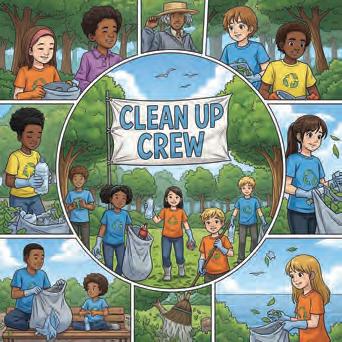

(a) ISRO is one of the (oldest / eldest) space agencies in the world.
(b) ISRO launched its (first / which) mission to the moon in 2008.
(c) Chandrayaan-2 went (farther / further) than Chandrayaan-1 in exploring the Moon.
(d) Mangalyaan was a (well-planned / few) mission to Mars.
(e) (Which / Where) engineers were responsible for the launch of the satellite?
3. Fill in the blanks with the correct adjectives.

bright-coloured several five-page which prettiest their
During the art class, students painted rocks with different colours and patterns.
(a) pattern do you like best on your rock?


(b) They created rocks to give to friends.
(c) Students made designs on the rocks.
(d) I thought that the red rock was the .
(e) The class wrote instructions to explain how they painted the rocks.

4. Match column A and column B to form compound adjectives, then use them in the passage below.
Column A
Column B well-
(b) Our class participated in a teamwork challenge last week. Each group prepared a i. plan detailing their aims. Everyone followed a ii. schedule to finish by the submission date. Some groups wrote a iii. report on their activities. The teacher praised the students for their iv. projects.
5. Observe the picture carefully. In your notebook, write a descriptive paragraph. Use at least EIGHT adjectives.
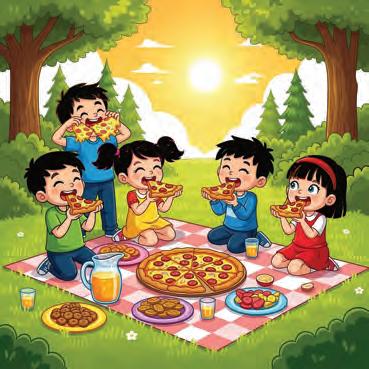








Read the poem ‘Lightning’s Roar’. Heavy black clouds began to roar, A quick bright flash lit up the shore. Long glowing bolts cut through the sky, Brighter than swords held up high.
A big gold bolt ran through the night, With the loudest boom and blinding light. The storm grew fierce, the winds did fly, And lightning danced across the sky.

Think about and discuss these questions.
1. Heavy black clouds began to roar, – What do the words in red describe in this line?
2. Give an adjective from the poem that tells us the following: Opinion: Physical feature: Size: Colour:
3. Which word describes the storm in this line? – The storm grew fierce, the winds did fly
4. Which two things are compared using the word brighter in stanza 1?
5. What does the word loudest in stanza 2 tell us about the boom?


Sometimes we use more than one adjective before a noun. They follow this order.
Possessive/ Demonstrative
Quantity/ Number
Adjective
Opinion Size Physical Feature/ Age
ShapeColourMaterial
your, their, his those, these two many several a dozen heavy quick interesting awful big long narrow wide old wrinkled bright glowing circular oval rectangular spherical black gold white silver glass leather metal cotton
For example:
Opinion Noun Size Material Noun
That bright golden bolt lit up the night sky. These narrow white leather belts are stylish.
Demonstrative Colour
Demonstrative Colour
When two or more adjectives come from the same category, we use a comma between them. If they come from different categories (opinion, size, colour, shape, material, etc.), we do not use a comma.
For example: Sheena wore a bright, cheerful dress. She wore a bright red cotton dress.
Th ink and Tell
Look at the sentence:
The rectangular ancient box was locked. Is the order of adjectives correct? If not, how would you arrange them and why?
Degrees of adjectives are used when comparing nouns. There are three degrees:
Positive DegreeComparative Degree
This is the simplest form of an adjective. It is used when there is no comparison.
The flash in the sky was bright. The thunder was loud.
The fearsome flash scared me.
These are used to compare two nouns. They usually end in -er or use more.
(More is used with adjectives that have two or more syllables.)
This flash was brighter than the previous one. (bright – 1 syllable) The thunder was louder than the sound of an aeroplane passing. This flash was more fearsome than the previous one. (fear.some – 2 syllables)
Superlative Degree
These are used to compare three or more nouns. They usually end in -est or use most.
We add the before the superlative degree of the adjectives.
The final flash was the brightest
The thunder was the loudest sound in the night sky.
It was the most fearsome storm of the year.
A syllable is a single sound part of a word. It usually has 1 vowel sound (a, e, i, o, u).
For example: pow.er.ful (3 syllables) and beau.ti.ful (3 syllables)
Add -er/-est for single syllable words tough sharp tougher sharper toughest sharpest
If the word ends in -e, just add -r/-st wise large wiser larger wisest largest
If a single syllable has one vowel sound and ends in a single consonant, we double the last consonant wet dim
Note: If the word already ends with a a double consonant, we do not double it – tall wetter dimmer taller wettest dimmest tallest
If the word ends in -y, change -y to -i and add -er/-est noisy happy noisier happier noisiest happiest
For adjectives with more than two syllables, use more/most attractive expensive
Irregular adjectives – change the word completely little (water) bad (storm)


1. Form a group of three to four students.
more attractive more expensive most attractive most expensive
less (water) worse (storm)
least (water) worst (storm)

2. Look at the set of pictures that your teacher gives you.
3. Describe them using two to three adjectives in the correct order. Form two sentences for each picture, using a different set of adjectives each time. Do not overcrowd a noun with too many adjectives.
For example: We live in a big old wooden house.
The ancient abandoned brown house is scary.
4. Finally, read your sentences aloud in class and notice how each team has described the pictures.
Teacher Tip!
Provide a common set of 4–5 pictures for each group. Choose simple pictures such as a house, a schoolbag or a cat.


1. Tick ( )the sentence in each pair with the correct order of adjectives.
(a) • The students gathered in a large rectangular hall for the elections.
• The students gathered in a rectangular large hall for the elections.
(b) • The head boy gave a short inspiring speech.
• The head boy gave an inspiring short speech.
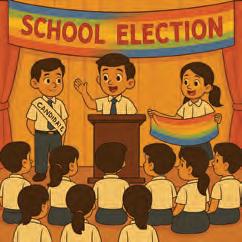
(c) • The students prepared a long colourful banner for the event.
• The students prepared a colourful long banner for the event.
(d) • The candidates wore blue smart uniforms.
• The candidates wore smart blue uniforms.
(e) • A young talented student was chosen to lead.
• A talented young student was chosen to lead.

2. Rewrite each sentence, placing the adjectives in the correct order before the noun.
(a) Women wore (traditional / many / white) sarees.
(b) We saw a (bright / round / big ) rangoli.
(c) He bought (copper / several / tiny) bells.
(d) The temple had (golden / ancient / many) lamps.
(e) We enjoyed (huge / vegetarian / our) Onam feast.

3. Fill in the blanks with the correct degrees of the adjectives in brackets.
(a) This is a (beautiful) card than the one I made yesterday.
(b) Nisha made a (colourful) card for her friend.
(c) My card is (bright) than yours.
(d) This is the (creative) card in class.
(e) Abdul decorated a (cute) card for his little sister.

(f) Among all the cards, this is the (funny) one.

4. Read the Sports Day article carefully and fill in the blanks with the correct degrees of the adjectives in brackets.
-by Shrishti
Day 2 of Little Flower School’s Annual Sports Day continued with the same excitement and joy as the first day. However, the playground looked even (a) (bright) than the previous day with the colourful flags and cheering crowds.
The 200m race was (b) (challenging) than the 100m race yesterday, but students ran with energy. Rahul of the Red House again proved to be the (c) (fast) runner in the school. In the girls’ relay, Priya of the Green House showed a (d) (strong) performance and helped her team win the gold medal. The kho-kho match was (e) (thrilling) than the earlier ones, keeping the audience glued to their seats. Among all the players, Arjun of the Blue House remained the (f) (skilful) footballer, dribbling past his opponents with ease. Meena of the Yellow House made a (g) (brave) attempt in the high jump, even though she slipped at first.
At the end of the day, our principal proudly announced that this was the (h) (memorable) Sports Day the school had ever seen.

5. Using the correct degrees of adjectives and following the adjective order rule, rewrite the summary of ‘The Boy Who Cried Wolf’.
Once upon a time, there was a young lazy shepherd who had a flock of white small sheep. One day, he shouted that a wolf was coming, even though there was no real danger. The villagers came, but they saw nothing. The shepherd laughed and felt most proud than before about silly his trick. Later, a big wolf appeared. The shepherd shouted for help, but the villagers ignored him. The wolf ate many sheep, and the shepherd learnt the more important lesson of his life.


Time: 40 mins
Total: 25 Marks
1. Fill in the blanks with the correct nouns from the box. (¹/₂ × 10 = 5 marks) wisdom library pile Delhi paper pages curiosity children book classroom
Hello! I am a (a) full of stories and (b) .

I was printed on a large press in (c) and proudly placed on a shelf in a (d) . Then, I was stacked neatly in a (e) with other shiny new books on a display table. Soon, a group of (f) found me and carried me to their (g) . They opened my (h) with excitement, and soon the smell of fresh (i) filled the air. I love how their eyes sparkled with (j) when they read my tales.
2. Fill in the blanks with the correct pronouns. (¹/₂ × 10 = 5 marks)
Lata Mangeshkar was one of India’s most loved singers. People admired (a) for her melodious voice and gentle nature.
When young singers asked (b) how she practised for such long hours, she smiled and said, ‘Discipline and love for music keep (c) going.’
Her fans often said, ‘My favourite songs are all (d) .’
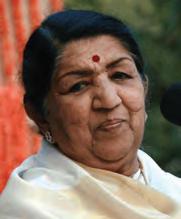
A journalist once asked, ‘(e) taught you to sing so beautifully?’
Lata replied, ‘My father trained (f) and always told me to believe in (g) .’
She never forgot his lessons and often said, ‘The dream of great success was (h) , and I made it come true.’
Listeners in every generation call her voice timeless and say that no one else can match (i) .
Today, every Indian proudly says, ‘Her legacy is (j) .’

3. Fill in the blanks with the correct articles. Use a dash (–) to show a zero article. (¹/₂ × 10 = 5 marks)
Yesterday, (a) European Union announced (b) new plan to support countries facing severe drought. The plan was discussed at (c) emergency meeting called by (d) United Nations in Geneva.
Representatives from (e) World Bank and (f) International Red Cross joined the discussion. They spoke about sending (g) team of doctors and engineers to build wells in villages where people had (h) shortage of clean water. At the press conference, (i) spokesperson said, ‘This is not just about aid; it’s about standing together as one world.’ In the end, everyone agreed that (j) cooperation was the only way to bring lasting change.
4. Tick ( ) the correct adjectives. (5 × 1 = 5 marks) (a) The Milky Way is one of the (brightest / brighter) galaxies in our universe. (b) Ancient Indian astronomers made (important / importance) discoveries about stars and planets.
(c) The Pole Star is (visible / visibly) in the night sky and helps travellers find direction. (d) Ar yabhata was India’s (first / few) artificial satellite launched into space.
(e) Many young scientists dream of making (greater / great) discoveries beyond the Moon.
5. Complete the article with the correct degree of the adjective in brackets. (5 × 1 = 5 marks)
The Goan Bakers’ Festival -by Ananya
The streets of Panjim smelled (a) (sweet) than ever as the annual Goan Bakers’ Festival began. Rows of golden loaves and soft buns made the fair one of the (b) (famous) events in the city. Among all the stalls, Mr. Fernandes’s pao looked (c) (fresh) than the others and sold out within hours. Children cheered as they tasted the (d) (delicious) cakes baked with coconut and jaggery. For every Goan, it was truly the (e) (happy) morning of the year.









Read the story.
One afternoon, a small girl named Anya was walking home from school. She saw an old lady standing at the side of a busy road. The old lady looked worried because the cars were moving very fast.
Anya quickly walked up to her and said, ‘Don’t worry, I will help you.’ She held the old lady’s hand and together they crossed the road safely. The old lady smiled and said, ‘Thank you, dear child. You are very kind.’
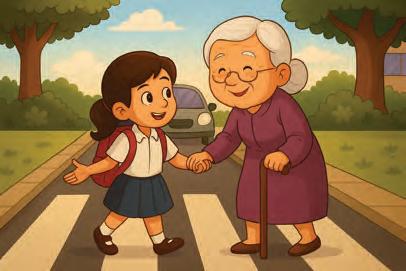
Anya felt happy because she had helped someone in need.
Think about and discuss these questions.
1. Underline any three action words (verbs) in the story.
2. Look at this sentence: Anya helped an old lady.
• Who does the action?
• What is the action?
• Who receives the action?
3. Compare these two sentences: Anya smiled. She helped the old lady. In which sentence does the action have a receiver? Which action does not have a receiver?
4. Look at the sentences with the verbs in blue – held, had helped. Do these actions have a doer and a receiver?
5. Look at the sentences with the verbs in red – was walking, looked, smiled. Do these actions show only a doer?


A verb is a word that shows an action, a state or possession.
For example: Anya was walking home from school (‘was walking’ shows what Anya was doing – it's an action)
The old lady looked/was worried. (‘looked’ or ‘was’ shows her state – how she was feeling)
The old lady has a walking stick. (Here, ‘has’ is a main verb that shows possession)
A helping verb comes before the main verb and helps it show time (tense) or meaning. A main verb is the action or state that tells what the subject is doing.
Some verbs like was walking or had helped have two parts – a helping verb and a main verb. For example: Anya had helped the old lady. → ‘had’ = helping verb → ‘helped’ = main verb
Verbs in a Sentence
Every sentence needs a verb. A sentence can be divided into the following parts:
The subject is who or what the sentence is about. It is the doer of the action.
Ask the question Who? – Who held the old lady's hand?
The verb is the action or the state of being. The object is the receiver of the action. It tells who or what is affected by the action.
Ask the question What? or Whom? about the verb – your answer must be a noun or a pronoun – What was held?
Anya held the old lady’s hand Anya held the old lady’s hand Anya held the old lady’s hand.
Transitive and Intransitive Verbs
Anya held the old lady’s hand. The old lady smiled. The verb held needs the object, the old lady’s hand, The verb smiled doesn’t need an object to complete its meaning. to complete its meaning.
These are verbs that need an object, which means they include the receiver of the action in the sentence.
For example:
Anya helped the old lady. Who did Anya help? – the old lady (object)
More examples:
The boy ate a sandwich. (ate what?)
I watched a cartoon. (watched what?)
She wrote a letter. (wrote what?)
We played our opponents. (played whom?)
Intransitive Verbs
These are verbs that do not need an object to make a complete sentence. For example: They walked slowly. No object is needed. The action is complete in itself.
More examples: The baby cried loudly. The dog barked all night. The children laughed. My friend arrived late.
Note: If a word or phrase tells you the place, time or manner of the action, it is not an object
An object answers the questions What? or Whom? after the verb.
For example: The baby cries in the room
Here, ‘in the room’ is a phrase that shows a place – it answers Where? not What? or Whom?
Because there is no object, the verb cries is intransitive.



1. Play in pairs or small groups.
2. Place your markers (coin, eraser, button) on Start.
3. Take turns to roll a dice and move forward.
4. Make a sentence with the verb in the box you land on. If the box is red → include an object. Use a transitive verb. For example: I eat an apple
If the box is blue → the sentence must not have an object. Use an intransitive verb. For example: I run fast.
5. If the sentence is correct, you can continue when it is your turn again.
6. If the sentence is wrong, move back to the box where you last made a correct sentence.
7. The pair or group that reaches Box 16 first wins the game.



Students should not repeat the same sentences.

1. Fill in the blanks with the correct form of the verbs (helping verb + main verb).
(a) The children (plant) trees around the school campus at the moment.
(b) Right now, their teacher (guide) them through the activity.
(c) These days, some students (collect) plastic bottles from the nearby park.
(d) Tomorrow, Krish (donate) storybooks to the community library.
(e) All the students (work) hard this week to make their area clean and green.
2. Read the sentences. Write ‘T’ if the verb is Transitive and ‘I’ if the verb is Intransitive in each sentence.
(a) One morning, Akhil went to the forest.
(b) He saw a colourful bird sitting on a branch.
(c) Suddenly, the bird flew away and Akhil ran after it.
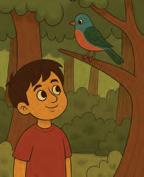
(d) He picked up a small stick and threw it into the river.
(e) Later, he found some bright flowers and smelled them.
(f) Akhil returned home happily.
3. Underline the verb. Circle the object (if any). Write whether the verb is Transitive or Intransitive.
(a) Rohan and his sister arrived at the film theatre on time.
(b) Rohan bought a big tub of popcorn and two cold drinks.
(c) They chatted happily while waiting for the film to start.
(d) The lights dimmed slowly, and the audience became quiet.
(e) Everyone laughed loudly during the funny scenes.
(f) Rohan dropped his straw while trying to open the drink.
(g) The children clapped at the end of the film.
(h) They walked out of the theatre with big smiles on their faces.

4. Rewrite the sentences in the correct Subject-Verb-Object (SVO) order.
(a) obser ved / the students / the planets / through the telescope
(b) taught / the teacher / the moon phases / in class





(d) explained / the teacher / the solar system / to the students
(e) discovered / astronomers / a new asteroid / last year

(c) recorded / Aarav / the positions of the stars / in his notebook














5. Complete the report by filling in the blanks with the correct verbs and objects. You may have to change the form of the clues given in the box.
showcase participate distribute prizes Annual Sports Day give hold
Happy Hour School Annual Sports Day by (your name)
Note: A report is a factual piece of writing that gives information about something that has happened or been observed.
Happy Hour School (a) its (b) on Saturday. The students (c) in various races, relays and events. The participants ran and competed in all the events with determination. The principal (d) the (e) to the winners. Volunteers (f) refreshments to everyone. Parents and students cheered loudly, creating a lively atmosphere. The event (g) teamwork, courage and sportsmanship among the staff and students. Overall, it was a memorable day filled with joy, energy and healthy competition.








Read the conversation between two students and their teacher.
Shyam: Ma’am, can I come in?
Teacher: Yes, you can, but don't come in. (Shyam is puzzled. Just then...)
Gurpreet: Ma’am, may we come in, please?
Teacher: Yes, you may. Please come in.
Shyam (whispers to Gurpreet): That’s strange. Why did she say no to me and yes to you?
Gurpreet: I think it’s because I used may, which is more polite.
Shyam: Ohh... I see! I will ask correctly next time.
Gurpreet: We should go inside now.
Think about and discuss these questions.
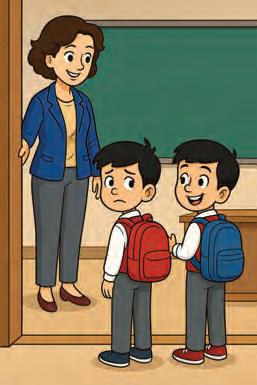
1. Why do you think the teacher said ‘No’ to Shyam but ‘Yes’ to Gurpreet?
2. When Gurpreet says, ‘We should go inside now,’ is he giving an advice or an order?
3. In the sentence ‘I will ask correctly next time,’ what does will suggest – a future action or a belief?

A modal verb is a helping verb that shows ability, possibility, permission, advice or obligation. It is used before the main verb in a sentence.

Let’s look at some common modals and their uses.
Must To express strong obligation
Can To show ability or ask permission (informal)
Could To express past ability or make a polite request
You must listen attentively in class. (Obligation)
Must I complete this task today? (Obligation)
She can solve the riddles very quick. (Ability)
Can I go to the library with you? (Permission in an informal situation)
When I was younger, I could recite all the poems by heart. (Past ability)
Could you please explain that again, Ma’am?
(Polite request)
May To ask or give permission (formal) or express possibility
Might To express a possibility that is less strong or to make a very polite suggestion
Will To express future actions or a strong belief
Would To make a polite request/ offer or to talk about past habits
May I leave early, ma’am? (Formal request for permission)
Yes, you may. (Formal permission given)
She may not have a quiz tomorrow. (Possibility)
She might have a surprise test next week. (Possible but less certain than when using may)
You might ask the teacher that question. (Polite suggestion)
I will ask correctly next time. (Future action)
You will understand better if you listen to Ma’am. (Strong belief)
Would you please pass me the book? (Polite request)
Would you like some help with your notes? (Polite offer)
When we were in Grade 4, we would read stories aloud every Friday. (Past habits)
Shall To make polite or formal offers
Shall we begin our group discussion now? (Formal offer)
Shall I open the window, sir? (Formal offer)
Should To give advice/make a suggestion We should go inside now. (Advice/Suggestion)
You should talk to the teacher. (Advice/Suggestion)
To form a negative, add not after the modal verb.
She will not (won’t) help me.
They cannot (can’t) solve the riddle.
We should not (shouldn’t) be late for school.
He must not (mustn’t) talk.
Note: May not doesn’t have short form in the negative.
Use might not and shall not rather than mightn’t and shan’t Cannot is spelt as one word.
To ask a question, move the modal verb to the front of the sentence.
She will help me. Will she help me?
He can solve riddles. Can he solve riddles?
She should pay attention. Should she pay attention?
We may leave early. May we leave early? Error Alert!
Always use the base form of the verb after a modal verb. Correct: She can go. Wrong: She can goes.


1. Divide the class into teams of five. Each team gets five modals: can, should, may, must, will.
2. Teams make one rule for each of these places using a different modal for each rule.
• Library • Hospital • School • Park • Market
For example: Children may play in the park between 4 o’clock to 6 o’clock.
3. Each team presents their 'Modal Town' rules to the class.
Note: Every student must read at least one rule.

1. Tick ( ) the correct modal verbs.
(a) Sanjana has broken her thumb. She (can / must / might ) go to the hospital immediately.
(b) The doctor said, ‘She (may not / will not / could not ) carry heavy things for now.’
(c) ‘You (should / would / could ) rest now, Sanjana. I’ll do the cutting and pasting,’ said Rohan.
(d) Sanjana smiled, ‘Thank you! (Can / Must / Would ) I borrow your coloured markers?’

(e) ‘Of course, you (can’t / must / can ),’ Rohan replied.
(f) ‘It (may / must / could ) rain soon,’ Sanjana said, looking at the sky.
(g) ‘You (should / would / might ) keep your raincoats ready today,’ said their teacher.
2. Fill in the blanks with the most suitable modals.
(a) Raman (can / may ) speak confidently, so he was asked to host the event.
(b) ‘ (Should / May ) we put up the poster about the programme at the gate?’ he asked.
(c) ‘No, it (can / will ) definitely rain before the programme starts,’ said a teacher.
(d) ‘Then we (would / will ) put it up in the corridor,’ Raman said.
(e) ‘Raman, you (should / can ) speak clearly so everyone can hear you,’ said the teacher.

3. Drishti’s social science book was not printed properly. Help her complete the paragraph by using each modal verb in the box once. would must should can will shouldn’t
(a) To build a strong society, every citizen contribute to the welfare of others.
(b) The government provide equal opportunities in education and health so that no child is left behind.
(c) these rules ensure equality for all?
(d) Yes, if we all cooperate, poverty easily be reduced in the coming years.
(e) Citizens be denied their basic rights.
(f) implementing these rules across nations help?
4. Imagine you are the class monitor, and your school is planning a trip to the Science Museum. In your notebook, write an email to your classmates giving them rules and guidelines for the trip. Use modals and their negative forms in your email.
Note: You may refer to the format of an email on page no. 136









Read what Swati, Kabir, Meera and Arjun say about a beloved Indian drink.
Swati: Did you know India is one of the largest tea producers in the world? Indians usually start their day early with a cup of chai.
Kabir: My grandmother brews it carefully with ginger and cardamom. The aroma quickly spreads everywhere.
Meera: Have you seen how vendors skilfully pour the very hot tea from high above?
Arjun: Yes, I have! In Assam and Darjeeling, farmers work patiently to pluck the leaves, and these leaves are widely enjoyed across the world.
Swati: Tea is truly an important part of our culture.
Think about and discuss these questions.
1. When do Indians usually start their day?
2. How does grandmother brew tea?
3. Where does the aroma spread?
4. How often do people start their day with tea?
5. To what extent is chai part of Indian culture?


An adverb tells us how, when, where, how often or how much something happens. It adds meaning to a verb, an adjective or even another adverb.
For example:
Grandmother brews the tea carefully. (this tells how she brews it – carefully modifies the verb brews)
The tea is very hot. (very tells how much – very modifies the adjective hot)
He stirred the tea quite quickly. (this tells us to what degree – quite modifies the adverb quickly)
Let’s look at the different types of adverbs.
Adverbs of Manner They show how something is done. They often end in -ly.
Adverbs of Time They show when something happens.
Vendors skilfully pour the tea.
Farmers pluck the tea leaves patiently.
Grandmother carefully brews the tea.
Indians drink their tea early in the morning. The children will drink their tea tomorrow. I recently visited a tea plantation.
Have you been to Assam yet?
Adverbs of Frequency These adverbs show how many times or how regularly something happens.
Adverbs of Place They show where the action happens.
Adverbs of Degree They tell us about the intensity of the action or quality. Ask how much or to what extent.
Indians usually start their day with tea. I always drink tea in the morning.
Vendors sometimes make their tea too sweet. Our house is rarely without tea from Assam.
The vendors serve their tea outside. He looked everywhere for a tea stall.
The tea is very/extremely hot.
The tea is too hot to drink.
I like my tea quite milky. He is almost ready to serve the tea.
Note: When there is more than one adverb in a sentence, the adverb of degree is usually placed before the adverb of manner
For example: She sang very beautifully. (very = adverb of degree, beautifully = adverb of manner)


Read the clues and fill in the crossword with adverbs that complete the sentences.

Across:
1. We play football after school. (frequency)
2. The hockey match ended at night. (time)
3. Cricket is played in India. (place)
4. She ran fast to win the race. (degree)
5. The goalkeeper jumped to catch the ball. (manner)
Down:
6. The player batted to protect his wicket. (manner)
7. Players practise hard before a match. (frequency)
8. Many kinds of sport are played . (place)
9. The game started in the morning. (time)



1. Tick ( ) the adverbs that complete the sentences about good habits.
(a) We should talk to everyone .
• rudely • politely • seldom
(b) When we leave home, we should inform our parents.
• never • quicker • always
(c) When we see someone in need, we should help them • slowly • quickly • lazily
(d) We should meditate every morning. • quietly • loudly • early
(e) We should skip meals. • always • never • often

2. Ritika is stressed about the exams. Fill in the blanks using the adverbs given in the box. always never usually extremely really well
Arun: Hi, Ritika! You look tense.
Ritika: I am not (a) nervous before exams but this time, I am (b) afraid.
Arun: Why? Aren’t you well prepared?
Ritika: I am (c) prepared but I am (d) worried that it is not enough.
Arun: Oh! You should (e) let your fear take control. You should (f) talk to someone you trust when you feel this way.
3. Use adverbs from the box to complete the safety precautions to be followed during an earthquake. immediately respectfully safely slowly regularly never always
(a) You should stay calm and follow the safety rules.
(b) take cover under a table or a strong desk.
(c) Stay inside until the shaking is completely over.
(d) run out before it is safe, as objects may fall on you.
(e) Walk out when it is safe to leave the building.
(f) Follow the instructions of rescue workers
(g) Check on your family and friends .
4. Complete the dialogue between Rahul and his uncle about a safari they will be taking. Fill in adverbs of the type given in brackets.
Uncle: Rahul, are you excited about our safari trip?
Rahul: Yes, Uncle! I woke up (a) and I cannot wait!
Uncle: That’s good. You should pack your bag (b) .
5. In your notebook, write a 50–80 word paragraph about a funny incident at home. Then, deliver it in class. Use at least five adverbs in your paragraph. (time)
Rahul: Don’t worry. I (c) pack my bag the night before going on a trip.
Uncle: We may not see many animals (d) but if we watch (e) , we may spot them.
Rahul: I will listen to the guide and hope we spot some animals (f) .
(manner) (frequency) (time) (manner) (place)










Read the story.
On Independence Day, Pragya went to school for the celebration. The tricolour flag stood tall behind the stage. The principal spoke with pride about the freedom fighters. After the speech, the students sang patriotic songs joyfully. Riya found a basket of sweets near the podium. Everyone shared the sweets. At the end of the celebration, the children promised to take care of their country.
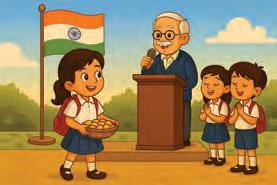
Think about and discuss these questions.
1. What is behind the stage? What does behind tell us about its position?
2. Circle the words that show the place/position of objects.
3. What does with in ‘The principal spoke with pride’ show?
4. Look at the words in red. Which part of speech follows every preposition?

A preposition is a word that shows the relationship between a noun or a pronoun and another word in the sentence. They tell us where, when, how, why or to whom something relates.
For example: The Indian flag stood behind the stage. (Where was the flag?)
The programme started after the flag hoisting. (When did it start?)
They decorated the school with tricolour paper. (How did they decorate it?)
This badge is for the chief guest. (For whom is the badge?)
If the word answers where, when or how but is not followed by a noun or a pronoun, it’s probably an adverb and not a preposition!
For example: She walked across the street. (Preposition) She walked across. (Adverb)
Let’s look at the different kinds of prepositions.
They show when something happens. When we ask the question when, the answer is usually a noun or noun phrase
For example: The Independence Day programme will begin at 8:30 a.m. sharp.
India gained its freedom on 15 August 1947. The students stood straight during the patriotic song.
Some common prepositions of time are at, on, in, during, after, before, since and until.
They show where something is. When we ask the question where, the answer is usually a noun or noun phrase.
For example: The tricolour flag stood tall on the stage
The principal stood behind the podium to give the speech. A basket of sweets was placed near the podium.
Some common prepositions of place are on, in, under, behind, near, beside, between, above and below.
They show where something is moving or the direction of the movement. When we ask the question where to, the answer is usually a noun or noun phrase
For example: The students marched towards the flagpole carrying banners.
After the function, children ran out of the hall. Balloons floated into the sky as the flag was raised.
Some common prepositions of movement are to, into, onto, out of, from, towards, across, through, along, down and up.
A noun or pronoun or a noun phrase always follows a preposition. For example: The girl with the red ribbon is my friend.

These show how something is done.
Prepositions Use
Examples with Shows how something is done –the tool, feeling or way in which the action happens
The principal wrote with a pencil. (tool) He wrote the speech with gratitude. (way of doing something) He spoke with pride. (feeling/manner) by Shows how something is done We travel by train. in Shows the manner, style or state in which something happens They sang the anthem in harmony. about Shows the topic or subject someone is talking, writing or thinking about
These show ownership or belonging.
Prepositions Use
The teacher spoke about the sacrifices of freedom fighters.
Examples of Shows belonging or connection
The pages of the book are torn. with Shows what someone/something has or owns
The girl with the red bag is my friend. for Shows that something is intended for someone This gift is for my brother. to Shows that someone/something belongs to or is given to
The keys were given to him The keys to the house are missing.


1. Your teacher will call out a preposition.
2. Quickly act out the meaning of the preposition and say a sentence.
3. You can use a prop like a book, notebook, box, pencil or bag.
For example: The teacher says on. You can put a book on the table and say, ‘The book is on the table.’



1. Choose the correct answers to fill in the blanks.
(a) We must save water (for / with / about) future generations.
(b) A dripping tap can waste litres of water (in / on / by) the span of one day.
(c) People should store rainwater (at / in / on) tanks.
(d) Farmers can water their crops (with / on / at) drip irrigation.
(e) We must talk (of / about / for) water conservation in schools.
(f) Clean water is a gift (to / on / with) all living beings.
2. Fill in the blanks with correct prepositions.
(a) Rohan walked the busy road to reach the shopping mall.
(b) A tall Christmas tree was placed the main entrance.
(c) He saw a poster a special holiday sale.
(d) Rohan bought a packet biscuits from the bakery.
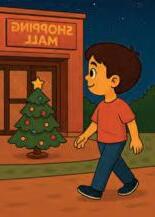
(e) The sale was valid the last weekend December.
(f) He carried the bags home a big smile.
(movement) (place) (manner) (possession) (time) (time) (manner)
3. Join each pair into one meaningful sentence using the correct preposition.
(a) The students entered The main gate of the factory
(b) They walked The long corridor to the mixing room
(c) A big chart hung The machines to explain the process
(d) Workers filled the trays The fresh biscuits
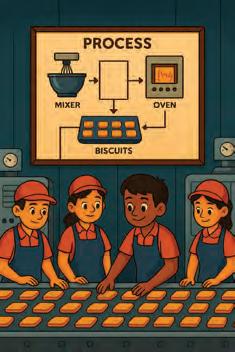

4. Underline the incorrect prepositions in the travel blog. Rewrite the given passage using the correct prepositions.
Last winter, I went in Jaipur with my family. We reached the city on night on 20 December. The hotel was located in the main road on the palace.
The next day, we visited the Amber Fort. We climbed in an elephant and reached the fort in the afternoon. Inside the fort, we saw beautiful paintings made by natural colours.
Later, we went shopping. My mother bought a set for bangles and my father took photos by his new camera. I ate delicious food and drank lassi in a clay cup.
Finally, we returned home and spoke on our memories. It was truly a journey for joy and togetherness.








Read the story of Ashima.
Ashima was excited about the class debate, but she was nervous about speaking in front of the class. Her friend Sangam noticed her worry, so he encouraged her to practise with him. At first, Ashima wanted to give up because she thought she might make mistakes. Although she was scared, she decided to try again.

On the day of the presentation, Ashima spoke in a clear voice. The teacher smiled, for she could see how hard Ashima had worked. The class clapped loudly, and Ashima felt proud of herself. Ashima was thankful, since the project gave her both confidence and joy.
Think about and discuss these questions.
1. Ashima was excited about the debate, but she was nervous about speaking. Which two words in the sentence show the contrasting ideas? Which word is used to join the sentence?
Conjunctions are joining words. They connect words, phrases or sentences and make our writing more meaningful and fluent.
2. Sangam noticed her worry, so he encouraged her to practise with him. Which part of the sentence shows the result of something? Which conjunction has been used?
3. What is the difference in the use of and in these lines?
(a) The class clapped loudly, and Ashima felt proud of herself.
(b) Ashima was thankful, since the project gave her both confidence and joy.
4. Which two conjunctions have been used to give a reason?


The words and, but, so, since, although, because, and and for are conjunctions. They help join words, phrases and sentences. Different conjunctions have different uses.
We can use FANBOYS to remember these conjunctions that join two equal ideas (words, phrases or complete sentences).
For gives a reason
And adds information
The teacher smiled, for she could see how hard Ashima had worked.
The class clapped loudly, and Ashima felt proud of herself. Nor shows two negative actions Ashima didn’t panic, nor did she give up.
But shows contrast
Ashima was excited, but she felt nervous. Or shows choice
Do you want to go to the zoo, or do you want to visit the museum?
Sangam asked, ‘Would you like to practise now or later?’ Yet shows contrast She was scared, yet she stepped forward to speak. So shows result Sangam noticed her worry, so he encouraged her to practise.
Use a comma before a FANBOYS conjunction only when it joins two complete sentences. For Example: Ashima was excited, but she felt nervous. Wrong: Ashima was excited, but nervous. Correct: Ashima was excited but nervous.
Look at these conjunctions that show time, cause, contrast or condition.
Conjunction Use
Examples because shows reason
Ashima wanted to give up because she thought she might make mistakes. although shows contrast Although she was scared, she decided to try again. since shows cause or time Ashima was thankful, since the project gave her both confidence and joy. (cause) She has been practising regularly since the day Sangam encouraged her. (time) unless shows condition You can’t go out to play unless you finish your homework.
while shows time or contrast Sangam waited patiently while Ashima gathered courage. (time)
Ashima was nervous, while Sheena was excited. (contrast)
when shows time
When it was her turn, Ashima stood up and smiled. where shows place This is the classroom where Ashima practised her speech.
if shows condition
that adds more detail or refers to something just mentioned
The teacher said, ‘If you practise, you’ll feel more confident.’
Ashima gave a speech that impressed everyone. This is the girl that I mentioned.
so that shows the purpose of an action Ashima practised her speech so that she could speak confidently.
Some conjunctions like because, although, since, when, if, while can begin a sentence. When this happens, use a comma after the first part of the sentence. For example: Although she was nervous, she gave her best. No comma is needed when the conjunction comes in the middle of the sentence. For example: Ashima gave her best although she was nervous.

1. Your teacher will pass a soft ball to a student and say a sentence aloud.
2. The student who has the ball will extend the sentence using a conjunction.
3. If the sentence is correct, the student will pass the ball back to the teacher. If the sentence is incorrect, the student will pass it to another student in the class to extend the sentence.
4. Keep playing until everyone has had a turn.
I want to play outside. I want to play outside, but it is very sunny.




1. Tick ( ) the correct conjunctions to complete the sentences.
(a) Classrooms must be safe spaces, (and / so) they should also be full of learning tools.
(b) Every child deserves a good education, (for / or) it helps build a better future.
(c) Some children don’t have access to books, (nor / or) do they have the internet to study online.
(d) Piya wanted to study many languages, (but / and) her village school only offered two languages.
(e) Students can choose to take part in sports, (or / for) join the music club.
(f) The school was small, (yet / so) it had a big library.
(g) The students worked hard all year, (so / nor) they did well in their exams.
2. Fill in the blanks with the correct conjunctions from the box. and but or so because although if Satish wants to stay healthy.
(a) he washes his hands regularly, he will not fall ill.
(b) He drinks plenty of water his body needs to stay hydrated.
(c) He eats fruit and vegetables every day, his body is strong.
(d) Exercise keeps him fit, it also improves his mood.
(e) His trainer asks, ‘Do you want to go cycling do yoga this morning?’
(f) He wants to go cycling, it starts raining heavily.
(g) he is tired, he still finishes his fitness routine.
3. Use the conjunction in brackets to join the sentences. Add commas if needed.
(a) Rohan studied hard for his maths exam. He did not feel very confident. (yet)
(b) He revised his notes. He solved practice papers before the exam. (and)
(c) He was nervous. He tried motivating himself. (but)
(d) On the exam day, Rohan sat quietly. The examiner distributed the papers. (while)
(e) He smiled with relief. The exam was over. (when)
4. Read the story carefully. Then, write it in your notebook by correcting the conjunctions and adding or removing commas wherever needed.
One day, a lion was sleeping in the forest but a tiny mouse ran across his paw. The lion caught the mouse, while he wanted to eat him, because he was hungry. The mouse begged for mercy, and promised, ‘I will help you one day.’ The lion laughed if he let the mouse go.
After many days, the lion was caught in a hunter’s net. The lion was brave, and he struggled to break free.
The mouse heard his roars but ran quickly to help. The mouse wanted to help, since he remembered the lion’s kindness. The mouse bit through the ropes, although the hunters were away, and freed the lion.
Both of them became friends and they lived happily in the forest.

Time: 40 mins
Total: 25 Marks
1. Underline the verbs in these sentences. Identify whether the underlined verb in each sentence is Transitive (needs an object) or Intransitive (doesn’t need an object). Write ‘T’ for Transitive verb and ‘I’ for Intransitive verb. (¹/₂ × 4 = 2 marks)
(a) Grandma prepared delicious mishti doi for everyone.
(b) The cousins played on the old swing in the courtyard.
(c) Didi painted a colourful alpona on the floor.
(d) Aunt Meera sang beautifully during the evening aarti.

2. Write four sentences about how you help at home during festivals. Use at least two auxiliary verbs (is, are, am, was, were, have, had, will, etc.) and two main verbs. (4 marks)
3. The following passage in Vikram’s history book was not printed properly. Complete the paragraph by using each modal verb in the box once. (1 × 4 = 4 marks) must should may will
(a) Every citizen visiting Delhi see Rashtrapati Bhavan at least once.
(b) Visitors follow all the security rules inside the complex.

(c) Tourists ,without a doubt, be amazed by the beauty of the Mughal Gardens.
(d) A visit to such a grand monument remind us of our nation’s rich history.
4. Complete the passage with suitable adverbs from the box. (¹/₂ × 10 = 5 marks) quickly again neatly always politely early happily very carefully patiently
Yesterday was a busy day at Blue Meadows School.
Binny woke up (a) to get ready for the annual art competition. She walked to school (b) and met her friends (c) near the playground. The students arranged their drawing sheets (d) on the tables before the judges arrived. Binny spoke (e) to her teacher and asked for some extra crayons. When the competition began, everyone worked (f) so that their designs looked neat. Outside the hall, the parents waited (g) to see their children’s artwork. Binny’s painting was (h) colourful and imaginative. She (i) enjoys such creative days and hopes to win (j) this year.
5. Fill in the blanks with suitable prepositions. (¹/₂ × 10 = 5 marks)
(a) The shops in the bazaar open 9 a.m. every day.
(b) A fruit seller sat a big umbrella near the entrance.
(c) We walked the narrow lanes filled with colourful stalls.
(d) The sweet shop was the bakery and the flower stall.
(e) Ravi paid for the vegetables cash.
(f) A little boy ran the toy shop to see the new cars.
(g) The price tags the clothes were missing.
(h) The woman the blue sari sold handmade baskets.
(i) I bought bangles my mother.
(j) Everyone moved the exit when the lights flickered to show closing time.

6. Use the conjunction in brackets to join the sentences. (1 × 5 = 5 marks)
(a) The Mumbai Queen set sail from the harbour. The sun was setting beautifully over the sea. (when)
(b) Ashima was excited. This was her first trip. (because)
(c) She was a bit scared. She decided to stand at the rails on the deck. (although)
(d) The waves sparkled. The music played softly in the background. (while)
(e) Ashima waved happily to her friends. They stood on the top deck. (where)








Read the conversation between Fatima and Rajiv.
Fatima: What are we going to do in social science today?
Rajiv: We’re starting with Indian history.
Fatima: Oh no! I do not enjoy history! I find it boring.
Rajiv: I don’t think it is. It’s important to understand our past.
Fatima: Why worr y, we can’t change the past, can we?

Rajiv: That’s true, but even if we can’t change it, we can still learn from it. Forget that you do not like history. Having a positive attitude will help.
Think about and discuss these questions.
1. Which of Fatima’s sentences sound as if she is asking something?
2. Which sentences tell us something or share information?
3. Find a sentence where Fatima shows a strong feeling.
4. Which sentence sounds as if Rajiv is giving advice or suggesting something?
5. Do all the sentences end the same way? What do you notice about the punctuation marks?

A sentence is a group of words that makes complete sense. It begins with a capital letter and ends with a full stop (.), question mark (?) or exclamation mark (!).
The subject says who or what the sentence is about. The predicate, that includes the verb, says what the subject does or is.

For example: We’re starting with Indian history. What are we going to do in social science today? Oh no! I do not enjoy history!
Every sentence has two parts – a subject and a predicate. For example: Fatima asked a question. (subject) (predicate)
Let’s look at the four kinds of sentences.
Types of Sentences
Declarative/ Assertive Sentences
Interrogative Sentences
They state a fact or give information and end with a full stop.
These are questions and they end with a question mark.
Note:
• Yes/No questions begin with Is, Are, Am, Do, Does, Did or a modal. (They can be answered with only a Yes or a No unless the speaker wishes to give more information.)
• Wh-questions begin with words like What, Why, Where, When, Who, Whom and How. (They demand more detailed answers.)
I enjoy reading history books. Emperor Akbar was a great ruler.
Is history interesting?
Do you like reading about India’s struggle for freedom?
Can history be taught in an interesting way?
(These questions can be answered with a Yes/No.)
Why do you find history interesting?
How can history be taught in an interesting way?
(These answers give details.)
Imperative Sentences
Exclamatory Sentences
These sentences command, request or offer advice and can end with a full stop or an exclamation mark. They are directed at someone and usually start with the base form of the verb
Exclamatory sentences express strong emotions and end with an exclamation mark.
Forget that you do not like history.
Open your history book to Chapter 3.
Listen carefully to the story of Emperor Akbar.
Read the next paragraph about Emperor Akbar.
On no! I hate history! I will not do it!
No, that cannot be!
In imperative sentences, the subject is usually ‘you’, but we don’t write it. Wrong: You bring your art file.
Correct: Bring your art file.
Look up these words in the dictionary and share the definition to help you remember the kinds of sentences.
assert declare interrogate exclaim imperial
Sentences can be either affirmative (positive) or negative (using not, never, don’t, etc.).
Declarative I like reading history books.I do not like reading history books. Interrogative Do you like history? Don’t you like history? You don’t like history, do you?
Imperative Bring your notebook next time.Don’t forget your notebook.
Exclamatory What a great lesson! This is not a boring lesson!



1. The class will be divided into groups of four students.
2. Each student in the group will represent one kind of sentence.
For example:
• Student 1 → Declarative sentence
• Student 2 → Interrogative sentence
• Student 3 → Imperative sentence
• Student 4 → Exclamatory sentence

3. One group will come to the front of the class and stand in a line. Each student will wear or hold a label showing their sentence type.
4. Students from the rest of the class will take turns saying a sentence aloud. It can be any one of the four kinds of sentences. Make sure to avoid repeating the same kind of sentence during a round.
For example: I will not go to Nainital.
5. The student at the front, whose sentence type matches the example, will hop forward once. The players must hop within four counts, or they miss their turn.
6. After a few rounds, a new group of four will come to the front, and the game continues!




1. Natasha has made some typing errors and punctuated the sentences incorrectly. Correct them.
(a) What a beautiful Madhubani painting?
(b) She is painting a Madhubani design!
(c) Give me the black pen for the outline?
(d) Will you paste my Madhubani artwork on the wall!
(e) Hurray. Our class display looks amazing.
2. Unjumble the following sentences and match them with the options given in the second column.
Sentence
Type of Sentence
(a) bought / new / car/ Rohan/ a • • Interrogative
(b) a / car / beautiful / what / is / this • • Imperative
(c) much / how / it / cost / does • • Exclamatory
(d) with / money / be / careful / your • • Declarative

3. Read each sentence below. It is in the negative form. Rewrite it in the affirmative form. Change the verb form where needed.
(a) I do not speak kindly to others.
(b) He does not say sorry when he hurts someone.
(c) We don’t help our classmates when they are stuck.
(d) She doesn’t listen when others are talking.
(e) They do not wait for their turn at the tuck shop.

4. Read each sentence and change it to the type mentioned in brackets.
(a) She left the solar power kit on the table. (Interrogative)
(b) It is a bright, sunny day. (Exclamatory)
(c) Install the solar panel on the roof. (Interrogative)
(d) Can we use solar lights in the village? (Declarative)
(e) The team worked hard on the energy model. (Exclamatory)
(f) Could you bring the clean energy chart? (Imperative)
(g) I think wind energy is a good option. (Interrogative)
5. In your notebook, write a short story about your favourite cartoon character. Illustrate your story. Make it fun and creative – your character can talk, travel or do something silly! Your story must include all the kinds of sentences.










Read the text below.
Avni, her cousins and her eleven-year-old brother Aarav were on a family trip to Vantara, a wildlife and nature care centre in Jamnagar, Gujarat. Avni, who was just five years old, was very excited about seeing the animals.
As the jeep entered the forest area, Avni said to the driver, ‘To see the elephants near the lake, please.’
The driver looked a little confused. He smiled but didn’t slow down. Aarav leaned forward and helped. He said, ‘Avni wants to stop near the lake to see the elephants.’
The driver nodded and stopped the jeep near the lake.
Think about and discuss these questions.
1. What does Avni say to the driver? Do her words have a subject and a verb?
2. What does Aarav say to the driver? Does Aarav’s sentence have both a subject and a verb?
3. Which words – Avni’s or Aarav’s – form a complete sentence with a clear meaning?

When we write or speak, it is important to use full sentences so that people clearly understand what we mean.
‘To see the elephants near the lake, please’ is not a sentence. It is a phrase.
A phrase is a group of words that does not have both a subject and a verb. It does not express a complete thought.
For example: To see the elephant
Running through the zoo
Clauses
A clause is a group of words that has both a subject and a verb
For example: The lion (subject) was sleeping (verb).
We (subject) are going (verb) to Vantara tomorrow
These are complete sentences. They have a subject and a verb, and they make sense on their own.
For example:
The bus stopped near the lake.
We saw a baby elephant.
These have a subject and a verb, but they do not make sense on their own. They are incomplete and need more information to complete the sentence.
For example:
Because Avni loves animals When we reached the zoo
If a dependent clause comes first, use a comma before the independent clause. For example: Because it was raining, we stayed inside. (dependent clause) (independent clause)
If an independent clause comes first, no comma is needed before the dependent clause. For example: We stayed inside because it was raining.
(independent clause) (dependent clause)
An independent clause is like a complete building, and inside it, we find:
• Subject: Who or what the sentence is about
• Predicate: What is being said about the subject
So, subject + predicate = clause
For example:
Avni was feeding the birds. (‘Avni’ is the subject and ‘was feeding the birds’ is the predicate)




1. Work in pairs. Plan together and write a phrase. Then, use the phrase in a full sentence (an independent clause).
2. The teacher will call one pair at a time to come to the front.
3. One student will say the phrase. For example: after the party
4. The second student will give the full sentence. For example: She went home after the party.
5. The game continues until all the pairs have had a chance.

1. Circle the clauses and underline the phrases. One has been done for you.
(a) When Tina drew a big circle, her friends watched her work.
(b) On the table
(c) Because the fair was tomorrow, everyone worked quickly.
(d) Near the door
(e) After they finished their work, the children cleaned the floor.
(f) Ashish made a sign with red and blue paint.
2. Underline the independent clauses in the sentences.
(a) While the astronaut floated in space, he described the view of Earth.
(b) The rocket launched successfully although the weather was cloudy.
(c) If the oxygen level drops, they will return to the space station.
(d) The astronauts trained for months before the final mission.
(e) When the alarm rang, she quickly put on her helmet.
3. Underline the dependent clauses in the sentences.
(a) I love watching Doraemon because his gadgets are so cool.
(b) Although Tom tries to catch Jerry, he always fails.
(c) The kids laughed loudly when Shinchan made a silly face.
(d) Since Scooby-Doo is afraid of ghosts, he hides behind Shaggy.
(e) The class discussed which cartoon is the best while they waited for the teacher.
4. Identify the independent and dependent clauses in the following sentences.
(a) They cancelled the picnic because dark clouds filled the sky.
Independent clause:
Dependent clause:
(b) Priya stayed near the window while the rain poured heavily.
Independent clause:
Dependent clause:
(c) She made hot chocolate before her cousins arrived.
Independent clause:
Dependent clause:
(d) When the thunder roared, the lights flickered for a moment.
Independent clause:
Dependent clause:
(e) They played board games inside as the ground was too wet to go out.
Independent clause:
Dependent clause:
(f) Piya said she would go outside only if the rain stopped.
Independent clause:
Dependent clause:









Read the conversation between Satvik and Shreya.
Satvik: How far is your group project?
Shreya: It isn’t done. We did not have all the information yesterday.
Satvik: Do you have any AI tools?
Shreya: No, I don’t. You know some good ones, don’t you?
Satvik: Yes, I do. You can try ChatGPT or Google Gemini.
Shreya: Will you please help me tomorrow?
Satvik: Yes, of course, I will!
Think about and discuss these questions.
1. Find and underline in red one sentence in the simple present tense (positive or negative).
2. Find and underline in blue one sentence in the simple past tense (positive or negative).
3. Find and underline in green one sentence in the simple future tense.
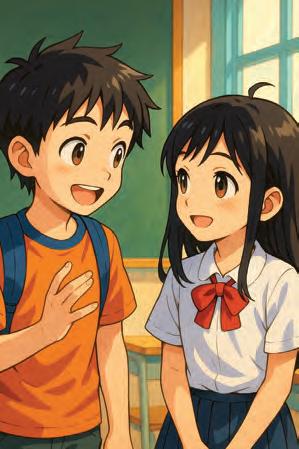
Tense is the form of a verb that shows when an action happens – in the past, present or future.
4. Identify one question and one negative sentence in the conversation.

We use the simple past tense to talk about completed events or about habits or facts that were true in the past.
Time words: yesterday, the day before, last week/month, last year, etc.
We use the simple present tense for habits, facts, general truths and things we do in the present time.
Time words: every day/ week/year, often, usually, generally, sometimes, never, always, etc.
The simple future tense is used to talk about future actions and to make predictions, promises or offers.
Time words: tomorrow, next week/month/year, etc.
Simple Past Simple Present Simple Future
• Use was and were as main verbs
Last year’s project was difficult.
The projects were good.
• Use V2 (past tense verb)
I worked on the group project yesterday.
We found the information last week.
• Use is, are and am as main verbs
This year’s project is difficult.
The projects are good.
• Use the base form (V1) of the verb
(For he, she and it, add -s)
I/We/They/You work on the group project every day.
He/She works on the group project every day.
• Use will/going to + base form of the verb (V1)
Next year’s projects will be difficult.
The projects will be good again.
Satvik will help me tomorrow.
We are going to use AI in future.
Use the same tense for verbs when talking about the same time. Change the tense only when the time changes.
Correct: Yesterday, I walked to school and played football. (Both actions happened in the past.)
Wrong: I walk to school yesterday and played football. (A mixture of the present and past without a reason.)

Did + subject + base form of the verb for all subjects
Shreya used AI for the project.
Do/Does + subject + base form of the verb depending on the subject
Did Shreya use AI for the project? Satvik always uses AI. Does Satvik always use AI?
Do you ever use AI?
Will + subject + base form of the verb
Shreya will use AI in future.
Will Shreya use AI in future?
Are you going to use AI for next week’s project?
Note: going to + base verb (use) → shows a planned or intended future action
You can also ask a question by using a question tag. We use such questions if we want to confirm something or get someone to agree.
• The question tag comes at the end of the statement. Use a comma and a question mark.
• Use the correct pronoun in the tag. e.g., Shreya she, Satvik he, The teachers they
• Use the auxiliary (helping) verb to form the tag. If there is no helping verb, use do, does or did.
• If the statement is positive, the tag is negative. If the statement is negative, the tag is positive.
AI was not used much in the past, was it?
Satvik used AI yesterday, didn’t he?
Our teachers are good at AI, aren’t they?
Shreya isn’t good at AI, is she?
Satvik uses AI every day, doesn’t he?
Shreya doesn’t use AI every day, does she?
Shreya will use AI in future, won’t she?
You won’t use AI without checking, will you?
Satvik is going to help Shreya tomorrow, isn’t he?
They aren’t going to ask for our projects tomorrow, are they?


• Use was not/wasn’t and were not/weren’t
Last year’s project wasn’t difficult.
The projects weren’t good.
• Use did not/didn’t + the base form of the verb
I didn’t work on the group project yesterday.
We didn’t find the information last week.
• Use is not/isn’t, are not/ aren’t and am not This year’s project isn’t difficult.
I am not happy with my project.
• Use do not/don’t or does not/doesn’t + the base form of the verb
I/We/They/You don’t work on the group project every day. He/She doesn’t work on the group project every day.

• Use will not/won’t or am not/ isn’t/ aren’t going to + base form of the verb
Next year’s projects won’t be difficult.
I am not going to use AI in the tests.
The principal isn’t going to ban the use of AI.
They aren’t going to use only the library in future.

1. Divide the class into three groups – Simple Present, Simple Past and Simple Future. Half the students in each group will write positive statements in the tense allocated, and the other half will write negative statements.
2. The sentences must be based on a sports theme and must have a time word.
3. Give students 1–2 minutes to write and check their sentences with their peers.
4. Ask the students to stand in a circle. Begin by having one student throw a ball to another. The student holding the ball says their sentence aloud. The next student who catches the ball must add a question tag to form a question. For example: Student A: I bought a new ball yesterday. Student B: I bought a new ball yesterday, didn’t I?
5. The student who gave the question tag, then speaks their own sentence and throws the ball to someone else.
6. Everyone who has had a turn sits down.


1. Tick ( ) the correct past tense verb forms in brackets.
Lale (a) (dreamt / dream) of opening her own flower shop.
Last year, she (b) (decides / decided) to start working on her plan. She (c) (visit / visited) the market every weekend to look at the fresh flowers. One day, she (d) (meet / met) a florist who (e) (give / gave) her useful advice. Lale (f) (work / worked) hard to save money and (g) (learn / learnt) how to arrange flowers beautifully. Finally, she (h) (open / opened) her flower shop, and many people (i) (come / came) to buy flowers. Lale (j) (was / were) proud of her success.

2. Fill in the blanks with the correct form of the verbs in the simple present tense.
(a) The crust (be) the outermost layer of Earth.
(b) The mantle (lie) beneath the crust.
(c) Rocks (form) over millions of years.
(e) Mountains (grow) slowly by tectonic movements.







(d) A volcano (erupt) when magma pushes through the crust.




(f) Scientists (study) earthquakes to understand Earth better.
3. Fill in the blanks using the clues in brackets.
Every afternoon, Peter Rabbit (a) (sit) under a tree dreaming until Manu Monkey comes to visit him so that they can (b) (play) with a ball. Manu (c) (swing) from the tree. He (d) (be) excited about the forest fair and (e) (tell) Peter Rabbit all about it. Next week, they (f) (go) to the forest fair. The rabbit (g) (run) a race, and Manu (h) (meet) him at the water points to see that he (i) (stay) hydrated.
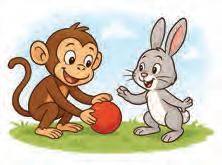

4. Fill in the blanks to form questions.
(a) you (get) angry yesterday?
(b) he (yell) at his brother when he gets angry?
(c) you (talk) calmly to your brother tomorrow?
(d) They walked away from a fight yesterday,
(e) Maya stays calm when her friend teases her,
(f) Ravi won,
(g) Ravi won’t tell Mum about the problem,

5. Fill in the blanks with the negative form of the verbs in brackets.
(a) Warli art (not have) many bright colours.
(b) The artists (not use) real mud walls anymore.
(c) Warli paintings (not show) animals like elephants.
(d) The tribe (not create) Warli art last year because of the festival.
(e) The teacher (not teach) Warli art tomorrow.
6. In your notebook, write a passage or story in about 50–60 words.
Start your passage or story with ‘How I…’ and use the correct verb forms as shown in the examples below. Choose one to begin your writing:
• How I help (present tense)
• How I helped (past tense)
• How I will learn (future tense)
Example prompts:
• How I help my family during holidays
• How I helped my mother find her lost ring
• How I will learn to play a musical instrument next year










Read the description below.
Last Saturday around 10 o’clock, Akira and her friends were planting a shrub in the school garden. They were watering it, and their teacher was watching from afar.
At the moment, they are visiting the garden again. They are checking how the shrub is doing. The teacher is showing them how to fertilise the plants.
This whole term, the students will be watching their garden grow beautiful. They will be watering their plants regularly and will be checking for pests. Soon, their plants will grow tall and give everyone joy.
Think about and discuss these questions.
1. Which verbs in the passage tell us about actions that were happening in the past? Which time word is used?
2. Which verbs in the passage tell us about actions that are happening now or in the present? Which time word is used?
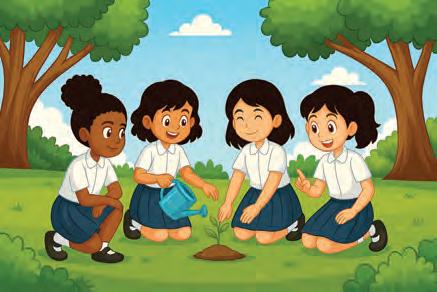
The continuous tense shows an action that is happening in the present, was happening in the past or will be happening at a certain moment in the future.
3. Which verbs in the passage tell us about actions that will be happening in the future? Which words suggest the future?
4. What do the -ing form of the verb tell us about all these actions?

The continuous tenses show actions that are in progress at a specific time. They are formed using an auxiliary (helping) verb + the base form of the verb + -ing.
Tense
Past Continuous Tense
It shows what was happening at or around a certain time in the past.
Time words: yesterday at…, last night at…, at 5 p.m. yesterday, etc.
Present Continuous Tense
It shows what is happening right now or around the present time.
Time words: now, at the moment, currently, today at…, etc.
Future Continuous Tense
It shows an action that will be in progress at a particular time in the future.
Time words: at this time tomorrow, at 6 p.m. next Friday, by that time, at that moment, etc.
Rule
Use was/were + verb + -ing
Use is/are/am + verb + -ing
Examples
Yesterday around this time, they were planting a shrub.
The teacher was watching them at that time.
I am working in the garden with my friends right now. We are planting a shrub now. At the moment, the shrub is doing well.
The students will be watching their garden grow the whole term.
Use will be + verb + -ing
At this time tomorrow, the students will be planting new flowers.
Note: Shall is rarely used in the future continuous tense. Nowadays, we use will with all subjects.
To make any continuous tense negative, just add ‘not’ between the auxiliary verb and the main verb.
Tense Rule
Past Continuous Tense
Present Continuous Tense
Future Continuous Tense
Subject + was/were + not + verb + -ing
Subject + is/are/am + not + verb + -ing
Subject + will + not + be + verb + -ing
Examples
They were not/weren’t planting a shrub.
The teacher was not/wasn’t watching them.
I am not working in the garden with my friends. We are not/aren’t planting a shrub now.
The shrub is not/isn’t doing well.
The students will not/won’t be watching their garden grow the whole term.

To ask a question in the continuous tense, move the auxillary verb to the front of the sentence.
Tense Rule
Past Continuous Tense
Questions with Tags
Present Continuous Tense
Questions with Tags
Was/Were + subject + verb + -ing + ?
Statement + (,) + auxiliary verb + pronoun?
Am/Is/Are + subject + verb + -ing + ?
Statement + (,) + auxiliary verb + pronoun?
Future Continuous Tense
Questions with Tags
Will + subject + be + verb + -ing + ?
Statement + (,) + auxiliary verb + pronoun?
Were they planting a shrub?
Was the teacher watching them?
They were planting a shrub, weren’t they?
The teacher wasn’t watching them, was she?
Am I working in the garden with my friends?
Are we planting a shrub now? Is the shrub doing well?
I am working in the garden with my friends, am I not?
We aren’t planting a shrub now, are we?
The shrub is not doing well, is it?
Will the students be watching their garden grow the whole term?
The students will be watching their garden grow, won’t they?
The students won’t be watching their garden grow, will they?
Note: A positive statement takes a negative tag and a negative statement takes positive tag.

Guess and Write in the Continuous


1. Form a pair.
2. Your teacher will call a pair to the front of the class. A student silently acts out an action such as writing, jumping, reading, clapping, etc. Then, points at a pronoun on the board.
3. The other students must identify the action and use the pronoun to say three sentences in the Present Continuous, Past Continuous and Future Continuous tenses using the action and the pronoun.
4. Keep playing until everyone has had a chance. For example:
Present Continuous She is reading a book right now.
Past Continuous She was reading a book yesterday evening.
Future Continuous She will be reading a book tomorrow afternoon.



1. Fill in the blanks with the correct continuous tense form of the verbs in brackets.
(a) Right now, we (study) the different parts of the brain in the biology class.
(b) Yesterday at this time, our teacher (explain) how the cerebrum controls our thoughts and actions.















(c) At the moment, students (draw) labelled diagrams of the human brain in their notebooks.
(d) During the group activity this afternoon, one team (prepare) a model while the other team (research) the functions of the cerebellum.
(e) Next week, we (present) our brain models in the science lab.
2. Fill in the blanks with the correct negative form in the continuous tenses.
(a) The students (not throw) papers on the floor right now.
(b) Yesterday, we (not waste) water while cleaning the classroom.
(c) From tomorrow, our class (not use) plastic bottles for drinking water.
(d) At the moment, the children (not clean) their desks.
(e) Last week, the helpers (not sweep) the classrooms because they were cleaning the hall.

3. Convert the following sentences into questions using the continuous tenses.
(a) I am unpacking my school bag in my room.
(b) Meanwhile, my mother is serving lunch for me and my brother.
(c) Earlier today, my grandmother and mother were cleaning the house.
(d) My brother and I will be watering the plants in the evening.
(e) My father will be bringing dessert while returning from the office today.
4. Complete the sentences using question tags.
(a) Firstly, the crow was picking up stones from the ground, ?
(b) Look, the crow is dropping stones into the pitcher, ?
(c) The other birds were watching the crow carefully, ?
(d) Now, the crow is drinking the water, ?
(e) The other crows will be admiring his cleverness, ?
5. Imagine you’re in a peaceful village, enjoying the day and writing about everything around you. In your notebook, write a short story using the continuous tenses to describe what is happening now, what happened earlier and what will be happening later.









Read the passage about a discussion at a school’s Young Explorers Club.
Teacher: So, Explorers, our end-of-year outing is coming up. What options have you explored so far?
Aarav: Our group has looked at visiting the ISRO Headquarters in Bengaluru.
Meera: I have visited the Space Exhibition Centre in Ahmedabad. If it is like that, it will be interesting.
Rani: I have just searched online for nature parks, and the Bannerghatta National Park looks awesome – it even has a butterfly garden!
Teacher: That sounds wonderful! What about you, Arjun?
Arushi: My dad has suggested that we visit Area 83 Adventure Resort. He says the kayaking and the giant swing over the lake are great fun.
Teacher: Great choices, everyone. You have given some interesting ideas. Let’s vote tomorrow and decide where our next adventure will be.
Think about and discuss these questions.
1. What are the students talking about in this conversation?
2. Find sentences where the students talk about things they have already done.
3. Look at these sentences:
• I have visited the Space Exhibition Centre.
• I have just searched online for nature parks.
Are these actions happening now or before now?
4. What helping words do you see before the action words?


The present perfect tense is used to talk about experiences or actions that started in the past and have recently been completed. These actions have a connection with the present.
Time words: just, already, yet, ever, never, so far
Past Present Future (action started in past and completed recently)
For example: What options have you explored so far? I have just searched online for nature parks. Have you ever visited the Space Exhibition Centre?
No, I have never been to the centre in Ahmedabad. I have already made a list of things we can do.
We, You, They
Have or has (auxiliary verb)+ past participle of the main verb
He, She, It
For example: You have just given some interesting ideas. She has already done her research.
Note: The time words come between the auxiliary (helping) verbs and the main verbs.
Note: Find the past participle form by saying: I have just + verb. For example: I have just gone.
The past participle of a verb is used to show an action that has been completed.
Regular Verbs (The past participle is formed by adding -ed or -d )
Regular Verbs (The past participle is formed by adding -ed or -d)
Irregular Verbs (The past participle is formed differently)
Irregular Verbs (The past participle is formed differently)
playplayedbakebakedgivegivenbuildbuilt walkwalked move movedeateatenreadread jumpjumpedcloseclosedwritewrittensingsung cleancleaneddancedancedknowknownbuybought helphelpedvisitvisitedspeakspokenteachtaught talktalkedwashwashedrunrunkeepkept openopenedstartstartedcomecomefindfound
playplayedbakebakedgivegivenbuildbuilt walkwalked move movedeateatenreadread jumpjumpedcloseclosedwritewrittensingsung cleancleaneddancedancedknowknownbuybought helphelpedvisitvisitedspeakspokenteachtaught talktalkedwashwashedrunrunkeepkept openopenedstartstartedcomecomefindfound

Forming Questions
Have/Has + subject + past participle? Have you explored different options? Has he visited the space museum?
• If the main sentence is positive (has/have), the tag is negative (haven’t/hasn’t).
Question Tags
• If the main sentence is negative (haven’t/hasn’t), the tag is positive (have/has).
You have explored different options, haven’t you?
He has explored different options, hasn’t he?
He hasn’t visited the space museum, has he?
They haven’t shared any interesting ideas, have they?
Forming Negatives
Subject + has/have + not + past participle
Use the simple past tense and NOT the past perfect when:
• a specific time in the past is mentioned or implied.
He hasn’t worked on the task. They haven’t come to a final decision.
For example: I went to the Space Museum yesterday. (simple past) I have gone to the Space Museum yesterday.
• referring to a definite past time or completed periods
For example: My dad worked there in 2020. (simple past) My dad has worked there in 2020

1. Sit on chairs in a circle. One student, without a chair, stands in the centre.
2. Everyone takes a minute to think of a fun question starting with: Have you ever…?
3. The student in the centre asks his/her question, Have you ever...?
4. Everyone who has done it must stand, swap seats and say, Yes, I have…
5. The student left without a seat becomes the next asker.
6. Those who remain seated say, No, I haven’t…





1. Tick ( ) the correct verbs to complete the sentences.
(a) Rani calls out, ‘Mummy, (has / have) the milkman (come / came) yet?’
(b) Her mother replies, ‘Yes, he (has delivered / have delivered) the milk already.’
(c) Then, Rani asks, ‘And the fruit and vegetables? (Has / Have) they (arrived / arrives)?’
(d) Her father says, ‘No, they (haven’t arrived / hasn’t arrived).’
(e) Rani then thinks, ‘I (have eat / have eaten) my oats, but I would have liked a banana as well.’
2. Fill in the blanks with the correct form of the verbs in brackets.
Deepika and her friends are having fun at the fair.
(a) They (dance) in the music tent for half an hour.
(b) Her friends (eat) hamburgers already.
(c) Deepika (buy) tickets for the big wheel, but she (not have) a chance to go yet.










(d) They (go) on the roller coaster twice today, but they (not try) the go-carts so far.
3. Complete the statements, questions and negatives using the present perfect tense.
Science Teacher: (a) your class (complete) the robot for the school science fair?
Class Teacher: No, Mahi (b) (not do) the coding yet.
Science Teacher: She and her friends have taken part in the science fair before, (c) they?
Class Teacher: I am not sure, but I know that they (d) (win) a few maths competitions.
Science Teacher: That’s great! I (e) (see) their teamwork, and they (f) always (impress) everyone with their ideas.
4. Fill in the blanks with the correct form of the verbs. Use the present perfect and the simple past.
(a) Vishesh (learn) many new things about the environment this year.
(b) He (read) a new book about animals yesterday.
(c) Vishesh’s family just (finished) planting trees in their garden.
(d) His classmates (complete) a science project on recycling last week.
(e) They (explore) different ways to save energy at school recently.
5. In your notebook, write a paragraph about the important things you have done, learnt, seen or experienced in your life up to now. You can use phrases such as…
• I have visited...
• I have learnt how to...
• I have met...
You can also mention things that you have not done but would like to do.

Time: 40 mins
Total: 25 Marks
1. Imagine you visit a mall and see your favourite journalist, actor or TV presenter! Write a short passage about what happened. Remember to include at least one declarative, interrogative, exclamatory and imperative sentence each in your writing.
• Describe who you saw and what they were doing.
• Write about how you felt.
• Add a funny, exciting or surprising moment – maybe you got a chance to meet the person or to see them interacting with others. (5 marks)
2. Underline the dependent clauses in blue and independent clauses in green. (1 × 5 = 5 marks)
Tina and Rohan went to an old house at the end of the street.
(a) They stayed inside the old house because the doors were locked.
(b) Tina was frightened when she heard footsteps upstairs.
(c) The candle flickered, and the shadows danced on the walls.
(d) Rohan and Tina ran out of the house in fear.
(e) We should never enter that room unless someone is with us.
3. Fill in the blanks using the clues in brackets. (¹/₂ × 10 = 5 marks)
Every morning, Shastri Ji (a) (practise) Kathak in the dance hall until his students come and join him so that they can (b) (learn) new steps. His students (c) (watch) carefully and try to copy his movements. He (d) (be) very happy to see their progress and (e) (explain) the importance of rhythm and using one’s body to express yourself.
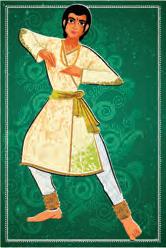
Last week, they (f) (perform) at a local cultural festival. Shastri Ji (g) (teach) the students to do make-up. During the performance, he (h) (encourage) them with a smile. Everyone (i) (enjoy) their performance.
Next month, they (j) (perform) at a national festival.
4. Fill in the blanks with the correct form of the verbs in brackets – present, past or future continuous tense. (1 × 5 = 5 marks)
Riya and her friends are preparing for the school annual day.
(a) Right now, Meera (decorate) the stage with colourful lights and flowers.
(b) Her friends (rehearse) a dance performance in the hall.
(c) At 2 o’clock yesterday, the teachers (guide) the students while they were practising their skits.
(d) At this time tomorrow, Meera (sing) a solo at the annual day.
(e) At this time next week, all the students (celebrate) the success of their show.
5. Fill in the blanks with the correct form of the verb in the present perfect tense. (1 × 5 = 5 marks)
Malvika loves reading her General Knowledge book every evening.
(a) She (learn) many new facts about the world from it.
(b) She (read) about different countries, animals and space.
(c) Malvika just (finish) a chapter on famous explorers.
(d) Her friends (join) her for the past few weekends.
(e) Together, they recently (discover) amazing things about nature and science.









Read the poem Bharat’s Ancient Knowledge.
Aryabhata’s mind had given the world the zero, Later used by every mathematical hero.
Eclipses he had explained with great delight, Which helped astronomers get it right.
Bharat’s healers had studied every flower, So Ayurveda gave us life’s healing power. The stars above, our rishis had read, Long before others looked ahead.

Think about and discuss these questions.
1. Look at lines 1 and 2 in stanza 1. What happened first – Ar yabhata’s discovering zero or mathematicians using it?
2. Which action in lines 3 and 4 happened first? What about in lines 5 and 6? And in lines 7 and 8?
3. Which auxiliar y (helping) verb is used with the verbs to show the actions that happened first?
4. Which tense is used in each case to show what happened next?

The past perfect shows an action that was completed before another past action or time.
The past perfect is formed by using had + past participle (V3).
We use the past perfect tense to show what happened first. It is often used with the simple past tense in a sentence.
Action 1
Aryabhata’s mind had given the world the zero. Action 2 The other mathematicians used it.
Think of the past participle as the form of the verb that shows a completed action.
Every day (V1) Yesterday (V2) Had already (V3) I go I went I had already gone
Past Present Future
For example: People used Ayurveda after healers had studied every flower. (later action, simple past) (earlier action, past perfect)
We use time words like after, before, by the time, never, ever, already, when, etc.
I did my homework after my friend had left.
I had already done my homework when my friend arrived. I had done my homework before my friend arrived. By the time my friend arrived, I had done my homework. When my friend arrived, I had done my homework. This friend had never visited me before.
Think and Tell
Read these sentences.
Note: The action that happened first is in the past perfect tense
When I arrived at the station, the train had left. Which action happened first? How would the meaning change if the sentence was: When I arrived at the station, the train left?
Forming Negatives
Subject + had not (hadn’t) + past participle
Use hadn’t for had not in contractions.
People had not/hadn’t understood eclipses before Aryabhata explained them. People had not/hadn’t understood the stars before then.

Forming QuestionsHad + subject + past participle?
Remember: If the main sentence is negative, the tag is positive (had). If the main sentence is positive, the tag is negative (hadn’t).
Statement + (,) + had/ hadn’t + pronoun?
Had people understood eclipses before that?
Had people understood the stars before then?
People had not/hadn’t understood eclipses before then, had they?
People had understood the stars before then, hadn’t they?


1. Play in pairs. Each player starts on a different arrow.
2. Take turns rolling the dice and move your token forward.
3. Land on a cue and say or write a sentence using the past perfect tense. Use time words like by then, not yet or already.
For example: Tina had already eaten the breakfast when I arrived.
4. If your sentence is correct, stay; if it is wrong, go back to start.
5. The first player to reach the end wins!
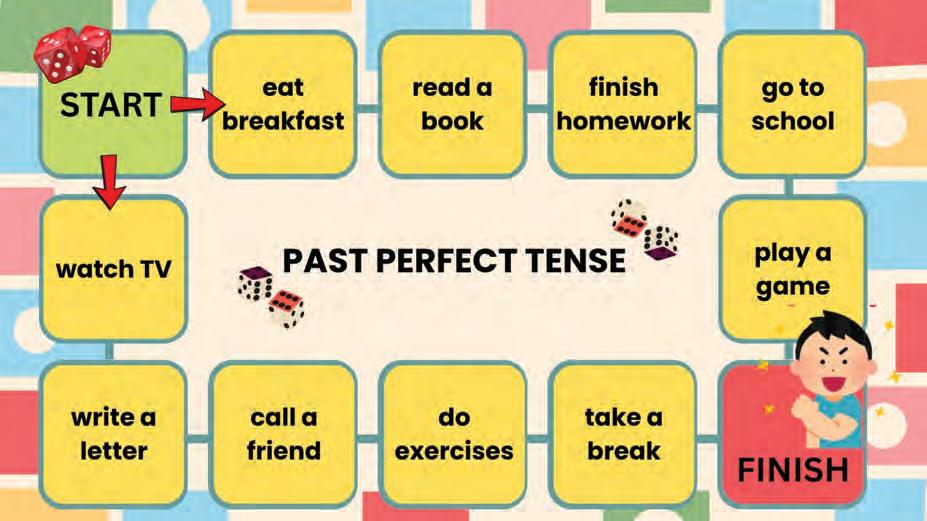



1. Tick ( ) the correct auxillary verbs to make the past perfect sentences.
(a) The leaders (had / hadn’t) decided the date for the Dandi March before it was launched, hadn’t they?
(b) Many people (had / hadn’t) heard Gandhi’s speech before joining the Dandi March, had they?
(c) Some freedom fighters (had / hadn’t) received any formal military training, had they?
(d) The British (had / hadn’t) understood the power of non-violent protest before the Salt March, had they?
(e) India (had / hadn’t) waited for freedom for nearly 200 years, hadn’t it?




2. Fill in the blanks with the simple past or past perfect tense.
(a) By the time the Onam celebrations (start), families (decorate) their homes with flowers and pookalams.
(b) The volunteers (arrange) the feast before the guests (arrive) for the Onam Sadhya.
(c) The children (practise) traditional dances before the main cultural program (begin).









































































(e) By evening, most people (light) lamps in their homes.







(d) The organisers (prepare) the stage and seating by the time people (gather)
3. Complete the story by filling in the blanks with the correct form of the verbs in brackets. Use the simple past or past perfect as needed.
Last night, a valuable necklace (a) (be) stolen from the museum. Detective Anjali (b) (arrive) at the scene to investigate. She (c) (talk) to the security guard first.
The guard said he (d) (fall) asleep just before the theft.
When Anjali checked the alarm system, she found that someone (e) (switch off) the alarms earlier. The museum staff

told her that the necklace (f) (display) in the main hall. Before the thief entered, the janitor (g) (clean) the floor and (h) (leave) the hall.
Anjali realised that by the time the guard (i) (wake up), the thief (j) (already escape) with the necklace.
4. Read the sentences in past perfect tense and rewrite them as per the given instructions.
(a) Ravi had struggled with maths before he found a fun method. (Question)
(b) By the time his teacher explained the rules, he had already figured them out. (Question)
(c) Ravi had never understood the multiplication of fractions. (Question tag)
(d) His friends had already helped him understand the concepts. (Question)
(e) Ravi hadn’t understood before his friends helped him. (Question tag)
5. Rewrite the sentences using the past perfect and the simple past tenses.
(a) Mother cooked food on Sunday. The family sat down to eat.
As soon as
(b) We ate the food. We cleared the table.
After
(c) Grandmother finished reading me a story. I fell asleep. before
(d) My brother returned home. It got dark. before
(e) My sister helped me with my homework. I went out to play.
After








Read the short story The Talking Cactus.
Reeva’s father bought her a talking cactus. She clapped and said, ‘Wow, Papa! Can it repeat what I say?’
Reeva said, ‘I am eating a mango!’
The cactus replied, ‘A mango is being eaten by me!’
Reeva looked confused. ‘Err... I think it said something else.’
Think about and discuss these questions.
1. Read the two sentences:
• I am eating a mango.
• A mango is being eaten by me.
The subject (S) is who/what does the action. The predicate (P) is what is being said about the subject.
Do the sentences mean the same thing, or are they different?
2. Now, circle the subject and underline the predicate in both the sentences.
3. What do you notice about the subject in these two sentences?

Active VoicePassive Voice
In the active voice, the subject of the sentence does the action (doer). In the passive voice, the object (receiver) becomes the subject. The focus is on the action, not on who/what is doing it.
A mango is being eaten by me. For example:
(V) (O) (O) (V) New (S) I am eating a mango.

In the passive voice, we use a form of the verb ‘to be’ (is/are/was/were/being) + the past participle (V3) of the main verb.
For example: The teacher reads the story. (Active Voice)
The story is read by the teacher. (Passive Voice)
When changing from active to passive voice:
• subject pronouns (I, you, he, she, it, we, they) become object pronouns (me, you, him, her, it, us, them).
Note: The tense stays the same → only the verb form changes to form the passive voice.
• the object of the active sentence becomes the subject of the passive sentence.
• The doer is introduced using ‘by’.
For example: Active Voice
He tore her book.
She donated the cake. They invited me.
Passive Voice
Her book was torn by him
The cake was donated by her. I was invited by them.
Note: If we want to stress the action rather than who did the action, we can leave out the object in the passive sentence.
For example: Ajit tore Reeva’s book. Reeva’s book was torn. Sarvesh’s mom donated the cake. The cake was donated.
Tense
Active Voice
Simple Present The chef cooks the meal.
S + V1(s) + O
Present Continuous The teacher is reading the story.
S + is/are/am + V1 + ing + O
Simple Past The children cleaned the room.
S + V2 + O
Past Continuous The guard was watching the gate.
S + was/were + V1 + ing + O
Simple Future Ravi will write the report.
S + will + V1 + O
Modals He should complete the project.
S + modal verb + V1 + O
Passive Voice
The meal is cooked by the chef.
New S + is/are/am + V3 + by + O
The story is being read by the teacher.
New S + is/are/am + being + V3 + by + O
The room was cleaned by the children.
New S + was/were + V3 + by + O
The gate was being watched by the guard.
New S + was/were + being + V3 + by + O
The report will be written by Ravi.
New S + will + be + V3 + by + O
The project should be completed by him.
New S + modal verb + be + V3 + by + O
Note: In each example above, notice the swap in sentence structure. The object of the active sentence becomes the subject in the passive sentence.

Think and Tell
Imagine that the teacher has been told who misbehaved when she was out of the class, but she does not want to mention the names. How would you complete what she says when she returns?
I am upset by what I see. The library books (scatter) everywhere, one curtain (tear) and some posters (lying) on the floor.

1. Roll the dice.
2. Even number Look at the picture and make an active sentence. Your sentence must have a clear subject, verb and object.
3. Odd number Look at the picture and make a passive sentence.
4. If you land at the bottom of a ladder, go up. If you land on the mouth of a snake, go down.
5. The first person to reach FINISH wins!
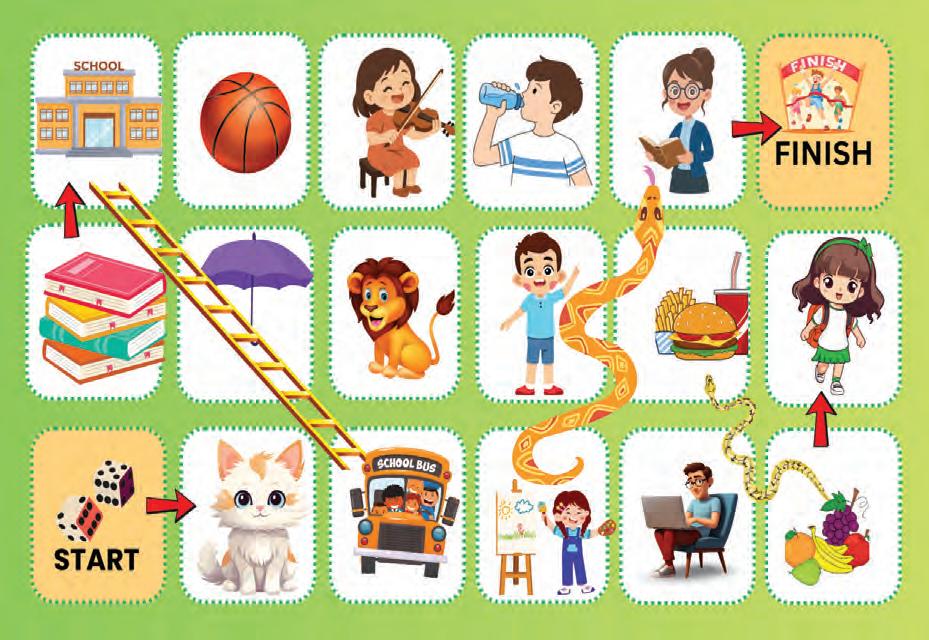




1. In each sentence, underline the subject in green and the object in blue. Write ‘A’ if the sentence is in the Active Voice or ‘P’ if it is in the Passive Voice.
(a) The teachers arranged games and races for the students.
(b) The winners were cheered on by their friends.
(c) The choir sang the school anthem.
(d) Refreshments were served by the volunteers.
(e) The principal delivered a short speech to conclude the event.
2. Fill in the blanks with the correct passive form of the verbs.
(a) I made a mistake in my homework.
A mistake in my homework by me.
(b) My teacher notices my mistake. My mistake by my teacher.
(c) She guides me to correct it.
I by her to correct it.
(d) My friend encouraged me to try again.
I by my friend to try again.
(e) In the end, I complete the work correctly. The work correctly by me.
3. Complete the sentences using the correct passive form of the verbs and their tenses given in brackets.
(a) The magical book (discover) by a curious boy. (simple past)
(b) The book of spells (hide) in the forests by a wizard. (simple past)
(c) The clues (decode) by the boy and his friends. (simple past)
(d) The secret entrance (guard) by a dragon. (past continuous)
(e) The final spell (write) in glowing letters by the ancient book itself. (simple past)

4. Read the sentences in the active voice. In your notebook, rewrite them in passive voice.
(a) The NGO provided the village with clean water.
(b) The workers built a new water tank.
(c) The villagers were cleaning the wells.
(d) The teacher spread awareness about washing hands.
(e) The children are following safe drinking habits.
5. The head of the Police Department has a message about a golden jewel, which has gone missing! He calls two officers:
• Activatio The hardworking agent. If the Head talks to Activatio, you complete the sentence in the Active Voice.
• Passimo The lazy police officer. If the Head talks to Passimo, you complete the sentence in the Passive Voice.
Rewrite the sentences in the correct voice.
(a) Head: The thief stole the golden jewel.
Passimo: The golden jewel by the thief.
(b) Head: The museum lock was broken by the thief.
Activatio: The thief the museum lock.
(c) Head: The guards saw the thief leaving the hall.
Passimo: The thief leaving the hall.






(d) Head: The manager found the jewels missing from the safe.





(e) Head: The police were alerted by the alarm.
Activatio: The alarm the police.
(f) Head: I was informed immediately by the manager.
Activatio: The manager me immediately.















Passimo: The jewels missing from the safe by the manager.














Look at how Kamil reports the message to his sister immediately after his mother has left.
Kamil, tell Nisha that Sunil is visiting from Coorg. I have made him some burfi She must take it to him.
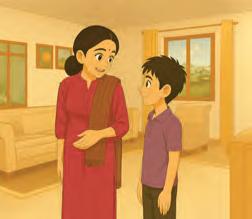
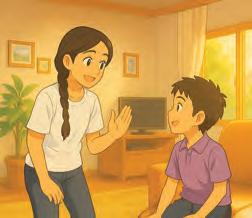
Think about and discuss these questions.
1. Whose message does Kamil pass on to his sister?
2. Which differences do you see between the original message and the message that Kamil passes on?
3. Why are these changes necessary?

Nisha, Mom says that Sunil is visiting from Coorg. She has made him some burfi. You must take it to him.
The subject of a sentence must agree with the verb used. For example: She has ... I have
The words a person speaks are called direct speech. It can be shown in different ways:
Using quotation marks
As mother was leaving, she said, ‘Kamil, go and tell Nisha that Sunil is visiting from Coorg.’
In dialogue format
Mother: Kamil, go and tell Nisha that Sunil is visiting from Coorg.

As a speech bubble Kamil, go and tell Nisha that Sunil is visiting from Coorg.
Reported or indirect speech is used when someone else reports what a speaker says.
For example: Mother tells Kamil to go and tell Nisha that Sunil is visiting from Coorg.
Look at how a sentence changes when a report is made immediately after the words are spoken.
Speech
Mother says, ‘I have made some burfi for Sunil.’
• In direct speech, there is a comma after the introductory verb says.
• Mother speaks. She uses the pronoun I and the matching verb have.
• The words spoken are in ‘quotation marks’. The full stop comes inside.
I
Mother says that she has made some burfi for Sunil.
• If the words are reported immediately, use says that or asks if to show who speaks.
• Remove the quotation marks.
• The pronouns and verbs may change: I changes to she. The verb has changes to match the new pronoun.
Direct SpeechReported or Indirect Speech
Mother says, ‘I have made burfi.’
You (singular)
Kamil asks, ‘Will you make burfi?’
He/She/It
Kamil says, ‘He/She will make burfi.’
We
Mother says, ‘ We will make burfi’.
They
Kamil says, ‘ They will make burfi.’
He/She/It
Mother says that she has made burfi.
He/She/I/You
Kamil asks if he/she/I/you will make burfi.
Depending on the context, the pronouns may stay the same.
Kamil says that he/she will make burfi.
They Mother says that they will make burfi.
Depending on the context, the pronouns may stay the same. Kamil says that they will make burfi.
The verb may change to agree with the subject. For example: I have made becomes she has made
Don’t change the tense if it’s a general truth or fact.
Wrong: She says that the earth was round.
Correct: She says that the earth is round.



1. Write your name and information about yourself on a paper. Look at the example.
2. Hand in your paper. Your teacher will redistribute them to different learners.
For example:
Name: Nisha
My favourite activity is drama.
I like it because we learn to act on stage.
3. Sit in a circle and pass the ball. When you get it, introduce the person on the paper you received.
4. Continue until everyone has had a turn.

Nisha says her favourite activity is drama. She says that she likes it because they learn to act on stage.


1. Read the dialogue and use the words in the box to complete the dialogue. Kashika listens to what Simran and Anuj are discussing.
Simran: I went to Coorg this weekend. We stayed in a hotel. Anuj: I love Coorg. My family went there last year.
Rakesh arrives and asks Kashika what the two friends are talking about.
he she his they
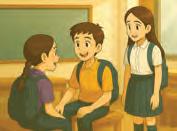
(a) Simran says that went to Coorg this weekend. stayed in a hotel.
(b) Anuj says that loves Coorg and adds that family went there last year.
2. Read what Rakesh says. Circle the correct options to complete a report of what he says.
‘Coorg is famous for its coffee. My mother bought great coffee there,’ says Rakesh.
‘ We all like strong coffee,’ he adds.
(a) Rakesh says that Coorg (is / are / am) famous for its coffee.
(b) He says that (his / her) mother bought great coffee there.
(c) He added that (we / they) all like strong coffee.




3. Two friends are talking about a trek. Choose the correct options to complete the report of what they say.
Nisha says, ‘I love trekking in the Himalayas.’
Kanika says, ‘ We often go to Nag Tibba for a weekend.’
‘I know Nag Tibba. My family often goes trekking there,’ replies Nisha.
(a) Nisha says that she (love/loves) trekking in the Himalayas.
(b) Kanika says that (we/they/I) often go to Nag Tibba for a weekend.
(c) Nisha replies that she (know/knows) Nag Tibba and adds that (their/her/my) family often (go/goes) trekking there.

4. Read what Shefali Verma tells you about herself.
I was born in Rohtak in Haryana. When I was younger, I loved playing cricket with my brother and the other boys in our neighbourhood. My mother had to cut my hair so I could play on a boys’ team. When I was just 15 years old, I played my first international game for India. Since then, I have played all over the world.

Complete the speech you will give at your school assembly. Hello everyone, I would like to introduce Shefali Verma to you.
She was born in Rohtak in Haryana. When (a) was younger, she (b) playing cricket with (c) brother and the other boys in (d) neighbourhood. (e) mother had to cut (f) hair so (g) could play on a boys’ team. When (h) was just 15 years old, she played (i) first international game for India. Since then, she (j) played all over the world.
5. Read the story and answer the questions by converting the sentences into direct or indirect speech as needed.
Five students are cleaning their classroom. Rohan says, ‘We should clean the windows first.’ Meera tells them, ‘I will sweep the floor.’ Arjun asks, ‘Can I wipe the desks?’
Kabir says, ‘We will work together and finish quickly!’
(a) Rohan suggests that .
(b) Meera tells them that .
(c) Arjun asks if .

(d) Finally, Kabir says that .
6. Read what Charu and Avik say and report it.
(a)
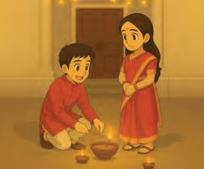
I love lighting diyas at Diwali.
(b) Our lights look super!

Charu says that Avik says that

7. You and your friends discuss how to protect the environment. Write a paragraph to tell your teacher what each person says.
We should plant more trees to clean the air.

We turn off the lights when we leave a room.
My family recycles paper and plastic.


Can we organise a clean-up drive?
I want to make posters to make people more aware.

Aarav says that they should plant more trees to clean the air. Priya adds










Read what the principal announces at the assembly.
‘It is Maths Puzzle Day! You will solve puzzles in your classes. Yesterday, you cracked the number maze, and the class 4 students won. Today, your teacher has maths puzzles and riddles for you and there are big prizes!’

Ritika has been absent for a week. Look at how Manu reports what the principal said the previous week.

The principal announced that it was Maths Puzzle Day and that we would solve puzzles in our classes. She said that we had cracked the number maze the day before, and the class 4 students had won. She added that our teacher had maths puzzles and riddles for us that day and that there were big prizes.
Think about and discuss these questions.
1. What do the quotation marks used at the beginning and end of the first paragraph show?
2. What changes do you notice in punctuation between the announcement and the report?
3. Did the announcement and the report happen at the same time? How do you know?
4. How have the pronouns changed in the report?
5. Have the tenses changed from the actual words to the report? Give two examples.

We already know that pronouns, their matching verbs and the punctuation change when we give a written report of the direct words of a person immediately after the words are spoken.

When the report is made later, for example the next day, more changes are needed as the time of the report changes completely.
Since the reporting happens later, we begin the report with a past tense verb: For example:
The principal announces, ‘It is Maths Puzzle day.’
She says, ‘Yesterday, you cracked the number maze.’
She adds, ‘There are big prizes.’
The principal announced that it was Maths Puzzle Day.
She said that we had cracked the number maze the day before.
She added that there were big prizes.
Other common reporting verbs are replied that, explained that, declared that, promised that, etc.
When we report questions, we use verbs like asked if/whether, enquired if/whether, wanted to know if/whether.
The principal announces, ‘It is Maths Puzzle Day.’ (Simple present)
She says, ‘Your teacher has maths puzzles.’ (Simple present)
Manu says, ‘The principal is speaking.’ (Present continuous)
Manu asks, ‘Are the children listening?’ (Present continuous)
The principal asks, ‘Have you completed the maze, Manu?’ (Present perfect)
She says, ‘The class 4 students won.’ (Simple past)
Note: We use that for statements and if/ whether with questions.
The principal announced that it was Maths Puzzle Day. (Simple past)
She added that our teacher had maths puzzles. (Simple past)
Manu said that the principal was speaking. (Past continuous)
Manu asked if the children were listening. (Past continuous)
The principal asked if Manu had completed the maze. (Past perfect)
She added that the class 4 students had won. (Past perfect)
When we change direct speech into reported speech, modals usually change to their past form.
• ‘You will solve puzzles in your classes,’ said the principal.
• ‘I am going to my class soon,’ said Manu.
• ‘You can come with me,’ said Manu.
• ‘Must I go with you immediately? asked Ritika.
• The principal said that we would solve puzzles in our classes.
• Manu said that he was going to his class soon.
• Manu said that I could go with him.
• Ritika asked if she had to go with him immediately.
Note: Modals that already show the past tense do not change: would, could, might, had to, etc.
These changes are necessary because the report may be made after a day or two. this → that tonight → that night these → those yesterday → the day before today → that daylast week → the week before here → there (a month) ago → (the month) before now → then tomorrow → the next day this morning/evening → that morning/evening next year/week → the following year/ following week
Friday
I am going to football practice today
Reported the next week: He told me that he was going to football practice that day


1. It is sports day and another school is visiting. Write one sentence on a slip of paper about something interesting, shocking or funny that you saw. It can be a statement or a question, and you may use any tense.
2. Your teacher will collect and redistribute the slips of paper among the students.
3. Every student will get a turn to report what an eyewitness said or asked. For example: ‘Rohan trips on the football field.’ An eyewitness said that Rohan tripped on the football field.


1. Tick( ) the correct words to complete the report of what happened in class.
Anya: My library book is missing.
Josh: It was lying on your desk this morning.
Teacher: I gave it to the librarian at lunchtime.
Anya: Thanks ma’am, I will go and ask her tomorrow.
(a) Anya said that (her / my) library book (is /was) missing.
(b) Josh said that it (had been / were) lying on her desk that morning.
(c) The teacher said that (she / I) had given it to the librarian at lunchtime.
(d) Anya thanked her teacher and said that she (will /would) go and ask the librarian (the next day / tomorrow).
2. Read what students say about their holiday plans.
Satish says, ‘We will be leaving for Bengaluru this afternoon.’
‘I am going to visit my grandmother next week,’ says Meera.
Ashish asks, ‘Where are you going, Manisha?’
Manisha replies, ‘I may go to Chennai, but I am not sure yet.’
Ashish says, ‘My family is visiting friends in Kashmir. We will leave next week.’
Imagine that you have listened to your friends talking the previous day and that you tell another friend what everyone said. Fill in the blanks.
Satish said that they (a) be leaving for Bengaluru (b) afternoon.
Meera said that (c) (d) going to visit (e) grandmother the (f) week.
Ashish asked Manisha where (g) (h) going.
Manisha replied that she (i) go to Chennai, but that she (j) not sure yet.
Ashish ended off by saying that (k) family (l) visiting friends in Kashmir and that they (m) leave the (n) week.

3. Read what a group of students say about how to perform a science experiment.
‘We have a battery, a small bulb and two wires.
We connect the first wire to the positive terminal and the second wire to the negative terminal of the battery. Then, we link the other ends of the wires with the bulb. The bulb lights up.
The light dies if we disconnect one wire from the battery.’



Fill in the blanks to tell a friend who was absent what they explained.
The group explained that they (a) a battery, a small bulb and two wires. They (b) the first wire to the positive terminal and the second wire to the negative terminal of the battery.
Then, (c) (d) the other ends of the wires with the bulb.
The bulb (e) up.
They noted that if (f) (g) one wire from the battery the light (h)
4. Read what the judge says about the artworks of students at an art competition. ‘I want to congratulate everyone who has submitted their work. You all show great enthusiasm. I am especially impressed by Aarav Singh’s traditional piece. Aarav, you will have a great future if you keep up the good work.
Finally, if you invite me in future, ma’am, it will be my pleasure to come again.’
When Aarav’s dad returns home a week after the competition, Aarav tells him what the judge said. Fill in the blanks.
The judge said that he (a) to congratulate everyone who (b) submitted their work. He said that (c) all (d) great enthusiasm. The judge then said that he (e) especially impressed by (f) traditional piece. He added that I (g) have a great future if I (h) up the good work. Finally, he told the principal that if she (i) (j) in future, it (k) be his pleasure to come again.
5. It is your school Annual Day event. You are a part of the audience watching all the performances. In your notebook, write what you heard members of the audience say after the school performance. Begin your paragraph with: ‘One parent said that…’










Read the conversation below.
Arpit: Dad, I’m reading some information about Venus in our school newsletter, but this sentence looks confusing.
Dad: Oh! Let me see.
Arpit: It says, ‘ Venus is the brightest planet it can be seen just before sunrise.’
Dad: Ah, there's a printing error! The sentence needs proper punctuation. It should be, ‘ Venus is the brightest planet. It can be seen just before sunrise.’
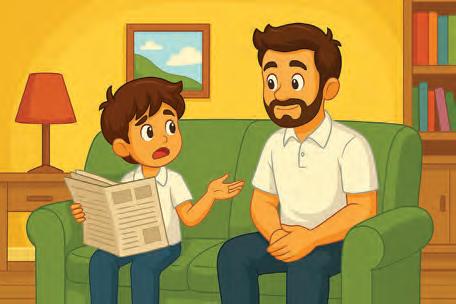
Arpit: That makes sense now. No wonder it sounded strange earlier!
Think about and discuss these questions.
1. Why did Arpit find the sentence about Venus confusing?
2. How does using full stops or capital letters make a sentence easier to read?
3. What does the apostrophe in 'I’m' stand for?
4. What kind of feeling do we usually show when we use an exclamation mark (!) at the end of a sentence?

Punctuation marks are special signs that help readers understand writing better by showing where to pause, stop or show feeling. They make sentences clear, organised and more expressive.
Punctuation
Marks Uses Examples
Capital Letters
• To start every new sentence
• The pronoun I is always capitalised
• Capitalise the days of the week and months of the year
• Capitalise proper nouns (names of people, places, countries, languages, titles, books, films, nationalities, religions, programmes, events, etc.)
Venus is the brightest planet. Dad, I'm reading about Venus. Arpit read about Venus on Friday.
Mount Everest is a challenging climb.
Full Stop (.)
Comma (,)
Question
Mark (?)
Exclamation
Mark (!)
Apostrophe (’)
Inverted Commas (‘ ’)
• Used to mark the end of declarative sentences Venus can be seen just before sunrise.
• Used to separate items in a list (Do not use a comma before and/or.)
• Used after Yes or No at the beginning of a sentence
• Used before or after someone’s name while addressing them
• Used before a conjunction when joining two independent clauses (complete sentences that can stand alone)
• Used between two or more adjectives that equally describe a noun
• Used to separate the introductory word/phrase from the main sentence
We learnt about Mercury, Venus and Mars in science class.
Yes, Venus is the brightest planet in the night sky.
Simran, could you please pass me the book on planets?
I wanted to watch the solar eclipse, but the sky was cloudy.
It was a bright, glowing planet in the sky.
At dawn, Venus could be seen shining near the horizon.
• Used at the end of an interrogative sentence Which is the smallest planet in the solar system?
• Used at the end of exclamatory sentences to show surprise, excitement or strong feeling
• Used after interjections
• Used to show possession
• Used to form contractions
• Used in direct speech to show the exact words someone says
• Used to highlight/quote a word or a phrase for emphasis
• Used to show a title in a sentence
Wow, Venus is so bright tonight!
Ah! There’s a printing error.
Venus’s surface is covered with thick clouds.
It’s the brightest planet in the sky.
Arpit said, 'Venus is the brightest planet in the sky.'
The word 'planet' comes from a Greek word.
I read an article called 'The Morning Star: Facts About Venus.'



1. Divide the class into two teams.
2. Each team gets one sentence from the teacher with missing punctuation. For example: wow what a beautiful rainbow
3. A student from the team must rewrite the sentence correctly on the board.

Punctuation Relay
4. If the answer is correct, the team earns 1 point. If it is wrong, the other team gets a chance to correct the sentence and steal the point.
5. The team with the most points at the end wins.



1. Fill in the blanks with the correct punctuation marks.
(a) Last week, our class attended a seminar on climate change
(b) The speaker said, The Earth is getting hotter every year.
(c) He asked, ‘Do you know what causes global warming ’
(d) Many students shouted, ‘Climate change ’
(e) Wow What a great session.
(f) Each student s effort counts in protecting the environment.
(g) Don’t forget to reduce reuse and recycle.
(h) Children’s actions can make a big difference







(a) one day a poor slave was carrying water to his masters house.



2. Underline the errors in the sentences. Rewrite the sentences correctly using capital letters, full stops, commas, question marks, exclamation marks, apostrophes and inverted commas where needed.
(b) Suddenly he saw a lion coming towards him
(c) the slave thought, ‘oh no what will I do?’
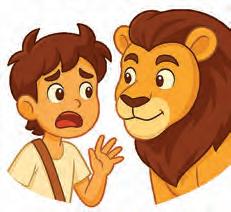
(d) The lion roared and the slave said Please forgive me! I did not mean to disturb you
(e) the lion replied I will not hurt you In fact I need your help to remove a thorn from my paw
(f) the slave carefully pulled out the thorn and the lion quietly walked away

3. Surabhi wrote a report about the Arjun Erigaisi vs Gukesh Dommaraju chess match. Some sentences have punctuation mistakes. Rewrite the report correctly in your notebook.
Arjun Erigaisi vs Gukesh Dommaraju by surabhi goyal
new delhi, 9 september 2025
yesterday i watched an exciting chess match between arjun erigaisi and gukesh dommaraju it was amazing the players were very focussed and they moved their pieces carefully arjun shouted, checkmate! and everyone cheered did you know that arjun is only 20 years old the commentator said that he is very talented wow what a match
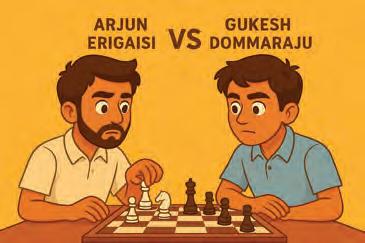

Time: 40 mins
Total: 25 Marks
1. Complete the story by filling in the blanks with the correct form of the verbs in brackets. Use the simple past or the past perfect tense as needed. (¹/₂ × 8 = 4 marks)
Last weekend, a heavy storm (a) (hit) the small town of Riverview. Most people (b) (go) home by the time the rain started. Maya and her brother Rohan (c) (plan) to watch a film, but by the time they reached the theatre, it (d) (already close).
They (e) (decide) to take shelter in a nearby cafe. The cafe owner told them that lightning (f) (damage) the power lines earlier that evening. They (g) (wait) for the rain to stop. When Maya wanted to book a cab, she realised that she (h) (leave) her phone at home.
2. Read the sentences carefully. Rewrite all the sentences in the passive voice. (1 × 5 = 5 marks) (a) Last Friday, the students visited the newly opened Science Museum in Delhi.
(b) The museum guide showed them the robotics section and the 3D theatre.
(c) Arjun took many pictures of the space exhibits.
(d) Some students asked questions about experiments.
(e) The teacher explained the importance of scientific learning.
3. Read what Rahul Dravid tells you about himself. (1 × 5 = 5 marks) I was born in Indore, Madhya Pradesh. When I was young, I loved playing cricket and dreamt of wearing the Indian jersey one day. I worked hard and played for the
Indian cricket team for many years. People called me ‘The Wall’ because of my strong defence. After retiring, I started guiding young players and continued to support the development of cricket in my country, India.
Now, fill in the blanks to complete the speech you will give to introduce him at your school assembly.
Hello everyone,
I want to tell you about Rahul Dravid, one of India’s greatest cricketers.
He was born in Indore, Madhya Pradesh. When (a) was young, (b) loved playing cricket and dreamt of wearing the Indian jersey one day. He worked hard and played for the Indian cricket team for many years. People called (c)
‘The Wall’ because of his strong defence. After retiring, (d) started guiding young players and continued to support the development of cricket in (e) country, India.
4. You are sitting in a stadium watching different races and games. Later, you decide to write what you heard members of the audience say after the Sports Day. Write FOUR sentences in reported speech.
Begin your paragraph with: One student said that… (5 marks)
5. Complete the story by filling in the correct punctuation marks. (¹/₂ × 12 = 6 marks)
Yesterday morning my brother ran into the house shouting, Someone has taken my bike ’ Mum asked ‘Are you sure you locked it ’ He nodded and said, ‘Yes I locked it near the park ’ Dad looked worried and said, ‘Let’s go and check. Maybe someone moved it.’ When we reached the park the bike was gone ‘Oh no What will we do now ’ I said. Dad replied, ‘We’ll go to the police station They’ll help us find it.’

Collective Nouns
A collective noun names a collection or a group of people, animals or objects considered as a single unit or whole.
A team of athletes
A group of friends
A crowd of fans
A band of musicians
A staff of teachers
A choir of singers
A gang of robbers
A panel of judges
A crew of helpers
Animals
A herd of cows
A flock of sheep
A swarm of insects
A pack of wolves
A gaggle of geese
A brood of hens
A nest of snakes
A litter of puppies
A colony of ants
A committee of membersA parliament of owls
Abstract Nouns
Objects
A bunch of keys
A stack of books
A bundle of sticks
A set of tools
A pile of clothes
A group of islands
A string of pearls
A collection of stamps
A deck of cards
A cluster of stars
Abstract nouns name things we cannot see or touch, such as feelings, qualities or ideas.
Abstract Nouns for Feelings/EmotionsAbstract Nouns that Name Qualities or Traits
Pride Her pride in winning showed in her smile.
Fear
Anger
HonestyHonesty is the best policy.
He ran away in fear when the dog chased him. Bravery
His anger melted when his friend apologised. Patience
Hope There is hope that tomorrow will be a better day.
The firefighters showed great bravery.
You need patience to learn something new.
Abstract Nouns for Ideas or Concepts
Joy The children jumped with joy when it started raining. KnowledgeReading helps us gain knowledge.
Love
Sadness
Surprise
Worry
A mother’s love for her child never ends. Truth
He felt sadness when his best friend moved away. Peace
The birthday gift came as a big surprise.
Freedom
My worry disappeared when I saw my good results. Democracy
Vocabulary 1 • Collective and Abstract Nouns
Always speak the truth, even if it is difficult.
The villagers lived together in peace.
We celebrate our freedom on Independence Day.
In a democracy, people choose their leaders.
Prefixes are added to the beginning of root words to change their meaning by: showing opposites unhappy, invisible, illegal, irregular, antisocial, misunderstand, misbehave, nonsense, impolite
showing number unicorn (one horn), tricycle (three wheels), millimetre (one-thousandth of a metre)
showing time or order pre-independence, prehistoric, postpone, post-lunch, ex-president, foretell, biweekly
showing degree or size superfast, overcook, underpaid, ultrasoft, extra-large
showing location or position subway, submerge, interchange, international forming verbs enlarge, empower, enable, enrich, defrost
Suffixes are added to the end of root words to change their meaning, form or function by:
changing verbs to nouns development, argument, invention, creation
changing nouns to adjectives wonderful, helpful, famous, dangerous forming abstract nouns kindness, childhood, friendship, happiness showing profession or roles teacher, actor, artist, magician
changing adjectives to adverbs softly, bravely, politely, eagerly forming verbs organise, strengthen, simplify
Note: If a root word ends in -y, change -y to -i, and if it ends in -e, drop the -e before adding the suffix. For example: fry – fried, happy – happiness, use – usable, make – maker, etc.

1. Fill in the blanks by adding the correct prefixes (un-, em-, pre-, in-, inter-).
At one stage, poverty was a big problem in villages. Many people were (a) (employed) and lived in poorly built houses that were (b) (safe). Villagers stood up against (c) (fair) practices and wanted everyone to have food and education. The government started many programmes to (d) (power) villagers and did enough (e) (planning) to ensure that the programmes would work. Some (f) (national) companies provided support to fight hunger. Even after all these efforts (g) (equality) remains a challenge.

2. Read the passage below about a village fair. Add the correct suffixes to the words given in brackets to complete the story.
Last Sunday, our village had a big fair. It was very well (a) (organise). At the entrance, there was a shop selling (b) (colour) cotton candy. Children had a (c) (wonder) time watching the (d) (magic) who was doing all kinds of tricks.
Nearby, a big (e) (move) ferris wheel turned round and round. People shouted (f) (excited)
At the food stalls, the sweet smell of hot (g) (fry) jalebis filled the air. The shopkeeper greeted the customers (h) (polite). Many families tasted the snacks (i) (eager).
The fair was safe and well-organised. Everyone returned home feeling tired but (j) (cheer).
3. Imagine you are at a village fair. You hear an announcement about a new sweet shop or a new ride. Write a short announcement using at least five words with prefixes or suffixes. You may also present your final announcement in class.
Vocabulary 2 • Prefixes and Suffixes
Idioms are special phrases that have a meaning that is different from the meaning of the actual words. The words may say one thing, but they mean something else. Idioms are often used in everyday language to describe situations in a fun, imaginative or indirect way.
A piece of cakevery easy
To get cold feet to feel nervous before doing something
In hot water to be in trouble
To hit the books to study hard
Keep your chin up stay positive
Hit the nail on the head to say or do something exactly right
The exam was a piece of cake.
She got cold feet before her first performance.
He was in hot water for not doing his homework.
I need to hit the books for my examinations.
Keep your chin up, you still have the final exams to prove yourself.
She hit the nail on the head when she spoke about the challenges.
Under the weatherfeeling sick or unwell I’m staying home today as I’m feeling under the weather.
Let the cat out of the bag to reveal a secret
She let the cat out of the bag about the surprise party.
Spill the beans to reveal secret information Don’t spill the beans about our plan!
Costs an arm and a leg very expensive
Once in a blue moonvery rarely
That designer bag costs an arm and a leg.
We watch movies together once in a blue moon.
Burn the midnight oilto work late into the night He burnt the midnight oil to finish the report.
On cloud nineextremely happy
Break the iceto start a conversation in a social setting
Bite your tongue to stop yourself from saying something
She was on cloud nine after getting the job.
He told a joke to break the ice at the party.
I wanted to argue about the project, but I bit my tongue.

1. Match the idioms and the situations.
(a) Costs an arm and a leg •
(b) Burn the midnight oil •
• Anya stayed up late decorating the house for Pooja the next day.
• Tina stayed positive even though she lost the race.
(c) Keep your chin up • • Sam wanted to argue with his friend but stopped himself.
(d) Under the weather •
(e) Bite your tongue •
2. Fill in the blanks using the idioms.
• Rahul wanted to buy a new gaming console, but it was very expensive.
• Meera was sick and stayed home.
Mihika: Hey Sam! Did you finish rehearsing for the play?
Sam: Yes! Practising the script was a (a) compared to the last time.
Mihika: Don’t tell anyone yet. I don’t want to (b) about the surprise scenes.
Sam: Oops! I think I just (c) about the twist in the play!
Mihika: That’s okay! By the way, did you see the new costumes? They are very fancy and I am sure that they (d) !
Sam: Wow! We only buy new costumes (e) , so no wonder everyone’s excited this time.
Mihika: I stayed up late to rehearse my part. I had to (f) to get it right.
Sam: I bet you’ll be (g) when everyone applauds.
3. Rewrite the passage by replacing the underlined parts with a suitable idiom.
Even though I had studied hard before the exam, I was nervous. I tried to stay calm. First, I was in trouble because I had forgotten my pencil box and then I felt sick during the exam and couldn’t focus. I was extremely happy when I finally finished writing.
Homophones are words that sound the same but have different meanings and spellings.
The knight rode on his horse.
My feet are sore after walking.
We saw stars in the night sky.
Climbing the mountain was a great feat.
I don’t know whether to stay or go. The weather is sunny today.
We all want peace in the world.
The sole of my shoe is worn out.
She looked pale after playing in the sun for hours.
Please give me a piece of cake.
Music touches the soul.
The boy filled a pail with water from the well.
Talking is not allowed in the library.She read the story aloud
The teacher wrote on the board. I feel bored on rainy days.
He rode his bicycle to school.
The road is very busy today.
Homographs are words that are spelt the same but have a different meaning and sometimes a different pronunciation.
He will bow to the queen. (rhymes with ‘now’)
She tied a bow in her hair. (rhymes with ‘go’)
She will lead the team. (sounds like ‘need’) The pipes are made of lead (sounds like ‘bed’)
The wind blew strongly. (short ‘i’ like in ‘win’)
Can you wind up the toy? (rhymes with ‘find’)
Don’t tear the paper. (rhymes with ‘stair’) A tear rolled down her cheek. (rhymes with ‘fear’)
The soldier will not desert his friends. (stress on the second part: de.sert)
This object is made of wood. (stress on the first part: ob.ject)
She felt content after finishing her meal. (stress on the second part: con.tent)
We camped in the hot desert. (stress on the first part: de.sert)
I object to your idea. (stress on the second part: ob.ject)
The content of the book is very interesting. (stress on the first part: con.tent)

1. Underline the correct homophones.
(a) One morning, the farmer and his (son / sun) set out for the fields.
(b) They saw a (hare / hair) eating the fresh plants near the fence.
(c) The farmer decided to (write / right) a complaint to the head of the village about animals entering his land.
(d) On the way, they stopped near the well to wash their hands. The boy carried water in a wooden (pail / pale) and helped his father clean the tools.
(e) They continued walking together along the dusty village (road / rode) towards the market.
(f) Their cart carried a heavy (load / lode) of vegetables to sell.
2. Tick (✓) the correct meaning of the underlined homographs.
(a) BoomBastic took the lead as the team entered the dark forest in search of the golden crown.
i. heavy metal ii. to guide or direct
(b) Inside a cave, he stopped and made a respectful bow before the statue of the ancient king.
i. to bend forward as a greeting ii. a ribbon tied in loops
(c) Suddenly, a single tear rolled down the stone king’s cheek and turned into a shining pearl.
i. a drop of liquid from the eye ii. to rip something apart
(d) To unlock the next door, BoomBastic had to wind the magic clock hidden inside the cave.
i. moving air ii. to turn something in a circle
In the small village of Sundarpur, a huge mango tree stood in the middle of the school playground. The children loved playing under its cool, leafy shade, and during summer, the tree was full of sweet, juicy mangoes. Everyone in the village knew that the mangoes belonged to the school, and that the fruit was usually shared by the students and teachers once they were ripe.
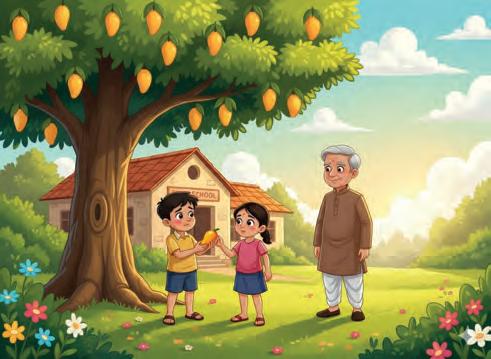
One hot afternoon, Ravi and his friend Anu were walking home when they passed the tree. Ravi looked up and said, ‘I wish I could taste a mango right now.’ Anu nodded, but then reminded him, ‘We should wait. The teacher always shares them with us when they’re ready and there are enough for everybody.’ Ravi looked at the mangoes again. He was too tempted and could almost taste the sweetness in his mouth. When no one was watching, he climbed the tree and picked the largest mango he could find. Just as he was about to take a bite, the headmaster saw him.
Ravi froze. His cheeks turned red with shame. He thought the headmaster would scold or punish him. The headmaster walked closer and said gently, ‘Ravi, when you take something without asking, you hurt the trust others have in you.’ Ravi quietly handed the mango to the principal and apologised. The headmaster nodded, patted his shoulder and walked away.
That day, he learnt that honesty and patience are sweeter than any mango.
1. Tick ( ) the correct option.
(a) Who usually ate the mangoes?
i. The school children and teachers ii. Only the school children
iii. The teachers
(b) What did Ravi expect the headmaster to do?
i. Ignore him
iii. Scold him
iv. The headmaster
ii. Speak to him gently
iv. Take the mango

(c) How did Ravi feel when the headmaster spoke to him?
i. Angry
iii. Frightened
2. Write True or False.
(a) Anu discouraged Ravi from picking a mango.
(b) The headmaster’s words were not harsh.
3. Fill in one word from the passage.
ii. Happy
iv. Ashamed
(a) If you really want to do something even though you know it’s not the right thing to do, it means you feel very to do it.
(b) When you take something without asking, you hurt the others have in you.
4. Answer the following questions in 2–3 sentences.
(a) Why did the children love the mango tree? Give two reasons.
(b) Why do you think the headmaster chose not to scold Ravi?
(c) What lesson did Ravi learn from this incident?
(d) How would you feel if you were in Ravi’s place?
In a village by the riverside, Children ran with joy and pride.
Diwali night was very near, The festival everyone held dear.
Rina shaped a lamp with care, From simple clay she found right there. She painted it with colours bright, Ready to glow with golden light.
Her brother laughed, ‘It’s small and weak, The flame might flicker, the oil will leak!’
But Rina smiled, her voice was mild, ‘Even a lamp can light the wild.’
That evening, dark with clouds above, They placed her lamp with care and love. It softly glowed, its flame so bright, And filled their lane with golden light.
They learnt that night, both girl and boy, Small things can bring the greatest joy. For courage lives where hearts are true, Even a tiny flame can see you through.
1. Tick ( ) the correct option.
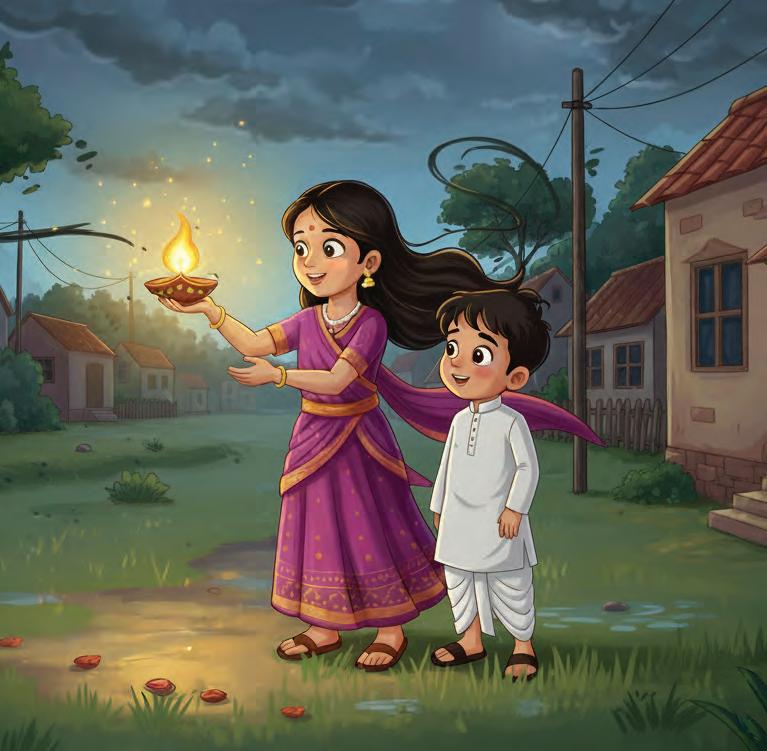
(a) Which words tell you that Diwali is greatly loved by everyone?
i. Bright flame
iii. Mild voice
ii. Very near
iv. Held dear
(b) What quality does Rina show when she says, ‘Even a lamp can light the wild’?
i. Laziness
iii. Fear
ii. Confidence
iv. Doubt

(c) What happened when darkness and clouds filled the sky?
i. The lamp broke.
iii. The flame died.
2. Match the descriptions with the correct words.
ii. The lamp glowed softly.
iv. The children went inside.
(a) The way the children ran • • lovingly
(b) How Rina shaped the lamp • • brightly
(c) The way the children placed the lamp • • carefully
(d) The way the flame glowed in the dark • • joyfully
3. Answer the following.
(a) Give one word from stanza 3 that means ‘shine unsteadily’.
(b) Find a one-word synonym for ‘gentle’ from stanza 3.
4. Answer the following questions in 2–3 sentences.
(a) What did Rina’s brother say would happen to the lamp? Why did he think this?
(b) How did the lamp prove to be useful in the end?
(c) What is the message of the poem?
In the beautiful town of Udaipur, twelve-year-old Kavya loved spending her evenings by the lake. She often sat on the steps, watching the shimmering water and listening to the temple bells ringing softly in the distance. One evening, she saw a group of tourists throwing plastic bottles and wrappers into the lake. Kavya was very upset. The lake was not only lovely to look at but also the main source of water for the town.
The next morning, Kavya decided to act. She spoke to her school principal, who encouraged her to start a ‘Clean Lake Club’ to protect the lake. Soon, many of her friends and classmates joined. Every Sunday, they gathered near the lake to pick up trash and clean the surroundings. Kavya and her friends also designed colourful posters in Hindi and English that said, ‘Save Our Lake—Save Our Future’. They put these posters on walls near the lake to remind visitors to act responsibly. At first, people ignored the efforts, but the children didn’t give up. Slowly, things began to change. Shopkeepers stopped handing out plastic bags, and tourists were guided to throw waste in bins placed near the lake. Within months, the lake looked cleaner, birds started returning to its shores and small fish could be seen swimming again. The lake sparkled once more, just like it used to.

Kavya felt proud and happy. She realised that even small efforts and actions can make a big difference when people work together. Her story inspired other students in nearby schools to start their own clean-up clubs. She also understood that taking care of nature means taking care of ourselves.
1. Tick ( ) the correct option.
(a) Where did Kavya love to spend her evenings?
i. In her classroom
iii. At her grandmother’s house
ii. By the lake
iv. In the market
(b) What upset Kavya when she saw tourists by the lake?
i. They were singing loudly.
ii. They were feeding the fish.
iii. They were littering.
iv. They were taking too many photos.

(c) What name did Kavya give to the group she started?
i. Clean Lake Club
iii. Green Earth Group
ii. Save Water Club
iv. Protect Nature Team
(d) What happened after the children’s continued efforts?
i. The lake dried up.
ii. People ignored them completely.
iii. Tourists stopped visiting Udaipur.
iv. The lake became cleaner.
2. Write True or False.
(a) The Clean Lake Club worked every Sunday.
(b) Posters were only made in English.
(c) Shopkeepers stopped handing out plastic bags.
3. Find words from the passage that mean the same.
(a) shining or glowing softly
(b) to pay no attention to something
4. Answer the following questions from the passage.
(a) How did Kavya and her friends spread their message to others?
(b) How does this story show that children can make a difference in society? Why do you think people slowly began to support the Clean Lake Club?
(c) What lesson did Kavya learn from her experience?
The Sundarbans is one of the largest mangrove forests in the world, located in West Bengal (India) and Bangladesh. It covers more than 10,000 square kilometres of land and water. It became a UNESCO World Heritage Site in 1987. It is famous for its thick mangrove trees, winding rivers and rich wildlife. The name Sundarbans means ‘beautiful forest’. Some people also believe it is named after the sundari tree, which grows in this region.

The Sundarbans is the home of the Royal Bengal Tiger, an animal known for its strength and courage. These tigers are excellent swimmers and can move easily through the wet, swampy land. Besides tigers, the forest is also home to spotted deer, crocodiles, snakes and many species of birds. People who live near the Sundarbans depend on the forest and rivers for their livelihood. They catch fish, collect honey and gather firewood. However, they also face dangers, as wild animals sometimes enter villages. That is why the government and local people work together to keep both animals and people safe.
The Sundarbans is very important for India. The mangrove trees act like a natural shield and protect the land from big storms and floods. The forest also provides clean air and a safe home for many animals.
1. Tick ( ) the correct option.
(a) Where is the Sundarbans located?
i. Kerala and Sri Lanka
iii. West Bengal and Bangladesh
ii. Gujarat and Rajasthan
iv. Odisha and Nepal
(b) Which animal is the Sundarbans most famous for?
i. Asian Elephant
iii. Peacock
(c) Why do people depend on the Sundarbans?
i. For shopping malls
iii. For fish, honey and wood
ii. Royal Bengal Tiger
iv. Panda
ii. For hunting elephants
iv. For growing tea

2. Match the following.
(a) The tiger’s swimming skill • • acts like a natural shield against storms.
(b) People living nearby • • helps it sur vive in swampy land.
(c) The Sundarbans forest • • beautiful forest.
(d) Sundarbans means • • depend on forest and rivers for livelihood.
3. Find words in the passage that mean the opposite of the following words.
(a) weakness
(b) artificial
4. Answer the following questions from the passage.
(a) Why are Royal Bengal Tigers special?
(b) How do the Sundarbans help both people and animals at the same time?
(c) Why do you think the government wants to protect the Sundarbans?
A notice is a written or printed announcement that is used to inform a group of people about the details of an event.
Varun Rao, the IT secretary of Swami Vivekanand School, issued a notice about an AI awareness event called ‘AI: Technology for the Future’.
15 September 20XX
All students are hereby informed that the IT Club of our school is organising an awareness event entitled ‘AI: Technology for the Future’. The aim of the presentation is to introduce students to the exciting world of Artificial Intelligence and highlight its impact on our lives.
Date: 21 September 20XX
Time: 11:00 a.m. to 2:00 p.m.
Venue: Multimedia Room
Guest Speaker: Mr Raj Bhatnagar
Students of Grades 4 to 8 who are interested in learning about AI and its real-world applications are encouraged to register by 18 September 20XX.
For registration or more information, please contact Mrs Sakshi Sharma, Head of the IT Club.
Varun Rao
IT Secretary
Name of the school/ institution/ organisation
Header
Date
Title/Subject
Body of the notice:
• Purpose of the notice
• Date, time, venue and other important details
• People involved or invited
• Contact information
Signature
Details of the person in charge

Write a notice for each of the following topics in 60–70 words.
1. Your school is organising a Tree-Planting Drive. As the Environment Club Captain, write a notice inviting students of grades 5 and 6 to take part.
2. You are a member of the Student Council. Write a notice inviting students of grades 4 and 5 to contribute to the School Magazine, Manjiri. They can contribute by sharing ideas or submitting their poems, stories or artworks.
3. Imagine you are the President of your Housing Society. Write a notice inviting residents to participate in a Summer Fitness Camp. Encourage children and adults to join morning yoga and sports activities in the society park. You should include details like the date, time, venue or registration fee in your notice.
4. You are the Event Coordinator for your community’s Diwali Celebration. Write a notice inviting children aged 10 to 15 to set up and run interesting game stalls during the event. Ask interested participants to register in advance and mention the last date for registration.
A formal letter is a written message sent to someone in an official position – like your class teacher, school principal, a newspaper editor or a government official.
We can write formal letters to:
• Ask for permission • Make a request • Give information
• Complain about something • Thank someone formally
Amisha Gupta wrote a letter to the principal of her school requesting approval for an address change and asking for the letter to be forwarded to the records team.
B36/8, Krishna Apartments
Sohna, Gurugram
Haryana – 120012
21 August 20XX
The Principal, Aditya Birla School
Gurugram
Haryana – 120012
Subject: Request for Update of Address in School Database
Ma’am/Sir,
I kindly request that my residential address be updated in the school records. My family has recently moved to a new address, and I would like to ensure that future communication from the school reaches us correctly.
Previous Address: 123, Old Residency Lane, Gurugram – 122001
New Address: B36/8, Krishna Apartments, Sohna, Gurugram – 120012
I request you to approve this change and forward it to the records department for updating the database.
Thank you for your time and consideration.
Yours sincerely, Amisha Gupta Class: V - C
Sender’s address with a pincode Date
Receiver’s address
Subject Formal greeting
Body of the letter
• Introduction: purpose of your letter
• Content: specific details about the request
• Closing: polite ending
The closing: Yours truly/ faithfully/sincerely,
Your name

Here are some examples of how to write the receiver’s address.
The Editor, The Times of India, K.G. Marg, New Delhi – 110001
The Municipal Commissioner, Municipal Corporation of Gurugram, Sector 34, Gurugram – 411001
The Station House Officer (SHO),
Sector 14 Police Station, Hyderabad – 500098
Write a formal letter for each of the following topics in 80–120 words.
1. Write a letter to your principal requesting approval to start a ‘Quiz Club’ for students who are interested in general knowledge and want to take part in competitions.
2. Write a letter to the librarian of your school requesting the addition of new storybooks and course books for the benefit of the students.
3. Write a letter to the police station near your home to inform them about your lost wallet.
4. Write a letter to the head of the municipal corporation requesting for urgent repairs to the broken swings and slides at your local playground.
5. Write a letter to your school canteen manager giving suggestions for adding more healthy food items to the canteen menu.
An email is a quick, electronic way to send messages over the internet. The kind of language used depends on who you’re writing to – formal for officials and informal for friends or family.
You are Vikram, a student staying in the school hostel. Write an email to your parents sharing your experience of how Holi was celebrated at your hostel.
To: pankaj_sarraf@gmail.com
Cc: <add e-mail ids to publicly send an email to other receivers/recipients>
Bcc: <add e-mail ids to privately send an email, hiding receivers’/recipients’ addresses>
Subject: Holi Celebrations at Hostel!
Dear Mom and Dad,
Happy Holi! I missed celebrating with you this year, but I wanted to share how much fun we had at hostel on the day.
We had a special breakfast with gujiyas, samosas and thandai. Then, all the students played Holi with herbal colours in the playground. Everyone was laughing, dancing and throwing colours in the air. In the afternoon, we had a small cultural programme. Some students danced, and I sang a Holi song with my friends. Our warden gave us sweets and wished us a happy Holi.
I missed celebrating with you at home, but we had a lot of fun at the hostel. I hope you too had a great time.
Regards, Vikram
Receiver’s Email Address:
Who you are sending the email to
Subject line: One line that says what the email is about Greeting: Who you are writing to
Body of the Email:
• Start with the reason why you are writing
• Give details or share your experience
• End by summarising or giving good wishes
Closing & Signature: Polite ending and your name
1. Write an email to your cousin about your recent school achievements.
2. Write an email to your principal, proposing a workshop on safety measures during emergencies such as earthquakes, floods or fires.
3. Write an email to your subject teacher, requesting extra help in a subject you find challenging, such as Mathematics or English.

An essay is a short piece of writing that shares information, ideas or opinions about a specific topic. It has at least three paragraphs – an introduction, a body paragraph and a concluding paragraph.
Water is one of the most valuable natural resources on Earth. All living beings, including humans, animals and plants, need water to survive.
We use water for drinking, cooking, cleaning, farming and even to produce electricity. Clean water helps us stay healthy and supports the growth of food crops, which makes it essential for our daily lives. Unfortunately, many water sources are becoming polluted due to waste, plastics and harmful chemicals being dumped into rivers and lakes. Drinking dirty water can cause serious diseases like cholera and typhoid. The lack of access to clean water makes life very difficult for many communities around the world. That is why, we must protect our water sources and make sure everyone has access to safe drinking water.
We should learn to use water wisely. Wasting water today means there may not be enough for tomorrow. Small actions like closing taps properly, harvesting rainwater, planting trees and avoiding pollution can make a big difference.
Clean water is precious and saving it is not only important for us but also for future generations.
Write an essay of 150–170 words on each of the following topics.
1. The importance of good health and hygiene in a student’s life
2. If I could invent a new gadget
3. How I would spend my day if I were the principal of the school
4. The role of community helpers in our daily lives
5. If I could create my own festival
Title: States what the essay is about
Introduction:
A short paragraph that introduces the topic and explains why it matters
Body: Includes details, facts and examples (The number of paragraphs can vary.)
Conclusion: Concludes by restating the main idea and giving a final thought
• Begin with an introduction that clearly tells what your essay is about.
• Give 2–3 paragraphs with details, examples and reasons.
• Use a new paragraph for each new idea.
• Summarise your ideas or give your opinion in the conclusion. Tip!
A persuasive speech is written and delivered to convince the audience to believe in an idea, take action or to agree with the speaker’s point of view.
Model Answer
Respected Principal, teachers and dear friends, good morning!
My name is Krutika, and today, I want to share why I believe our school campus should have more trees. Did you know that one tree can produce enough oxygen for four people every day? Trees are not just beautiful – they are givers of life.
Trees give us clean air to breathe. With more trees, our school will be greener and healthier. Students will not fall sick easily if the air is clean. On hot summer days, trees offer cool shade. They make outdoor activities more enjoyable and protect us from the harsh sun. Imagine how nice it would be to sit under a tree during break!
Trees attract birds, butterflies and small animals, which can help to turn our campus into a living classroom. Students can learn about nature just by observing the trees and the creatures they attract. In conclusion, trees clean our air, give us shade and help us learn about nature. Planting more trees will make our school greener, healthier and more beautiful. Let’s work together to make this happen – one tree at a time.
Thank you!
Title
Greeting
Introduction: Begin by greeting your audience, stating your topic and giving an interesting fact.
Body: Give 2–3 strong points and reasons to support your opinion with examples or facts.
Conclusion: Summarise the main points, restate the main idea and give a call to action.
Thank the audience: Express gratitude to the listeners.

Write a persuasive speech of 160–180 words on each of the following topics.
1. Write a speech on the topic ‘Performing Arts Should Get More Attention at School’. Define performing arts (dance, music, drama, etc.). Explain how they express emotions, tell stories and build confidence. Convince your audience that performing arts are important and how they can be given more attention.
2. Write a speech on ‘The Importance of Saving Money’.
3. Write a speech on ‘How the Internet Connects the World.’ Include both advantages (access to information, communication and sharing ideas) and disadvantages (excessive screen time and safety).
4. Write a speech on ‘The 3Rs (Reduce, Reuse, Recycle): Small Actions That Make a Big Difference’.
5. Write a speech on ‘Why the World Needs to Protect Animals’. Talk about why animals are important to nature. You can mention some endangered species.
Story writing means creating your own story using your imagination, feelings and ideas.
A good story has:
• A title (name of the story – short and interesting)
• Characters (people or animals in the story)
• A setting (where and when the story happens)
• A problem or event
• A solution to the problem or a conclusion
Write a story using these clues:
You turned into a cat – you tried to scream, but you heard a loud ‘Meow!’ – people didn’t recognise you – something funny or surprising happened – how did it all end?
It was a quiet Monday morning. I stretched and yawned but felt a little strange. My arms felt short, my nose was twitching and something was brushing against my legs. When I looked into the mirror, I froze. I had turned into a cat – a fluffy grey cat with pointy ears, sharp claws and a long tail!
I tried to scream, but all I could do was to give a loud ‘Meow!’ My parents heard the sound and rushed in— but instead of helping me, they shouted, ‘Shoo, cat!’ and chased me out of the house! I ran down the stairs, leapt over a flower pot and dashed into the street.
At first, I was scared. But soon, I discovered how fast I could run and how high I could jump. I chased butterflies, scared a dog and even took a nap near a warm bakery where I drank spilt milk. Life as a cat wasn’t so bad. Suddenly, I heard a loud ‘Meeee-ow!’ Everything started to spin around me quickly.
I woke up in my bed – human again. It had all been a dream. But from that day, I never teased cats again. I knew what it felt like… to walk on their paws!
Title
Beginning: The characters, setting and the main plot are introduced here.
Middle (Rising action): It includes the events that lead up to the main problem of the story or conflict.
Middle (Climax): This is the most exciting part of the story. It is the turning point where the main problem reaches its peak.
End: This is the closing part of the story. It shows what happened finally and what the character learnt or felt in the end.

Write short stories of 160–180 words on the following topics.
1. Write a story using these clues: You found a magical door in your school – it led to a strange land – you met a talking animal – something went wrong – how did you get back?
2. Write a story using these clues: You woke up in a video game – you had to complete a mission to escape – your team included a robot and a dragon – one of them turned out to be a villain – what did you do?
3. Write a story entitled: ‘The Day My Voice Disappeared’. Give a proper beginning, middle and end.
4. Imagine you are a small ant in a big forest. Write a story about your adventure. What do you see around you? Who do you meet? What danger or problem do you face? Describe how you feel being so tiny in such a huge place and how your story ends.
5. Look at the pictures and write a story about them. Describe the characters, where they are, what is happening in the pictures and what might happen next.
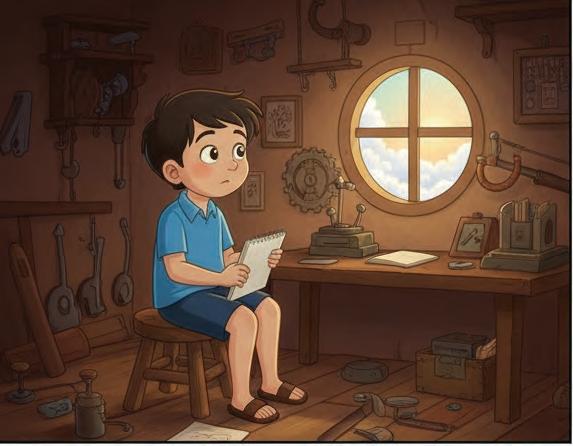
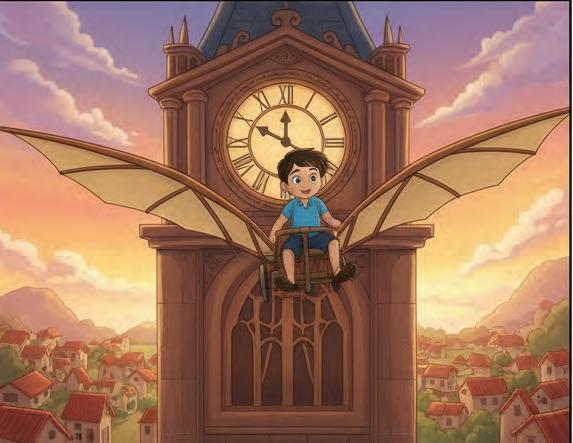
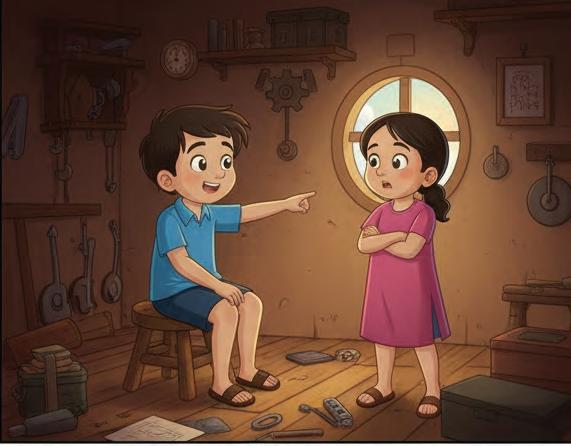
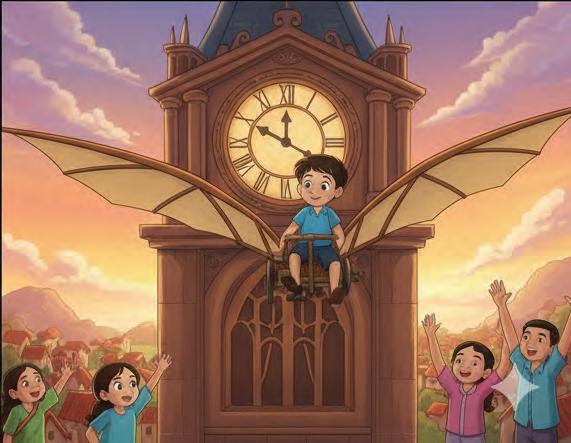
An autobiography is a piece of writing in which a person tells the story of their own life. It includes real events, feelings and experiences, expressed in their own words.
While writing an autobiography, imagine that you are the person and that you are telling your own life story to someone. An autobiography can also be about a non-living thing, written in a fun and imaginative way.
Write in the first person (‘I’, ‘my’, ‘me’).
My name is Neil Armstrong. I was born on August 5, 1930, in Ohio, USA. When I was a child, I loved aeroplanes and flying. I got my pilot’s license when I was just 16 years old! I studied aeronautical engineering in college because I wanted to learn how planes and rockets fly.
I became an astronaut in 1962. My job was to fly spacecraft and explore space. In 1969, I had a very special mission called Apollo 11. I became the first person to walk on the Moon! When I stepped onto the Moon’s surface, I said, ‘That’s one small step for man, one giant leap for mankind.’ It was an amazing moment for me and for the whole world.
After my missions, I taught aerospace engineering at a university. I love sharing my experiences to inspire others. Being an astronaut taught me the importance of courage, teamwork and never giving up on my dreams. I hope many children will look to the stars and become explorers of the future.
Start with an introduction (who, where, when). Use real names, places, dates and events.
Share important experiences, challenges, relationships and dreams. End with a reflection or a lesson learnt, and share your hopes for the future. Use clear language and organise the events in the correct order of time.
1. Write an autobiography about yourself. Include your name, where you live, your family, your favourite hobbies and a special memory from your life.
2. Write an autobiography of a tree. You can describe where it was born, how it grew, what it saw around it and how it felt about the people, animals and seasons it experienced.
3. Imagine you have become what you always dreamt of (a famous scientist, artist, athlete, chef, etc.). Write an autobiography describing what you did to reach your goal, what problems you faced and how you are helping others now.

An article is a piece of writing that is published in a newspaper, magazine, journal or online. Articles provide information, explain ideas or express the writer’s opinion on a topic. Articles can be news reports, magazine features, research findings or reviews.
Read the article on Fighting Poverty published in one of the leading English newspapers in India.
by Pranjal Shukla
Poverty means not having enough money, food or shelter to live a healthy life. It affects thousands of people around the world, including children who cannot go to school or get proper meals.
Poverty is one of the biggest problems in the world. People living in poverty often struggle to find jobs, stay healthy and get an education. The United Nations adopted Sustainable Development Goal 1 (SDG 1) to end poverty in all its forms by 2030. This goal encourages governments and communities to help poor families by providing food, education and support.
In India, many programmes like free schooling, meal schemes and job training programmes help reduce poverty. If children go to school and parents have work, families can lead better lives.
Ending poverty is possible if we all work together. By helping others, supporting fair policies and spreading awareness, we can build a world where everyone has a chance to succeed.
Write articles on the following topics.
Title: A clear and catchy heading
Byline: The writer’s name
Introduction: A short paragraph introducing the topic and the purpose of the article
Main Body: 2–3 paragraphs with facts, details, examples and explanations that support your points
Conclusion: Summarise the main points and end with a final thought or call to action
1. Write an article on ‘How Technology Helps Us Learn Better’. Write about smart boards, tablets, online videos and quizzes or how you use computers for projects.
2. Write an article on ‘Gender Equality in Schools’. Write about boys and girls getting equal chances in studies, school events and leadership roles.
3. Write an article on ‘The Importance of Sports in Student Life’. Explain how games keep us healthy, teach teamwork and give us confidence.
Me’ is‘ an object pronoun. It is used when the person is receiving the action.
I’ is‘ a subject pronoun. It is used when the person is doing the action in the sentence. It is generally used at the start of the sentence.
Circle: I, you, it, he, they, me 3.
Words that show belonging or possession (possessive pronouns) include: his and mine. 2. The onounspr used in the dialogue to talk about people or things instead of repeating names or nouns are called personal pronouns.
Set
Chapter 3 •
Everyone enjoyed the trip and learnt about different cultures and .traditions
We saw old ,artefacts paintings and .statues The teacher’s explanations were interesting, and our guide’s stories were inspiring. A female archaeologist showed us the kings’ .swords
Last eek,w our class visited the National Museum in Delhi.
5. (a) students (b) emperors (c) king’s (d) India’s (e) soldiers’ (f) principal’s (g) freedom fighters’ 6. (Answers may vary.)
3. (a) school’s (b) students’ (c) girl’s (d) children’s (e) judges’ 4. (a) teacher’s (b) water (c) glasses (d) lakes (e) wells (f) village’s (g) buckets (h) villagers’
(a)2. father (b) princess (c) worker (d) priest (e) hostess (f) vixen (g) teacher
(k) valleys (l) thieves
(f) keys (g) sheep (h) games (i) roofs (j) benches
(a)1. peaches (b) losses (c) windows (d) diaries (e) halves
Use It for Real
How It Works
4. xamplesE of masculine nouns are boys and batsmen and feminine nouns are girls and batswomen Principal refers to both male and female as there is no feminine and masculine form.
3. The words boys’ and girls’ show possession, but boys and girls are plurals.
Examples: ys’bo team, girls’ team, Rohan’s captaincy, Priya’s shots
2. An opheapostr is used to show possession.
Plural: jerseys, boys, wickets, balls
1. Singular: match, school, game, Ankit
Last ,summer my family went to Kashmir. My cousin and I played near the river and enjoyed the beauty of the tall mountains. We met a group of tourists who had visited the Taj Mahal. I felt great joy when my sibling bought me a toy lion. At the market, we saw carpets made of wool and sarees made of silk. We brought home a set of marble crafts
5. (Answers may vary.)
4. (a) tree (b) Delhi (c) Flocks (d) nests (e) laughter (f) poet (g) beauty (h) Swarms
3. (a) team (b) group (c) class (d) stack (e) series (f) set
Use It for Real (a)1. steel (b) group (c) Agra (d) happiness (e) cake (f) shops (a)2. discipline (b) grace (c) patience (d) confidence (e) devotion (f) joy
pots, statues, elephants, birds, hands, students
3. Underline: wheel, pottery machine, clay, instructor, studio,
2. neO word that cannot be seen but felt is love.
Special: Madurai, Urmila
Common: wheel, pots
1. (Answers may vary.)
Chapter 1 • Types of Nouns Get Set
oyaZ jumped when someone spoke right next to her, ‘You found the hidden courage box! You win!’ said her teacher with a big smile.
Zoya thought it might be someone from the camp playing a prank. Suddenly, she saw something shining behind a tree. She moved closer carefully and found a small wooden box. As she opened it, a tiny note inside said, ‘You are braver than you think.’ Zoya didn’t know if she should be scared or proud!
The esleav were rustling, and the wind was blowing gently.
5. (Answers may vary.)
4. (a) in (b) to (c) near/beside/next to (d) on, before
3. (a) were (b) opened (c) gets (d) read (e) knew
2. (a) She (b) He (c) mine (d) Whose (e) ours (f) This
1. (a) family (b) schoolbag (c) classroom (d) swarm (e) glass (f) bunch (g) courage (h) gold
Self–Assessment
(e) A talented young student was chosen to lead.
(d) The candidates wore smart blue uniforms.
(c) The students eparedpr a long colourful banner for the event.
(b) The head boy gave an inspiring short speech.
1. (a) The students edgather in a large rectangular hall for the elections.
The correct order would be ‘The ancient rectangular box was locked.’ – first the age and then the shape.
The order is incorrect. Age adjectives (ancient) come before shape adjectives (rectangular).
Think and Tell
5. The dwor ‘loudest’ shows that of all the sounds this boom is the most intense (loudest).
4. The dwor ‘brighter’ compares the glow of the bolt with the shine of swords held up high.
3. The dwor ‘fierce’ describes the storm.
2. Opinion: heavy, quick Physical feature: bright, glowing Size: big, long Colour: black, gold
1. The adjectives ‘heavy’ and ‘black’ describe the noun ‘clouds’.
On a bright sunny day, a group of happy little children sat on a chequered mat in the middle of a green forest. They enjoyed slices of delicious pizza and drank fresh orange juice from a big jug. Leafy trees surrounded them, and the golden sun shone in the clear blue sky. Each child wore colourful clothes, and their smiling faces showed how much fun they were having. Plates of crispy cookies and hot pizza lay on the mat.
5. (Answers may vary.)
4. (a) See compound adjectives given below. (b) i. goal-oriented ii. time-saving iii. full-page iv. well-crafted
3. (a) Which (b) bright-coloured, their (c) several (d) prettiest (e) five-page
2. (a) oldest (b) first (c) farther (d) well-planned (e) Which
Compound Adjective (eco-friendly)
(e) Underline: eco-friendly Circle: dustbins
Possessive Adjective (their), Adjective of Quality (thorny)
(d) Underline: their, thorny Circle: tools, bushes
Adjective of Quality (bright green)
(c) Underline: bright green Circle: caps
Possessive Adjective (our), Interrogative Adjective (which)
(b) Underline: Our, Which Circle: teacher, group
Adjective of Quantity (many), Adjective of Quality (forest)
1. (a) Underline: many, forest Circle: bags, trail
Use It for Real
6. The question dwor which is followed by the noun planet.
5. upiterJ is the largest planet with many moons. It means that, of all the planets, its size is the largest.
4. enusV is the bright planet. Rohan uses the word ‘that’ to point it out.
3. onomersAstr have scientific knowledge.
2. ercuryM has a rocky surface.
1. The word eight tells the number of planets.
Chapter 5 • Types of Adjectives Get Set
oursY lovingly,
leaseP write back and tell me about competitions in your school.
I learnt that confidence is an important quality for a speaker.
When my ntur came, I spoke loudly and clearly. I did not win the first prize, but I was happy to be a part of the competition.
Many students from different classes joined the competition.
carried an extra copy of my speech in case I forgot something.
nO the day of the event, I was a little nervous but also excited. I
Before the competition, I practised every day in front of my parents. My teacher also gave me tips to improve my speech.
Dear Ziya, I hope ouy are fine. Last week, I took part in a speech competition at my school. It was about ‘Cleanliness.’
27 ctoberO 20XX
elhi,D 1100XX
hantiS Vihar
180/09
4. (Answers may vary)
3. (Answers may vary.) (a) Our school has a team for the sports competition. (b) Every member has made an effort to take part. (c) The captain encouraged everyone to do their best. (d) Teamwork requires support from all members. (e) Players must work together to win the match.
(h) The (i) the (j) –
2. (a) – (b) – (c) the (d) – (e) an (f) the (g)
1. (a) a, the (b) a, – (c) the, – (d) an, the (e) a,
4. The word class is used in a general way so no article is needed. In a modern classroom tool, we are introducing it for the first time → so we use a. Use It for Real
3. eW don’t use a or the with plural nouns (sailors) when talking in general.
2. eW use the sun as it is only one in our solar system.
1. We use an when we talk about something for the first time. After that, we use the because now everyone knows which thing we are talking about.
Chapter 4 • Articles Get Set
6. (Answers may vary.) hahS Rukh Khan is a famous Indian actor. He was born in New Delhi in 1965. Many people love .him His fans call him the ‘King of Bollywood’. He worked hard and taught himself to act. This is what makes him truly special. Today, he has a cricket team that is .his He helps children through charity. We admire him and enjoy watching him act. Which are the actors that you like?
5. (a) him (b) This (c) himself (d) him (e) me (f) them (g) ours
4. (a) They (b) Those (c) That (d) Whose (e) mine (f) you (g) myself (h) They (i) them (j) ourselves
3. (a) myself (b) herself (c) himself (d) ourselves (e) themselves
2. (a) This (b) Those (c) That (d) This (e) These
Demonstrative Pronouns: This, That Reflexive Pronouns: himself
Possessive Pronouns: theirs, mine
Interrogative Pronouns: Who, Whose
1. Personal Pronouns: They, His, him, it, us, I
Use It for Real
5. Chai is truly a part of the Indian culture. (To what extent)
4. People usually start their day with tea. (How often)
3. The aroma spreads everywhere. (Where)
2. Grandmother brews her tea carefully. (How)
1. Indians start the day early. (When)
Get Set
Class onitorM Class V
Regards, nigdhaS Sharma
Let us wfollo all the rules and have a wonderful learning experience together!
uringD the trip, we must stay in our groups and listen carefully to our teachers. We shouldn’t touch any exhibits unless we are allowed to. You must not run or shout in the museum. You may carry a small notebook to take notes.
I am yhapp to tell you that we will visit the Science Museum on 1 June! It will be a fun and exciting trip, but we must follow some important rules to stay safe and enjoy ourselves. We must reach school by 8:00 a.m. because the bus will leave on time and cannot wait for anyone. Please wear your school uniforms and comfortable shoes. We may not eat snacks in the museum, but you can carry a water bottle.
Subject: Trip to the Science Museum – Important Guidelines earD Friends,
Bcc: <add e-mail ids to privately send an email, hiding receivers’ addresses>
Cc: classteacher_classV@schoolmail.com
To: classmates_group@schoolmail.com
4. (Answer may vary.)
3. (a) should (b) must (c) Will (d) can (e) shouldn’t (f) Would
2. (a) can (b) Should (c) will (d) will (e) should
1. (a) must (b) may not (c) should (d) Can (e) can (f) may (g) should
3. tI expresses a future action.
2. eH is giving advice. The modal verb ‘should’ is used to suggest a correct action. It is not command.
1. The teacher said yes to Gurpreet and no to Shyam because Shyam used ‘can’, which is an informal way of asking for permission and is also used for ability to do something, while Gurpreet used ‘may’, which is more polite when speaking to a teacher.
Get Set
5. (a) held (b) Annual Sports Day (c) participated (d) gave (e) prizes (f) distributed (g) showcased
(e) Astronomers discovered a new asteroid last year.
(d) The teacher explained the solar system to the students.
(c) Aarav recorded the positions of the stars in his notebook.
4. (a) The students observed the planets through the telescope. (b) The teacher taught the moon phases in class.
(h) walked – Intransitive (I)
(g) clapped – Intransitive (I)
(f) dropped (object: his straw) – Transitive (T)
(e) laughed – Intransitive (I)
(d) dimmed, became – both Intransitive (I)
(c) chatted – Intransitive (I)
(b) bought (object: a big tub of popcorn and two cold drinks) –Transitive (T)
(f) I
(a) arrived – Intransitive (I)
(a) I (b) T (c) I (d) T
1. (a) are planting (b) is guiding (c) are collecting (d) will donate (e) are working
5. In Anya was walking home, The old lady smiled and The old lady looked worried, the actions in the sentences only have doers.
4. In She held the old lady’s hand and She had helped someone in need, the actions in the sentences have doers and receivers.
3. In She helped the old lady, the action has a receiver (the old lady). In Anya smiled, the action does not have a receiver.
2. Anya is doing the action, helped is the action and an old lady receives the action.
Underline: was walking, saw, standing, looked, were moving, walked, said, will help, held, crossed, smiled, said, felt, had helped
1. (Answer may vary.)
Chapter 7 • Verbs Get Set
5. (a) sweeter (b) most famous (c) fresher (d) most delicious (e) happiest
4. (a) brightest (b) important (c) visible (d) first (e) great
Review Test 1 (a)1. book (b) wisdom (c) Delhi (d) library (e) pile (f) children (g) classroom (h) pages (i) paper (j) curiosity (a)2. her (b) her (c) me (d) hers (e) Who (f) me (g) myself (h) his (i) hers (j) ours (a)3. the (b) a (c) an (d) the (e) the (f) the (g) a (h) a (i) the (j) –
5. nceO upon a time, there was a lazy young shepherd who had a flock of small white sheep. One day, he shouted that a wolf was coming, even though there was no real danger. The villagers came, but they saw nothing. The shepherd laughed and felt more proud than before about his silly trick. Later, a big wolf appeared. The shepherd shouted for help, but the villagers ignored him. The wolf ate many sheep, and the shepherd learnt the most important lesson of his life.
4. (a) brighter (b) more challenging (c) fastest (d) strong (e) more thrilling (f) most skilful (g) brave (h) most memorable
3. (a) more beautiful (b) colourful (c) brighter (d) most creative (e) cute (f) funniest
2. (a) Women wore many traditional white sarees. (b) We saw a big bright round rangoli. (c) He bought several tiny copper bells. (d) The temple had many ancient golden lamps. (e) We enjoyed our huge vegetarian Onam feast.
(e) Ashima edwav happily to her friends where they stood on the top deck.
(d) The eswav sparkled while the music played softly in the background.
(c) Although she was a bit scared, she decided to stand at the rails on the deck.
(b) Ashima was excited because this was her first trip.
6. (a) The umbaiM Queen set sail from the harbour when the sun was setting beautifully over the sea.
(g) on (h) in (i) for (j) towards/to
5. (a) at (b) under (c) through (d) between (e) in (f) to
(f) carefully (g) patiently (h) very (i) always (j) again
4. (a) early (b) quickly (c) happily (d) neatly (e) politely
(a)3. should (b) must (c) will (d) may
Everyone is happy when the house shines brightly and smells of incense.
We have just prepared sweets together and last year I had helped with the rangoli.
I am always excited to clean the rooms and arrange the cushions.
uringD Indian festivals, I help decorate the house with flowers and lights.
2. (Answer may vary.)
(c) painted – T (d) sang – I
(a)1. prepared – T (b) played – I
Review Test 2
The lion laughed, and he let the mouse go. After many days, the lion was caught in a hunter’s net. The lion was brave, yet he struggled to break free. The mouse heard his roars and ran quickly to help. The mouse wanted to help because he remembered the lion’s kindness. The mouse bit through the ropes while the hunters were away and freed the lion. Both of them became friends, and they lived happily in the forest.
4. neO day, a lion was sleeping in the forest when a tiny mouse ran across his paw. The lion caught the mouse, and he wanted to eat him because he was hungry. The mouse begged for mercy and promised, ‘I will help you one day.’
(e) He smiled with relief when the exam was over.
(d) nO the exam day, Rohan sat quietly while the examiner distributed the papers.
(c) He was nervous, but he tried motivating himself.
(b) eH revised his notes, and he solved practice papers before the exam. / He revised his notes and solved practice papers before the exam.
3. (a) ohanR studied hard for his maths exam, yet he did not feel very confident.
(g) Although
(a)2. If (b) because (c) so (d) ande) ( or (f) but
1. (a) and (b) for (c) nor (d) but (e) or (f) yet (g) so
4. The two common conjunctions used for giving a easonr are because and since Use It for Real
listing elements, not as a main sentence connector.
(b) nI this sentence, and is used to join two nouns (confidence and joy) within the same clause. It acts as a connector
3. (a) nI this sentence, and is used to join two full sentences of equal importance. It indicates that the two actions happened in sequence.
2. The tpar of the sentence that shows the result is he encouraged her to practise with him. The conjunction used is so
1. The two dswor showing contrasting ideas are excited and nervous. The word used to join the sentence is but
It was truly a journey of joy and togetherness.
inally,F we returned home and spoke about our memories.
The next ,day we visited the Amber Fort. We climbed onto/on an elephant and reached the fort in the afternoon. Inside the fort, we saw beautiful paintings made with natural colours. ,Later we went shopping. My mother bought a set of bangles and my father took photos with his new camera. I ate delicious food and drank lassi in a clay cup.
The hotel was located on the main road near the palace.
4. Last ,winter I went to Jaipur with my family. We reached the city at night on 20 December.
3. (a) The students entered through the main gate of the factory. (b) They walked along/through the long corridor to the mixing room. (c) A big tchar hung above / behind / next to the machines to explain the process. (d) Workers filled the trays with fresh biscuits.
4. A noun or a pronoun always follows a preposition. Use It for Real 1. (a) for (b) in (c) in (d) with (e) about (f) to (a)2. across (b) near/at (c) about (d) of (e) until, of (f) with
3. ‘With pride’ shows the manner in which the principal spoke.
2. Circle: behind, near
1. The icolourtr flag is behind the stage. Behind tells us that the flag is at the back side of the stage. It shows the position of the flag in relation to the stage.
Get Set
5. (Answer may vary) Yesterday, my dad excitedly tried to flip a dosa for the first time. He threw it high in the air and bravely waited to catch it. But the dosa landed on the ceiling fan! It quickly spun around and flew across the room, sticking to the wall. We all laughed so much that even our dog nervously barked at the wall.
4. (Answers may vary.) (a) early (b) quickly/neatly (c) usually/always (d) immediately (e) carefully (f) there
3. (a) always (b) Immediately (c) safely (d) Never (e) slowly (f) respectfully (g) regularly
1. (a) politely (b) always (c) quickly (d) quietly (e) never (a)2. usually (b) extremely (c) well (d) really (e) never (f) always
Use It for Real
6. carefully 7. always 8. outside 9. early
Fun with Grammar Across: 1. usually 2. late 3. everywhere 4. very 5. quickly Down:
Negative sentence: No, I don’t.
4. Question: Do you have any AI tools?
3. illW you please help me tomorrow? (Simple Future-question)
(Simple Past – negative)
2. eW did not have all the information yesterday.
1. ouY can try ChatGPT or Google Gemini. (Simple Present –positive)
(Answer may vary)
Get Set
Dependent clause: only if the rain stopped
(f) Independent clause: Piya said she would go outside
Dependent clause: as the ground was too wet to go out
(e) Independent clause: They played board games inside
Dependent clause: When the thunder roared
(d) Independent clause: the lights flickered for a moment
Dependent clause: before her cousins arrived
(c) Independent clause: She made hot chocolate
Dependent clause: while the rain poured heavily
(b) Independent clause: Priya stayed near the window
Dependent clause: because dark clouds filled the sky
4. (a) Independent clause: They cancelled the picnic
(e) while they waited for the teacher
(d) Since Scooby-Doo is afraid of ghosts
(c) when Shinchan made a silly face
(b) Although Tom tries to catch Jerry
(a) because his gadgets are so cool
(e) she quickly put on her helmet :Underline3.
(d) The astronauts trained for months
(c) they will return to the space station
(b) The rocket launched successfully
(a) he described the view of Earth
hrase:P with red and blue paint :Underline2.
(f) Clause: Ashish made a sign
Clause: the children cleaned the floor
(e) Clause: After they finished their work
(d) hrase:P Near the door
Clause: everyone worked quickly
(c) Clause: Because the fair was tomorrow
(b) hrase:P On the table
Clause: her friends watched her work
1. (a) Clause: When Tina drew a big circle
(…wants to stop near the lake to see the elephants).
3. av’sAar sentence is complete and meaningful because it has a clear subject (Avni) and a predicate that includes verbs
2. avAar says, ‘Avni wants to stop near the lake to see the elephants.’ Yes, his sentence has both a subject (Avni) and verbs (to stop and to see)
1. vniA says, ‘To see the elephants near the lake, please.’ Her words have a verb (see) but not a subject.
5. (Answer may vary.)
g)( Do you think wind energy is a good option?
f)( Bring the clean energy chart, please.
e)( What a great job the team did on the energy model!
d)( We can use solar lights in the village.
c)( Should we install the solar panel on the roof?
b)( What a bright sunny day it is! / Wow! It’s a bright sunny day.
(a) idD she leave the solar power kit on the table? / What did she leave on the table?
4. (Answer may vary.)
(e) They wait for their turn at the tuck shop.
(d) She listens when others are talking.
(c) We help our classmates when they are stuck.
(b) He says sorry when he hurts someone.
3. (a) I speak kindly to others. / I do speak kindly to others.
(d) Be careful with your money. (Imperative)
(c) How much does it cost? (Interrogative)
(b) What a beautiful car this is! (Exclamatory)
2. (a) Rohan bought a new car. (Declarative)
(e) urray!H Our class display looks amazing. / Hurray, our class display looks amazing!
(d) Will you paste my Madhubani artwork on the wall?
(c) Give me the black pen for the outline.
(b) She is painting a Madhubani design.
When I woke up this morning, I saw my favourite cartoon character, Doraemon, standing at my bed. I shouted, ‘What a surprise this is!’ He smiled and said, ‘Let’s go on an adventure,’ and pulled out his magic door. ‘Come on, don’t be scared,’ he said. We entered a futuristic city that had solar-powered cars and talking trees. I whispered, ‘Is this really happening?’ Doraemon just laughed and nooded. I was hungry, so he took me to the revolving food court where the robots served us hot pancakes. I said, ‘Don’t forget to pack one for Nobita too.’ It was the best day ever! Chapter 13 • Phrases and Clauses
1. (a) What a beautiful Madhubani painting!
Exclaim: To shout or say something with strong feeling. Use It for Real
Imperial: elatedR to an empire or emperor, someone who can command others.
Interrogate: oT ask someone a lot of serious questions, usually to find out the truth.
Declare: oT say something clearly and officially, often in front of others.
Assert: To say something confidently as if you really mean it.
Think and Tell
5. o,N all the sentences do not end the same way. Some end with a question mark, some with a full stop, and one with an exclamation mark. This shows that each kind of sentence uses a different punctuation mark depending on its purpose.
4. ajivR gives advice when he says, ‘Forget that you do not like history. Having a positive attitude will help.’
3. atimaF shows a strong feeling when she says, ‘Oh no! I do not enjoy history! I find it boring.’
2. ajivR tells us something or shares information, when he says, ‘We’re starting with Indian history.’ and ‘It’s important to understand our past.’
1. Fatima is asking questions when she says, ‘What are we going to do in social science today?’ and ‘Why worry, we can’t change the past, can we?’
Chapter 12 • Kind of Sentences Get Set
(e) We should never enter that room unless someone is with us
(d) Rohan and Tina ran out of the house in fear
(c) The candle flickered, and the shadows danced on the walls
(b) Tina was frightened when she heard footsteps .upstairs
(a)2. They stayed inside the old house because the doors were locked.
(Interrogative) I walked closer and waved. To my surprise, he smiled and said I could ask a question. I asked him how he prepares before an interview. He laughed and gave a smart answer. What an amazing moment! Someone shouted, ‘Take a photo quickly.’ (Imperative). I will remember that day forever!
I was so cited!ex (Exclamatory) Was it really him?
(Declarative) The mall was bright and full of people shopping and eating. Suddenly, I saw Saurabh Dwivedi, my favourite journalist, recording a news report! He was asking people questions and speaking confidently in front of the camera.
Last unday,S I went to the City Mall with my parents.
(e) won’t they
(a)4. wasn’t it (b) isn’t it (c) weren’t they (d) isn’t it
(e) illW my father be bringing dessert while returning from the office today?
(d) illW my brother and I be watering the plants in the evening?
(c) ereW my grandmother and mother cleaning the house earlier today?
(b) Is my mother serving lunch for me and my brother?
(a)3. Am I unpacking my school bag in my room?
(a)2. aren’t/are not throwing (b) weren’t/were not wasting (c) won’t be/will not be using (d) aren’t/are not cleaning (e) weren’t/were not sweeping
(a)1. are studying (b) was explaining (c) are drawing (d) will be preparing, will be researching (e) will be presenting
4. The erbsv ending in -ing show that the actions are continuing in the present, past and future. Use It for Real
3 1. (Answer may vary.)
I ehav learnt so many things in my life! I have learnt how to ride a bicycle and how to cook noodles. I have visited the mountains and seen real snow. I have read many storybooks and made new friends at school. I have also helped my parents with chores at home. I have never travelled by aeroplane, but I hope to do so one day. My life has been full of fun and learning!
(e) have explored 5. (Answer may vary.)
(a)4. has learnt (b) read (c) has finished (d) completed
(e) have seen (f) have (always) impressed
(c) haven’t (d) have won
(a)3. Has, completed (b) hasn’t done/has not done
(d) have gone, have not tried
(a)2. have danced (b) have eaten (c) has bought, has not had
(d) haven’t arrived (e) have eaten
(a)1. has, come (b) has delivered (c) Have, arrived
4. The helping words are have and has Use It for Real
3. These actions happened ebefor now, but they are important to the present discussion.
(c) I have just searched online for nature parks.
(b) I have visited the Space Exhibition Centre in Ahmedabad.
2. (a) urO group has looked at visiting the ISRO Headquarters in Bengaluru.
1. The students ear talking about ideas for their end-of-year outing and sharing places they have found or visited.
Get Set
My grandmother is cooking lunch, and the smell is making me hungry! Earlier this morning, we were feeding the hens and were cleaning the courtyard. Children were running around with tyres and sticks, laughing loudly. Tomorrow, we will be visiting the village fair with my uncle. He will be showing us the sugarcane fields and the kite shop.
Right w,no I am sitting under a big banyan tree in my grandparents’ village and am writing about my day. The birds are chirping, and buffaloes are resting in the shade nearby.
5. (Answer may vary.)
3. The erbsv ‘will be watching’, ‘will be watering’ and ‘will be checking’ tell us about actions that will be happening in the future. This is indicated by ‘this whole term’.
2. The erbsv ‘are visiting’, ‘are checking’, ‘is doing’ and ‘are showing’ tell us about actions that are happening now. This is indicated by ‘at the moment’.
1. The erbsv ‘were planting’, ‘were watering’ and ‘was watching’ tell us about actions that were happening in the past. This is indicated by ‘Last Saturday’.
• How I will learn to play a musical instrument next year extN year, I will learn to play the guitar. My father will teach me some easy tunes, and I will watch videos to learn more. I will practise every day until I can play a song well. I am excited to perform for my family when I learn the guitar.
• How I helped my mother find her lost ring esterday,Y my mother lost her ring in the garden. She searched everywhere but couldn’t find it. I decided to help her. We looked under the chairs and near the trees. Finally, I found the ring near a flower pot. She was very happy and thanked me for helping her find something so special.
• How I help my family during the holidays I help my family in many .ways I clean the house, water the plants and help my mother in the kitchen. I also take care of my little brother while my parents are busy. My family feels proud and happy when I help them. It makes our holidays more fun together.
6. (Answer may vary)
(a)5. doesn’t/does not have (b) don’t/do not use (c) do/do not show (d) didn’t/did not create (e) won’t/will not teach
(e) doesn’t she? (f) didn’t he? (g) will he?
(a)4. Did, get (b) Does, yell (c) Will, talk (d) didn’t they?
(a)3. sits (b) play (c) swings (d) is (e) tells (f) will go (g) will run (h) will meet (i) stays
(a)2. is (b) lies (c) form (d) erupts (e) grow (f) study
(f) worked (g) learnt (h) opened (i) came (j) was
(a)1. dreamt (b) decided (c) visited (d) met (e) gave
Use It for Real
verbs and tenses have been changed to the past tense.
3. o,N the announcement and the report did not happen at the same time. The principal’s announcement happened earlier, and Manu reported it later. We know this because the reporting
2. When changing omfr direct speech to indirect speech, the quotations marks are removed.
1. The quotation ksmar show that these are the actual words spoken by the principal at the assembly.
if she wants to make posters to make people more aware.
Priya adds that her family recycles paper and plastic. Ishan asks if they can organise a clean-up drive. Rahul mentions that they turn off the lights whenever they leave a room. Neha asks
Aarav says that they should plant more trees to clean the air.
7. (Answer may vary)
(b) Avik says that their lights look super.
6. (a) Charu says that she loves lighting diyas at Diwali.
(d) inally,F Kabir says that they will work together and finish quickly.
(c) Arjun asks if he can wipe the desks.
(b) Meera tells them that she will sweep the floor.
5. (a) Rohan suggests that they should clean the windows first.
(g) she (h) she (i) her (j) has
4. (a) she (b) loved (c) her (d) their (e) Her (f) her
3. (a) loves (b) they (c) knows; her; goes
(a)2. is (b) his (c) they
1. (a) she; They (b) he; his
Use It for Real
3. These changes ear necessary because Kamil is reporting someone else’s words immediately, so the pronouns and verb forms must change to make sense in the new context.
Chapter 19 • Reporting Speech Immediately Get Set 1. Kamil passes on his mother’s message to his sister. 2. nI the original message, the speaker (Mother) uses ‘I’ and ‘she’, but Kamil changes them to ‘Mom says,’ ‘she has,’ and ‘you’ while reporting to his sister.
(e) alerted (f) informed
(a)5. was stolen (b) broke (c) was seen (d) were found
(e) Safe drinking habits are being followed by the children.
(d) warenessA about washing hands was spread by the teacher.
(c) The wells were being cleaned by the villagers.
(b) A new water tank was built by the workers.
(a)4. Clean water was provided to the village by the NGO.
(d) was being guarded (e) was written
(a)3. was discovered (b) was hidden (c) were decoded
(d) was encouraged (e) is completed
(a)2. was made (b) is noticed (c) am guided
(e) The incipalpr (S), a short speech (O) → (A)
(d) Refreshments (S), the volunteers (O) → (P)
(c) The choir (S), the school anthem (O) → (A)
(b) The winners (S), their friends (O) → (P)
(a)1. The teachers (S), games and acesr (O) → (A)
I am upset by what I see. The library books are scattered everywhere, one curtain is torn and some posters are lying on the floor.
Think and Tell
3. The subject changes place – in the first ,sentence I (the doer) is the subject. In the second sentence, a mango (the receiver) becomes the subject.
Predicates underlined: am eating a mango/is being eaten by me
2. Subjects circled: I/A mango
1. They mean the same thing.
Get Set
(e) After my sister had helped me with my k,homewor I went out to play.
(d) My brother had returned home before it got dark.
(c) I fell asleep ebefor grandmother had finished reading me a story.
(b) After we had eaten the food, we cleared the table.
5. (a) As soon as mother had cooked the food, the family sat down to eat.
(e) aviR hadn’t understood before his friends helped him, had he?
(d) adH his friends already helped him understand the concepts?
(c) aviR had never understood the multiplication of fractions, had he?
(b) adH he already figured out the rules before his teacher explained them?
(a)4. Had Ravi struggled with maths before he found a fun method?
(h) had left/left (i) woke up (j) had already escaped
(e) had switched off (f) was displayed (g) had cleaned
(a)3. was (b) arrived (c) talked (d) had fallen
(c) had practised, began (d) had prepared, gathered (e) had lit
(a)1. had (b) hadn’t (c) hadn’t (d) hadn’t (e) had (a)2. started, had decorated (b) had arranged, arrived
Use It for Real
In the first sentence, the train left before I arrived (past perfect shows earlier action). In the second, both actions are in simple past, which shows that the actions happened one after the other.
Think and Tell
4. The simple past tense is used to show what happened next.
3. The auxiliary (helping) verb ‘had’ is used with the verbs to show the actions that happened first.
Lines 7 and 8: Rishis read the stars first before others looked ahead.
Lines 5 and 6: harat’sB healers studied flowers which later gave us Ayurveda’s power.
2. Lines 3 and 4: Aryabhata explained eclipse which helped astronomers later.
1. yabhataAr discovered zero before mathematicians started using it.
Chapter 17 • The astP Perfect Tense Get Set
5. (a) has learnt (b) has read (c) has just finished (d) have joined (e) have recently discovered
4. (a) is decorating (b) are rehearsing (c) were guiding (d) will be singing (e) will be celebrating
3. (a) practises (b) learn (c) watch (d) is (e) explains (f) performed (g) taught (h) encouraged (i) enjoyed (j) will perform
3. venE though I had hit the books before the exam, I got cold feet. I tried to stay calm. First, I was in hot water because I had forgotten my pencil box and then I was under the weather during the exam and couldn’t focus. I was over the moon when I finally finished writing.
(g) on cloud nine
(e) once in a blue moon (f) burn the midnight oil
(c) let the cat out of the bag (d) cost an arm and a leg
2. (a) piece of cake (b) spill the beans
(e) Sam wanted to argue with his friend but stopped himself.
(b) Anya stayed up late decorating the house for Pooja the next day. (c) Tina stayed positive even though she lost the race. (d) Meera was sick and stayed home.
1. (a) Rahul wanted to buy a new gaming console, but it was very expensive.
earD visitors! Get ready for an unforgettable experience! Our fair now has a new ride called the Mega Spinner. It’s superfast, colourful and full of excitement. Please stand in line politely and follow the safety instructions. Enjoy the ride and have a cheerful day!
3. (Answer may vary.)
(h) politely (i) eagerly (j) cheerful
2. (a) organised (b) colourful (c) wonderful (d) magician (e) moving (f) excitedly (g) fried/frying
(e) preplanning (f) international (g) inequality
1. (a) unemployed (b) unsafe (c) unfair (d) empower
When we reached the park, the bike was gone. ‘Oh no! What will we do now?’ I said. Dad replied, ‘We’ll go to the police station They’ll help us find it.’
5. Yesterday morning, my brother ran into the house shouting, ‘Someone has taken my bike!’ Mum asked, ‘Are you sure you locked it?’ He nodded and said, ‘Yes, I locked it near the park.’ Dad looked worried and said, ‘Let’s go and check. Maybe someone moved it.’
Coherence & Flow 1 Ideas are logically connected and the paragraph reads smoothly.
4 Correct use of tenses, punctuation and sentence structure.
Description
Accuracy
Grammar
CriteriaMarks
Marking Rubric
neO student said that the races were very exciting and that everyone ran very fast. Another student said that the relay race had been the most fun to watch. A parent said that the march-past was very well organised. Some students said that the tug-of-war match had made everyone cheer loudly. Everyone agreed that the Sports Day had been a great success.
3. (a) he (b) he (c) him (d) he (e) his 4. (Answer may vary.)
(e) The tanceimpor of scientific learning was explained by the teacher.
(c) Many pictures of the space exhibits were taken by Arjun. (d) uestionsQ about experiments were asked by some students.
(b) The oboticsr section and the 3D theatre were shown to them by the museum guide.
(a)2. The newly opened Science useumM in Delhi was visited by the students last Friday.
e)( decided (f) had damaged (g) waited (h) had left
(a)1. hit (b) had gone (c) had planned (d) had already closed
Review Test 4
esterday,Y I watched an exciting chess match between Arjun Erigaisi and Gukesh Dommaraju. It was amazing! The players were very focussed, and they moved their pieces carefully. Arjun shouted, ‘Checkmate!’ and everyone cheered. Did you know that Arjun is only 20 years old? The commentator said that he is very talented. Wow! What a match.
3. Arjun rigaisiE Vs Gukesh Dommaraju yb Surabhi Goyal ewN Delhi, 9 September 2025
(f) heT slave carefully pulled out the ,thorn and the lion quietly walked away
(e) heT lion ,replied I‘ will not hurt .you In ,fact I need your help to remove a thorn from my ’paw.
(d) The lion ,oaredr and the slave ,said lease‘P forgive me! I did not mean to disturb .’you
(c) heT slave thought, hO‘ !no What will I do?’
2. (a) neO ,day a poor slave was carrying water to his ’smaster house. (b) ,Suddenly he saw a lion coming towards him
1. (a) (b) ‘ ’ (c) ? (d) ! (e) ! (f) ’ (g) , (h)
Use It for Real
For example: ‘Ah, there’s a printing error!’ uses an exclamation mark to show surprise and discovery.
4. An clamationex mark shows strong feelings such as surprise, joy, excitement, anger or realisation.
3. The dwor ‘I’m’ is a contraction of ‘I am.’ The apostrophe replaces the missing letter ‘a.’
2. They wsho where one idea ends and another begins, making it easier to understand.
1. Arpit found the sentence confusing because it had no punctuation and the capital letter was used incorrectly.
Chapter 21 • Punctuation Get Set
Everyone agreed that the play was a wonderful success and that the actors deserved the loud applause they got.
Another mentioned that the costumes looked colourful and creative. A teacher remarked that the students had spoken their lines clearly. Some children added that the songs were their favourite part. A few grandparents asked if the play would be performed again next week. The principal explained that it had been a great team effort.
One parent said that the performance was full of energy and fun.
(a)3. had (b) connected (c) they (d) linked (e) lit (f) they (g) disconnected (h) died (a)4. wanted (b) had (c) we (d) showed e)( was (f) my (g) would (h) kept (i) invited (j) him (k) would 5. (Answer may vary.)
(a)2. would (b) that (c) she (d) was (e) her (f) following (g) she (h) was (i) might (j) was (k) his (l) was (m) would (n) following
(a)1. her, was (b) had been (c) she (d) would, next day
Use It for Real
5. es,Y the tenses have changed, for example, is has become was and will solve has changed to would solve.
4. The onounspr have changed as follows: You and your (the principal speaking about the students) have become we and our (Manu speaking about himself, Ritika and the other students).
(c) The vernmentgo wants to protect the Sundarbans because it keeps both people and animals safe and the mangrove trees protect the land from big storms and floods.
(b) The undarbansS help people by providing fish, honey and wood for their livelihood. They help animals by giving them a safe home and natural habitat.
(a) oyalR Bengal Tigers are special because they are strong, courageous and excellent swimmers, and they can move easily through the swampy land of the Sundarbans.
3. (a) strength (b) natural 4. (Answers may vary)
(d) beautiful forest.
(c) acts like a natural shield against storms.
(b) depend on forest and rivers for livelihood.
2. (a) helps it survive in swampy land.
1. (a) iii. West Bengal and Bangladesh (b) ii. Royal Bengal Tiger (c) iii. For fish, honey and wood
(c) avyaK learnt that even small actions can make a big difference when people work together. She also realised that taking care of nature is the same as taking care of ourselves.
(b) This story shows that children can make a big difference when they take action for a good cause. Kavya and her friends inspired others through their hard work and determination. Seeing their efforts, people in the town slowly began to support the Clean Lake Club and became more responsible towards the environment.
(a) avyaK and her friends formed the Clean Lake Club and cleaned the area every Sunday. They also made colourful posters in Hindi and English that said Save Our Lake – Save Our Future to remind visitors to act responsibly.
(a)1. ii. By the lake (b) iii. They were littering. (c) i. Clean Lake Club (d) iv. The lake became cleaner. 2. (a) True (b) False (c) True 3. (a) shimmering (b) ignored 4. (Answers may vary)
(c) venE small things can bring joy and light and make a big difference. A little courage and kindness can light up the world.
(b) The lamp ovedpr useful in the end because, even though it was small, it kept burning and gave light in the darkness. It filled the lane with golden light and brought joy.
(a) ’sRina brother said that the flame might flicker, and the oil would leak. He thought this because the lamp was small and looked weak.
4. (Answers may vary.)
3. (a) flicker (b) mild
2. (a) joyfully (b) carefully (c) lovingly (d) brightly
(c) ii. The lamp glowed softly.
(a)1. iv. Held dear (b) ii. Confidence
(d) fI I were in Ravi’s place, I would feel ashamed about picking the mango without permission. I would also feel relieved that the headmaster gave me a chance to learn from my mistake.
(c) aviR learnt that taking something without asking, breaks people’s trust, and that honesty and patience are more valuable than getting what you want right away.
(b) The headmaster chose not to scold aviR because he wanted Ravi to understand his mistake and learn the value of rules and of honesty.
(a) The enchildr loved the mango tree because they loved playing under its cool, leafy shade. They also enjoyed its sweet, juicy mangoes during the summer.
4. (Answers may vary.)
2. (a) True (b) True (a)3. tempted (b) trust
(b) iii. Scold him (c) iv. Ashamed
(a)1. i. The school children and teachers
Reading Comprehension–1
(d) ii. to turn something in a circle
(c) i. a drop of liquid from the eye
(b) i. to bend forward as a greeting
2. (a) ii.to guide or direct
1. (a) son (b) hare (c) write (d) pail (e) road (f) load
Vocabulary 4 • phonesHomo and Homographs
The Ignite English Grammar Book is Uolo’s thoughtfully designed grammar programme that aims to help learners go beyond memorising rules to applying grammar in real-life contexts.
In line with the National Education Policy (NEP) 2020 and the National Curriculum Framework (NCF) 2022–23, the grammar programme reimagines learning grammar as a meaningful, discovery-driven journey. Learners explore grammar through contextualised activities that build confidence, expression and communicative competence.
The programme supports overall learner development by integrating 21st-century skills— critical thinking, creativity, collaboration and communication—while nurturing social and emotional growth.
• Contextualised Grammar: Learners engage with grammar in real-life situations, which helps them apply patterns, infer rules and use language meaningfully
• Discovery-Driven Learning: A shift from drills to activities that encourage exploration, expression and creativity
• 21st-Century Skills Development: Focusses on critical thinking, creativity, collaboration and effective communication
• Scaffolded Support: Visual cues, structured tasks and step-by-step guidance make grammar instruction accessible to all learners
• Holistic Growth: Encourages learners to apply language to express themselves ethically, collaborate meaningfully, appreciate cultural heritage and connect learning with Sustainable Development Goals (SDGs)
• Gamified Quizzes: Interactive quizzes and challenges motivate learners, reinforce concepts and make grammar practice enjoyable and engaging
• Review Test Papers: Periodic review papers help learners to consolidate their knowledge, assess progress and measure their own learning
Uolo partners with K-12 schools to provide technology-enabled learning programs. We believe that pedagogy and technology must come together to deliver scalable learning experiences that generate measurable outcomes. Uolo is trusted by over 15,000+ schools across India, Southeast Asia and the Middle East.
ISBN 978-93-89057-27-0



